THE IMPACT CHALLENGE







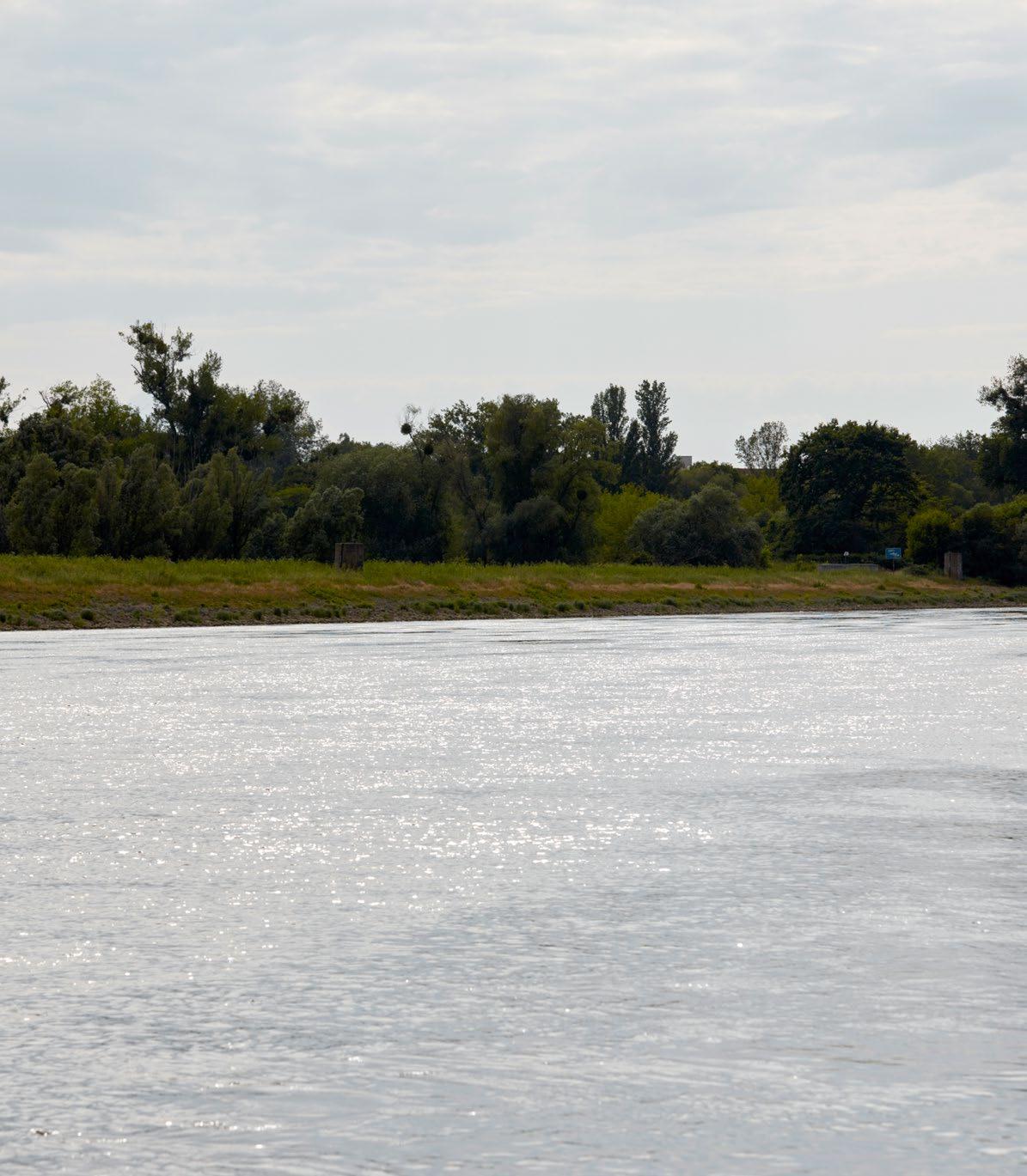

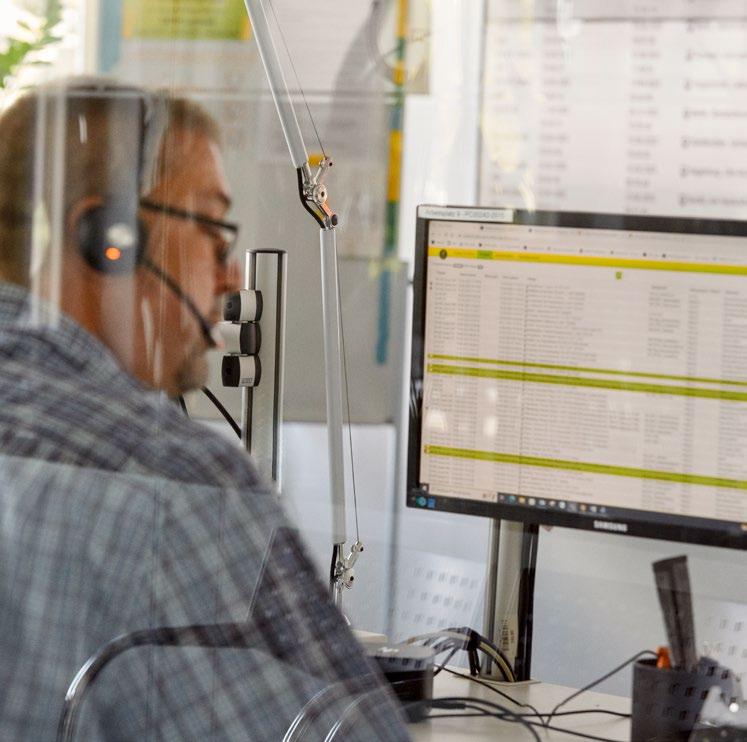

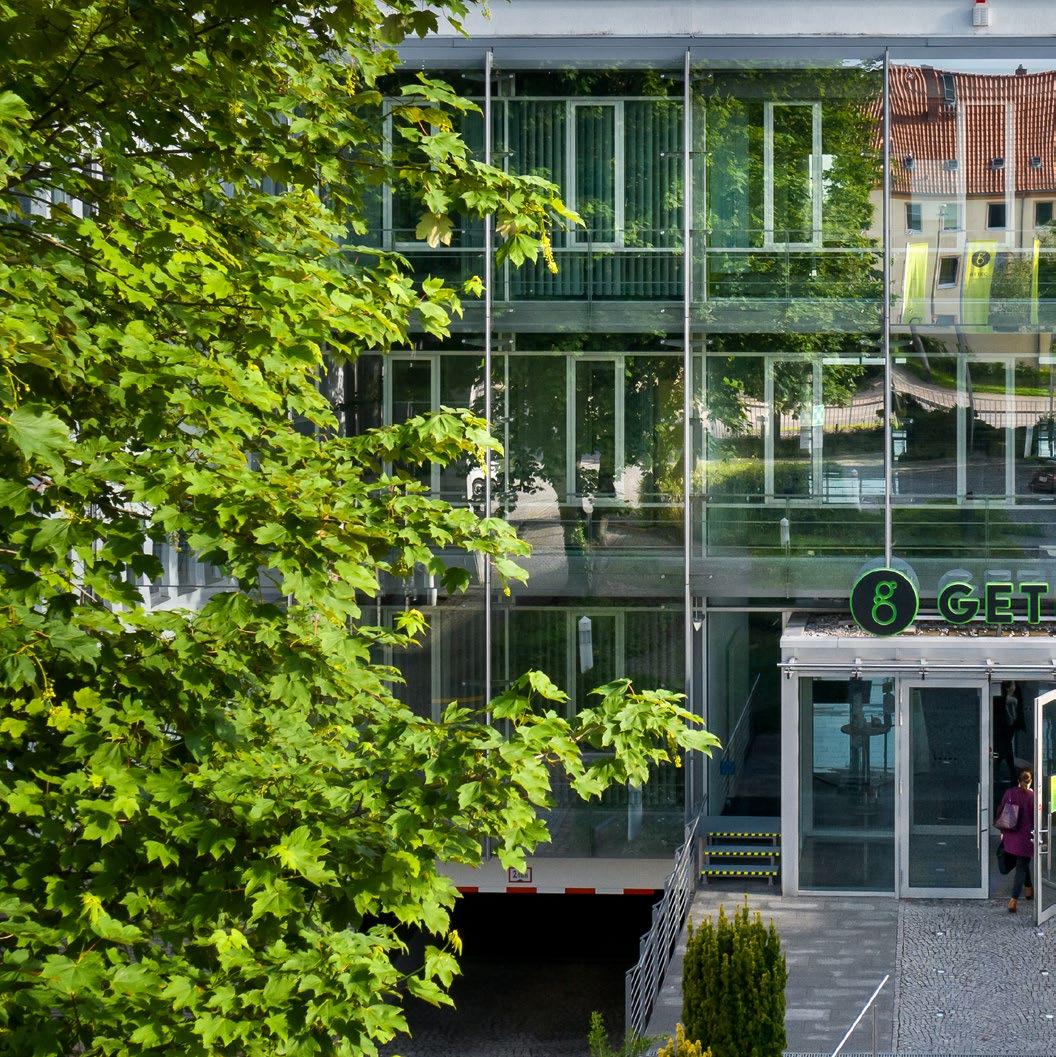


PIERRE-ALAIN GRAF, YOU BECAME CEO OF GETEC THIS YEAR AND HAVE BEEN ABLE TO VIEW THE STATUS QUO WITH A FRESH PAIR OF EYES. HOW IS OUR COMPANY PERFORMING WHEN IT COMES TO SUSTAINABILITY?
This year, we took a large step toward fulfilling our sustainability ambitions. One way this is demonstrated is that we now report in line with a number of different standards, not just one. We achieved this by improving the way we record data. We also delivered convincing results in our industrial operations. The intensity of our carbon dioxide (CO2) emissions has declined since last year, an indication that we are
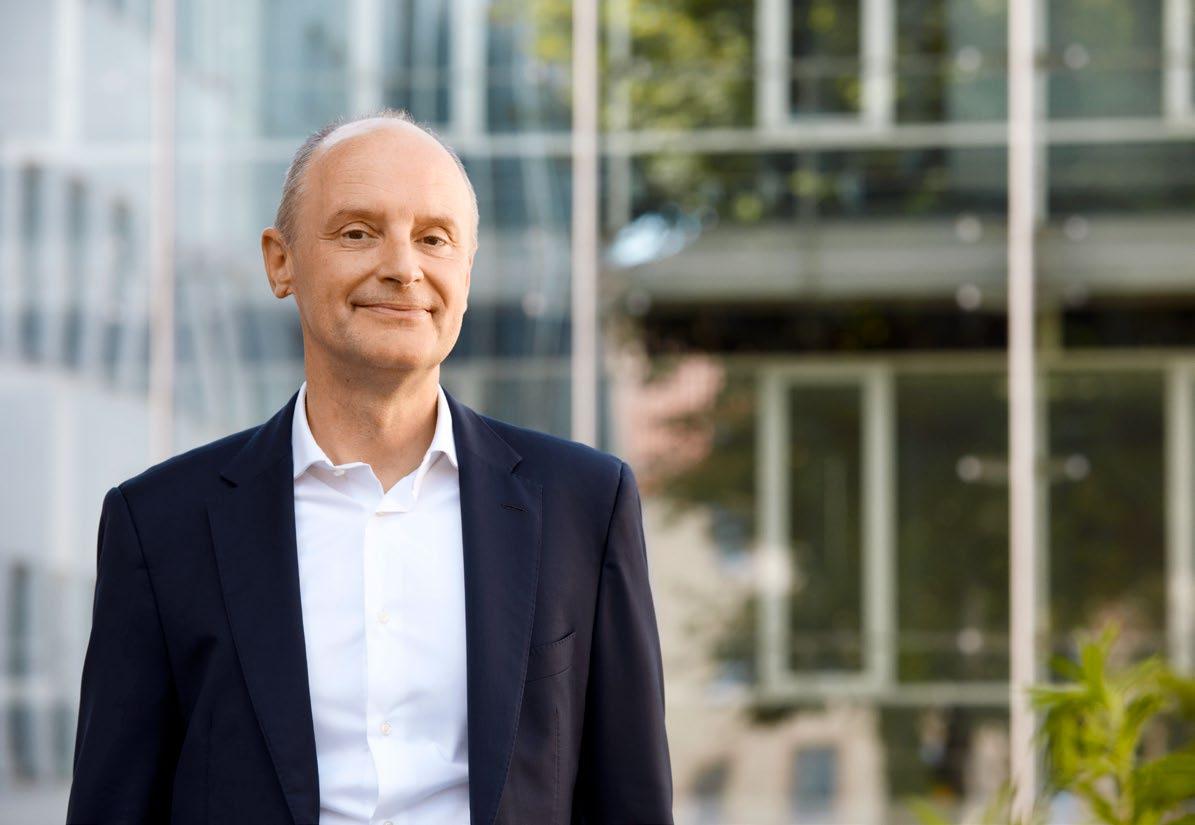
“THE GETEC WAY IS TO WORK QUICKLY AND PRAGMATICALLY TO FIND AND IMPLEMENT ONE SOLUTION AFTER THE OTHER.”
Pierre-Alain Graf became CEO of the GETEC Group on March 15, 2023. He previously held various management positions at other major companies, including more than seven years as CEO of Swissgrid. Prior to this, he was General Manager of Cisco Systems Switzerland and latterly, Senior Vice President for the Global Security Business of Hitachi ABB Powergrids.
plants. An increasingly relevant issue is how we use the waste heat from industrial processes. Here, industry needs to look toward uses in real estate and districts. That is the GETEC way: working quickly and pragmatically to find and implement one solution after the other.
As already mentioned, the first challenge is deciding which fuels to use when and where. The second is deploying more efficient and environmentally friendly technologies whenever we build new plants. This would enable us to cut CO2 emissions massively and save money. And the third challenge is learning to think in terms of ever-growing value chains. One example: We are responsible for supplying heat and steam to real estate customers. Yet wouldn’t it also make sense for us to think about the building shell as well? Surely avoiding heat consumption is just as smart as efficient energy production. We now aim to address this challenge specifically and are thinking about how to implement this approach for our customers.
consistently pursuing our role as a leading decarbonizer of society.
THE MOTTO OF THIS YEAR’S REPORT IS “IMPACT CHALLENGE.” COULD YOU PLEASE EXPLAIN WHAT YOU MEAN BY THIS?
I’ve got two perspectives. Viewed from the bird’s eye perspective, there is a green world and an industrial world that have traditionally existed alongside each other. Regulatory and social changes mean that these two worlds must now merge. All of a sudden, all stakeholders are realizing that this really isn’t that easy. I cannot simply superimpose the green world onto the industrial world – or vice versa. We therefore need time to harmonize both systems. Viewed from the close-up perspective, these challenges are currently very evident from the example of fuels. There is a need for change here. We are looking to introduce many new and more sustainable fuels, but it won’t happen overnight. It is understandable that many people are eager to go green. Equally understandable is GETEC’s clear ambition – also on behalf of our customers – to work as fast as possible to achieve the energy transition in our sphere of influence. However, we need to keep our sense of reality and have the time for implementation. We need to familiarize ourselves with the latest technologies and fuels and test them out. And that is what we are doing. For example, we are active in the field of hydrogen, where we are seeking to identify the solutions that work for our industrial
We have recently been feeling the shock effects resulting from various megatrends such as political ecology and global networking as well as from geopolitical crises. I believe we need to be prepared for further disruptive developments on the markets. Unfortunately, it is hard to predict shocks like these. For us, this means creating a more autonomous organization – something our industrial customers agree with. In this way, we will be in a better position to deal with these challenges. One of the ways I can achieve this autonomy is by deploying new and sustainable technologies. We are also preparing ourselves for more “regulatory unrest.” It isn’t always pleasant when the political agenda changes so dramatically. I’ll be perfectly honest when I say that we’ve sometimes suffered both organizationally and financially from rapid political decision-making. However, we have to accept this new reality and deal with it pragmatically. Generally speaking, what might have seemed crazy yesterday will be perfectly normal tomorrow. And I also mean that in a positive way. For example, we are hoping that we will soon see a breakthrough for hydrogen as well. We are therefore taking a positive approach to crazy things so that we can identify trends and deploy them in industrial applications. After all, what GETEC does and what has always set us apart is our flexibility for our customers.
OUR VISION AS A PIONEER OF THE ENERGY TRANSITION, WE ARE MAKING A DIFFERENCE FOR GENERATIONS TO COME.
OUR MISSION WE ARE THE PARTNER TO THE INDUSTRIAL AND REAL ESTATE SEGMENTS WHEN IT COMES TO DELIVERING EFFICIENT, SMART AND GREEN ENERGY SOLUTIONS.
STRATEGY STATEMENT
E S• We are taking responsibility in the energy transition.
• We are focusing our technological expertise on reducing greenhouse gas emissions.
• We are fostering the sustainable development of the energy industry.
• We are supporting the sustainable development of our customers in the industrial and real estate segments.
UN SUSTAINABLE DEVELOPMENT GOALS
STRATEGY STATEMENT
• We are fostering diversity, inclusion and integration.
• Employer attractiveness, employee involvement and employee satisfaction are factors in our success.
• We attach great importance to continuing professional development and equal opportunities.
• Occupational health and safety are of the utmost priority for us.
UN SUSTAINABLE DEVELOPMENT GOALS
STRATEGY STATEMENT
G• We are actively committed to development that is economically, environmentally and socially sustainable.
• We take responsibility for our actions.
• We communicate our goals and progress transparently.
• In our decision-making, we are focusing on the effects on future generations (Future Impact Check).
UN SUSTAINABLE DEVELOPMENT GOALS
OUR MEASURES
• Green hydrogen
• Waste-to-value
• Go Green parks
• Electrification
• District heating
• Smart districts
• Green heating
• Green steam
• Diversity, equality and inclusion programs
• Employee engagement
• Work-life balance
• Training initiatives
• Equal pay
• Stakeholder engagement
• Health and safety programs
• CSRD alignment
• Compliance management
• Risk management
• Transparent reporting
• Supply chain management




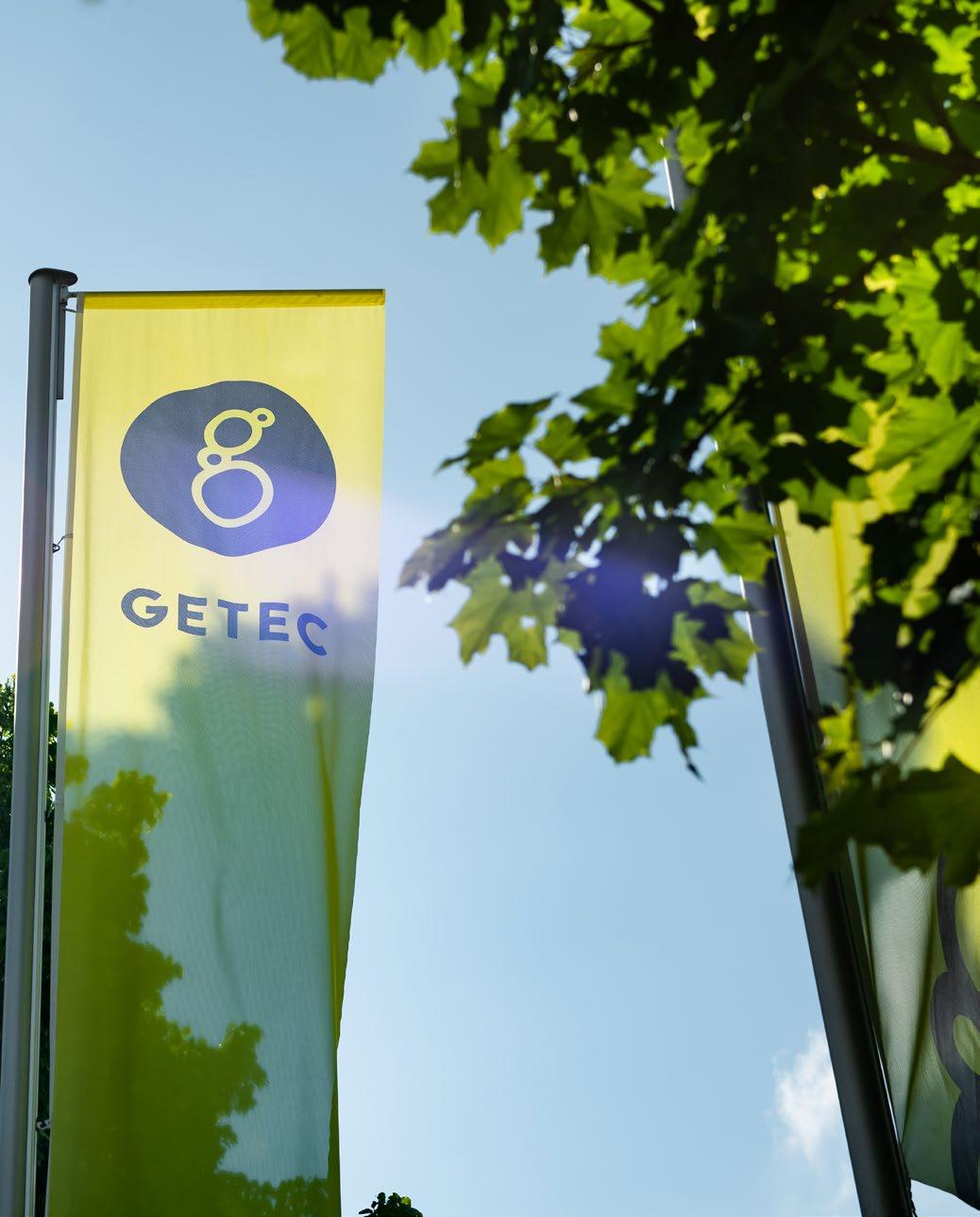

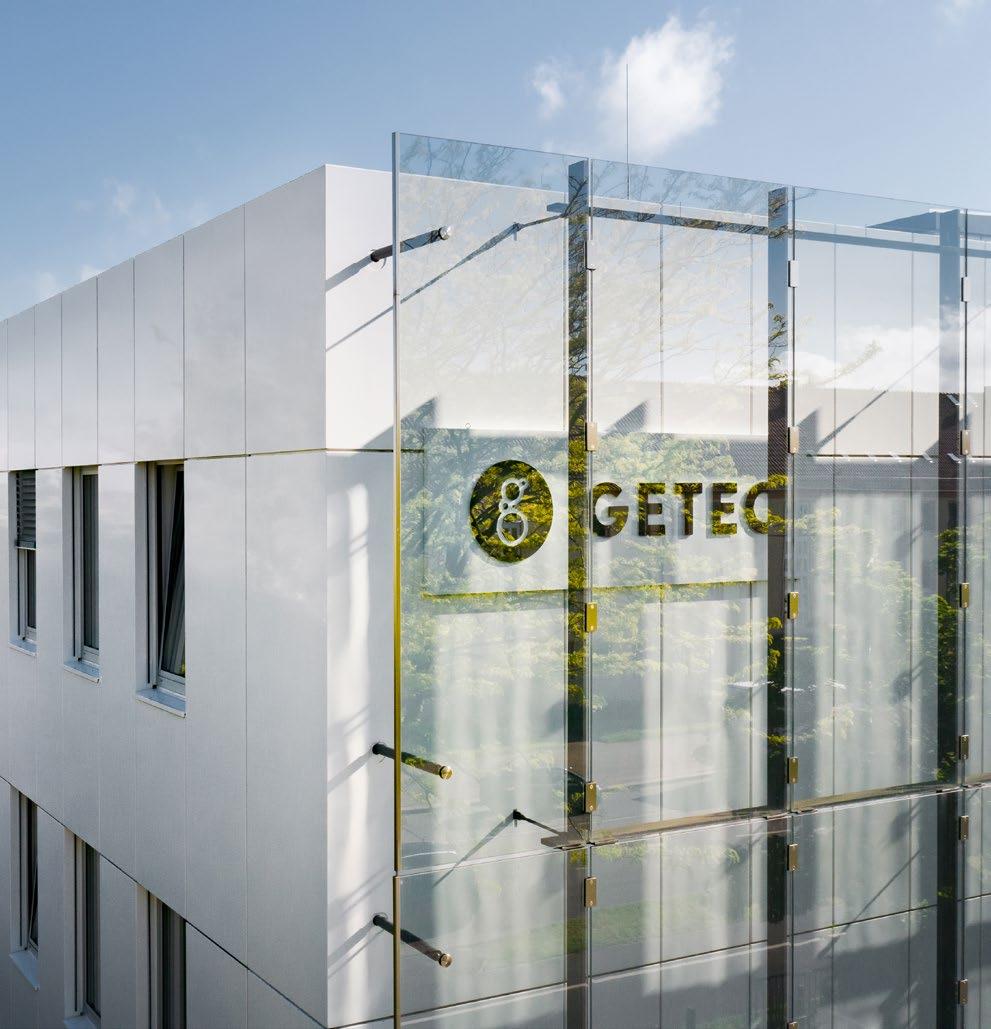
GETEC is one of Europe’s leading energy suppliers and contracting specialists in the industrial and real estate segments. Our value statement “We have the energy for more” guides our approximately 2,400 employees at more than 70 sites who apply their excellent engineering skills, outstanding regulatory knowledge, proven swiftness and extensive sustainability expertise in helping our customers to navigate the increasingly complex energy landscape.
We see ourselves as THE partner when it comes to delivering smart, efficient and green energy solutions. Sustainability, cost-effectiveness and the careful use of resources have been anchored in our DNA from the very start and are permanent components of our ESG strategy. In this way, we support our customers in improving their carbon footprint and have our sights fixed firmly on the future, thus making a difference for generations to come.

100% INFRASTRUCTURE INVESTMENTS FUND (IIF)
Since 4/2022
Advised by J.P. Morgan Asset Management Segments







Head office: Magdeburg, Germany Regional platforms

>12,000
TERM OF SALES FROM LONG-TERM CONTRACTS1
>1
~2,400 EMPLOYEES
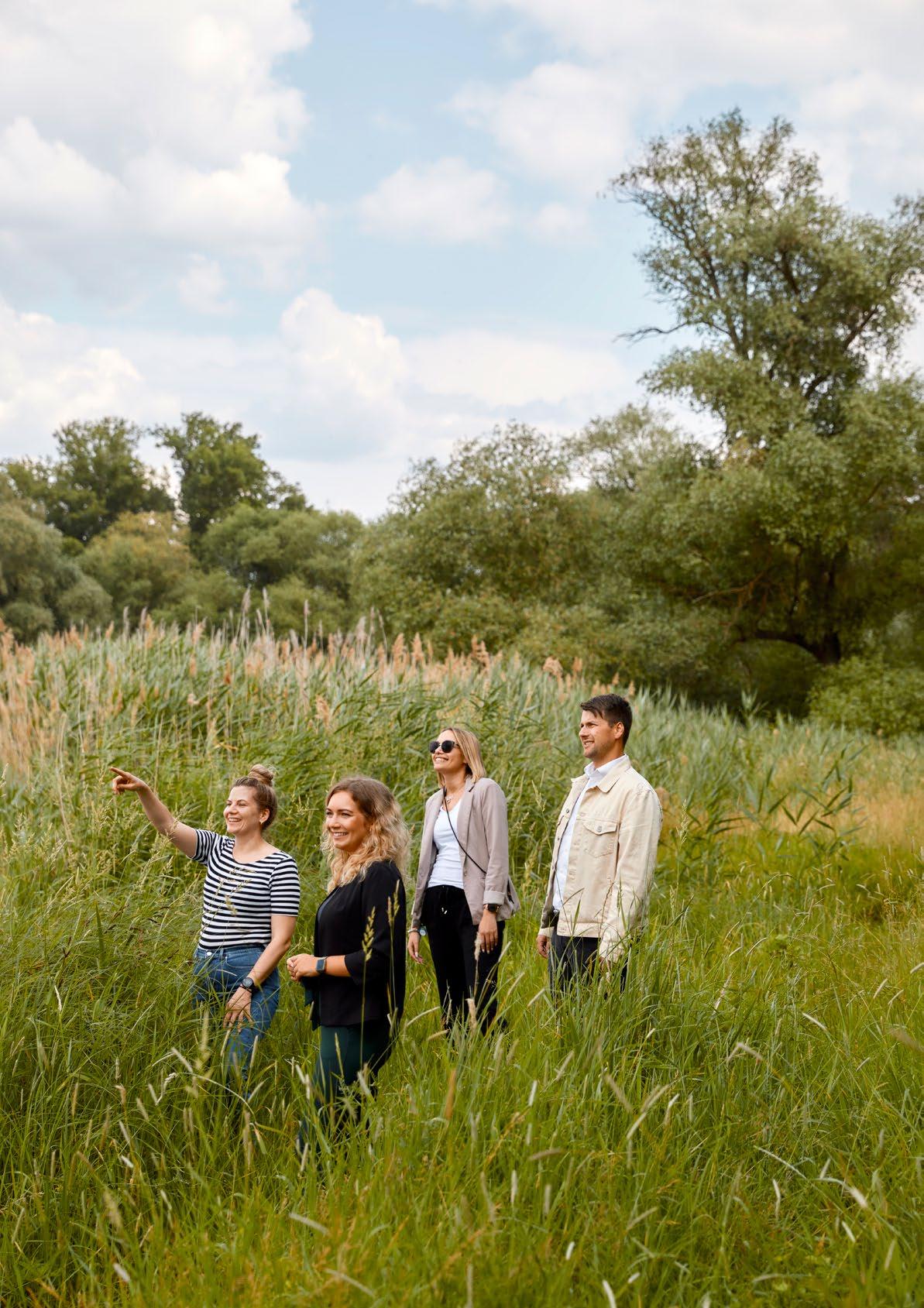
OF
ARE ENGINEERS3
GENERATED OUTSIDE GERMANY
We offer our customers in the industrial and real estate segments a comprehensive package of outsourced energy solutions. Across the value chain, we implement energy supply and energy reduction contracts that deliver precisely the cost-effectiveness and sustainability our customers need.
Integrated energy controlling and billing
Transparent energy procurement and management, fuel and CO2 management
HOW WE BUILD OUR LONG-TERM CUSTOMER RELATIONSHIPS IN THE ENERGY SECTOR
Developing ideas and planning sustainable concepts with optimal use of local energy market regulations
Data-driven maintenance, remote interventions, AI-based optimized service via our 24/7 Smart Control Center
Operations management based on digitalized processes and systems
Financing of investments for contract term
Approval processes, applications for subsidies and subsequent emissions reporting
Implementation, design and plant construction with full Internet of Things functionality
Demographic change, affordable housing, climate-neutral supply concepts, e-mobility and digitalization are just some of the challenges currently faced by the real estate and building sectors. Whether for the private residential market, commercial, cooperatives, developers or public housing – we develop, finance and implement full-service green solutions for real estate, for example, in smart districts or in the joint venture model. We are the single-source provider of heating, cooling, electricity, site networks, CO2 monitoring, e-mobility and the smart networking of all elements tailored to customers’ needs. With us as their outsourcing partner, customers can lower their energy costs, substantially reduce their carbon footprint and enjoy maximum supply reliability, enabling them to concentrate on their own core business.

Whether our customers are active in the chemical and pharmaceutical industry, food or paper production, the materials or automotive industries: GETEC delivers exactly the sustainable, smart and efficient solutions they need. We support our industry customers as they work toward achieving net zero production, at the same time ensuring cost-effectiveness and reliability of supply. In developing our solutions, we consider the entire value chain – whether we are working with one customer at a single-client site or with many industrial customers at multiclient sites like the GETEC parks in Muttenz, Switzerland, and Emmen, Netherlands.
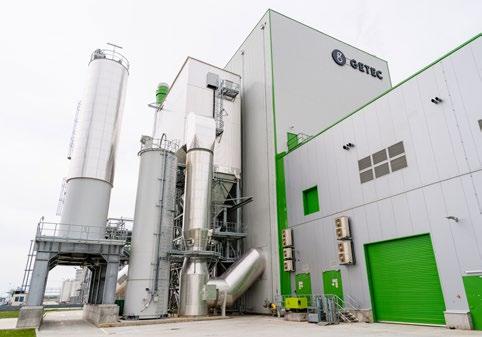
Golf Investment Holding GmbH
Golf TopCo GmbH
100% Golf Investment Holding GmbH
Golf BidCo GmbH
100% Golf MidCo GmbH
GETEC heat & power GmbH
Magdeburg, Germany 100% G+E GETEC Holding GmbH
GETEC Polska sp. z o. o. Turek, Poland
100% GETEC heat & power GmbH
GETEC Energia sp. z o. o. Turek, Poland
100% GETEC heat & power GmbH
GETEC Zielona Energia sp. z o. o. Turek, Poland
100% GETEC heat & power GmbH
GETEC Projekty Przemyslowe sp. z o. o. Turek, Poland
100% GETEC heat & power GmbH
ENERSERV GETEC GmbH
Vienna, Austria
100% GETEC heat & power GmbH
GETEC SERVICII ENERGETICE S.R.L.
Bucharest, Romania
95% GETEC heat & power GmbH
5% Lehniner Fernwärme u. Betriebs GmbH
GETEC Switzerland AG
Muttenz, Switzerland
100% GETEC heat & power GmbH
GETEC Younergy AG
Zug, Switzerland
51% GETEC Switzerland AG
GETEC PARK.SWISS AG
Muttenz, Switzerland
100% GETEC heat & power GmbH
ARA Rhein AG
Pratteln, Switzerland
48.11% GETEC PARK.SWISS AG
Industriefeuerwehr
Regio Basel AG (IFRB)
Muttenz, Switzerland
25% GETEC PARK.SWISS AG
GETEC Energy Efficiency B.V.
Emmen, Netherlands
51% GETEC Infra NL B.V.
Emmtec Services B.V.
Emmen, Netherlands
100% GETEC Infra NL B.V.
Bioenergie Wächtersbach GmbH
Wächtersbach, Germany
64.9% GETEC heat & power GmbH
Carbotechnik Energiesysteme GmbH
Geretsried, Germany
75.49% GETEC heat & power GmbH
Borchers Biomassekraftwerk GmbH Borken, Germany
50% GETEC heat & power GmbH
Magdeburger Bau- und Schulservice GmbH
Magdeburg, Germany
40% GETEC heat & power GmbH
GETEC BBE GmbH
Magdeburg, Germany
100% GETEC heat & power GmbH
LEHNINER Fernwärme und Betriebs GmbH
Kloster Lehnin, Germany
100% GETEC heat & power GmbH
KG Energo s.r.o. i.L.
Prague, Czech Republic
50% GETEC heat & power GmbH
Albert-Vater-Straße 50 Verwaltungs GmbH
Magdeburg, Germany
100% GETEC heat & power GmbH
Albert-Vater-Straße
Verwaltungs GmbH & Co. KG
Magdeburg, Germany
General partner: Albert-Vater-Straße
50 Verwaltungs GmbH
Limited partner: GETEC heat & power GmbH
Golf HoldCo GmbH
100% Golf TopCo GmbH
Golf MidCo GmbH
100% Golf HoldCo GmbH
G+E GETEC Holding GmbH
Magdeburg, Germany 100% Golf BidCo GmbH
GETEC Wärme & Effizienz GmbH
Magdeburg, Germany
100% G+E GETEC Holding GmbH
Bayernwärme GmbH
Magdeburg, Germany
100% GETEC Wärme & Effizienz GmbH
Energie für Schleswig-Holstein GmbH
Kiel, Germany
50% GETEC Wärme & Effizienz GmbH
GETEC efficiency solutions GmbH & Co. KG, Berlin
General partner: GETEC efficiency solutions Verwaltungs GmbH
Limited partners:
51% GETEC Wärme & Effizienz GmbH
49% CEKA Holding GmbH
GETEC efficiency solutions
Verwaltungs-GmbH Berlin, Germany
100% GETEC efficiency solutions GmbH & Co. KG*
GDB Infra GmbH
Magdeburg, Germany
51% GETEC Wärme & Effizienz GmbH
PionierWerk Hanau GmbH
Hanau, Germany
50.1% GETEC Wärme & Effizienz GmbH
G+P energy solutions
Verwaltungs-GmbH
Berlin, Germany
100% GETEC Wärme & Effizienz GmbH
G+P energy solutions GmbH & Co. KG
Berlin, Germany
General partner: G+P energy solutions Verwaltungs-GmbH
Limited partners:
51% GETEC Wärme & Effizienz GmbH
49% g+p energy solutions Beteiligungs GmbH
QETEC Energieeffizienz GmbH
Berlin, Germany
51% GETEC Wärme & Effizienz GmbH
Re+Start GmbH
Magdeburg, Germany
51% GETEC Wärme & Effizienz GmbH
G&H Energy GmbH
Magdeburg, Germany
51% GETEC Wärme & Effizienz GmbH
G+D Gesellschaft für Energiemanagement mbH
Magdeburg, Germany
51% GETEC Wärme & Effizienz GmbH
Stadtwerke Thale GmbH
Thale, Germany
100% G+D Gesellschaft für Energiemanagement mbH
G+Q Effizienz GmbH
Berlin, Germany
51% GETEC Wärme & Effizienz GmbH
G+G Energy Services GmbH
Berlin, Germany
49% GETEC Wärme & Effizienz GmbH
BETEC Energieeffizienz GmbH
Berlin, Germany
51% GETEC Wärme & Effizienz GmbH
GETEC Wärme & Effizienz GmbH
Nord
Hamburg, Germany
100% GETEC Wärme & Effizienz GmbH
GETEC energy efficiency GmbH
Magdeburg, Germany
100% GETEC Wärme & Effizienz GmbH
G+L Energieeffizienz GmbH
Magdeburg, Germany
51% GETEC Wärme & Effizienz GmbH
G+A Energy Efficiency GmbH
Magdeburg, Germany
51% GETEC Wärme & Effizienz GmbH
GETEC Green Heating GmbH
Magdeburg, Germany
74.9% GETEC Wärme & Effizienz GmbH
GETEC smart energy GmbH
Magdeburg, Germany
50.1% GETEC Wärme & Effizienz GmbH
GETEC Infra NL B.V.
Emmen, Netherlands
100% GETEC heat & power GmbH
GPE logistiek B.V.
Emmen, Netherlands
100% GETEC Infra NL B.V.
Enven Green Energy B.V.
Emmen, Netherlands
51% GETEC Infra NL B.V.
Emmtec Green Steam B.V.
Emmen, Netherlands
51% GETEC Infra NL B.V.
EQ Energiequartier an der Königsbach GmbH
Koblenz, Germany
95% GETEC Wärme & Effizienz GmbH
GETEC Energy Horizon GmbH
Magdeburg, Germany
51% GETEC Wärme & Effizienz GmbH
G+N Energieeffizienz GmbH
Magdeburg, Germany
51% GETEC Wärme & Effizienz GmbH
G+M energy efficiency GmbH
Magdeburg, Germany
74.9% GETEC Wärme & Effizienz GmbH
GRI 2-1 ORGANIZATIONAL DETAILS
GRI 2-2 ENTITIES INCLUDED IN THE ORGANIZATION’S SUSTAINABILITY REPORTING
Legal structure on reporting date of June 1, 2023
GRI 2-6 ACTIVITIES, VALUE CHAIN AND OTHER BUSINESS RELATIONSHIPS
GETEC Contracting GmbH
Osnabrück, Germany
100% G+E GETEC Holding GmbH
GETEC green solution GmbH
Berlin, Germany
50.1% GETEC Wärme & Effizienz GmbH
GETEC energy solutions GmbH i. G.
Magdeburg, Germany
51% GETEC Wärme & Effizienz GmbH
GET New Energy GmbH
Kempfen, Germany
51% GETEC Wärme & Effizienz GmbH
CERO2 GmbH
Großbottwar, Germany
51% GETEC Wärme & Effizienz GmbH
INBRIGHT Energy GmbH
Berlin, Germany
51% GETEC Wärme & Effizienz GmbH
GETEC Energy Management GmbH
Magdeburg, Germany
100% G+E GETEC Holding GmbH
GETEC Mieterstrom GmbH
Magdeburg, Germany
51% GETEC Wärme & Effizienz GmbH
Löwitz Energie GmbH
Magdeburg, Germany
100% GETEC Wärme & Effizienz GmbH
OptimusGreen GmbH i.G.
Magdeburg, Germany
51% GETEC Wärme & Effizienz GmbH
Alfons & alfreda Energy GmbH i.G.
Magdeburg, Germany
51% GETEC Wärme & Effizienz GmbH
QSS Energie GmbH
Schrobenhausen, Germany
51% GETEC Wärme & Effizienz GmbH
GETEC Kundenservice GmbH
Magdeburg, Germany
100% G+E GETEC Holding GmbH
TREVISO GS4 Società Consortile a Responsabilitià Limitata
Zola Predosa (Bologna), Italy
19% GETEC Italia S.p.A.
Laboratorio Energia e Ambiente
Piacenza (LEAP) S.C. a r.l. Piacenza, Italy
10.60% GETEC Italia S.p.A.
ATMOS S.r.l.
Gragnano Trebbiense (Piacenza), Italy
99% GETEC Italia S.p.A.
MESOS S.C. a r.l.
Gragnano Trebbiense (Piacenza), Italy
70% GETEC Italia S.p.A.
Consorzio Servizi Infrastutture
Piacenza i.L. Piacenza, Italy
7.143% GETEC Italia S.p.A.
GETEC Italia S.p.A. Gragnano Trebbiense (Piacenza), Italy
100% G+E GETEC Holding GmbH
Energy Wave S.p.A.
Alessandria, fraz. Spinetta Marengo, Italy
100% GETEC Italia S.p.A.
1.Total number of operations
Number of sites: 71
Number of companies: 75
2.Net sales
€1.504 billion in 2022
GETEC is an international company. For this reason, activities are spread across a range of geographical locations that we have named “regional platforms,” which are responsible for the countries in which they are located and for some neighboring countries. In the following General Disclosures, we focus on general results and KPIs – other than for employees
Total number of employees
~2,400
Employment contracts (temporary/permanent):
Almost all our employment contracts are permanent.
Employment type:
Most of the company’s activities are performed by workers who are employees. There is no significant amount of seasonal work.
3. Total capitalization broken down in terms of debt and equity ~€2.482 billion balance sheet total ~€1.941 billion debt ~€540 million equity
and workers who are not employees. We then break down the ESG KPIs by platform because each of these has its own business and culture resulting in different measures and results. We will start with the general KPIs for our company.
Employees by gender (GETEC Group):
GETEC has a presence in nine European countries and has an international workforce. We employ people from the following countries:
Austria
Belarus
Bosnia and Herzegovina
Bulgaria
Colombia
Croatia
Denmark and Faroe Islands
France
Germany
India, including Sikkim and Goa
Iran
Italy
Lebanon
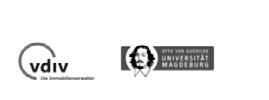

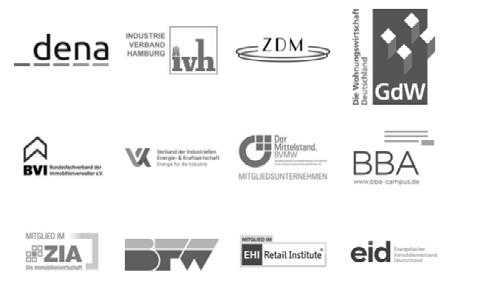

GETEC is active in many associations, increasingly assuming its responsibility as an expert and a pioneer of the energy transition in the political and regulatory environment. Through our work in associations, we consider ourselves a trendsetter when it comes to innovative solutions and business models aimed at advancing decarbonization. There follows a list of our activities and memberships. See the appendix on page 96 for a complete list.
Netherlands
Poland
Portugal
Romania
Russian Federation
Serbia
Spain
Switzerland
Syria
Tunisia
Turkey
Ukraine
Vietnam
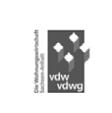
We explain our ESG strategy in detail in the ESG Report 2022, pages 24/25 We also discuss the many opportunities and risks that the energy transition entails for our business model.
We refer to the policies, agreements and instructions that are applicable to our material topics and described in the respective chapters. Moreover, our company’s responsible conduct is measured by our contribution to the
The list of our stakeholder groups, the way they are identified and our approach to stakeholder engagement are described in the ESG Report 2022,
During the course of 2023, we will be performing a new materiality analysis in accordance with GRI 3-1. This will identify the actual and potential negative and positive impacts of our activities and business relationships on the economy, the environment and society – including their impact on
Sustainable Development Goals (SDGs) of the United Nations, which is described in the ESG Report 2022, page 27
pages 28/29
human rights. The process applied to date remains valid for this present report. We therefore refer to the ESG Report 2022, pages 30/31, which also lists our material topics.
The reporting period is the 2022 calendar year. We report annually on sustainability topics. This report was published on September 15, 2023.
Contacts for questions regarding the report:
Christian Faßelt
Head of Marketing, Communication & ESG Group
Liza Steudle
Head of ESG Group
Benjamin Hilpert
ESG Manager Group
G+E GETEC Holding GmbH
Albert-Vater-Straße 50 39108 Magdeburg Germany
esg@GETEC.de
Compared with the prior-year report, we are additionally reporting on the topic of water.
External assurance of this report is not planned.
None of the German platform employees are covered by a collective bargaining agreement. In Switzerland, 35.5% of employees are covered by a collective employment agreement (Gesamtarbeitsvertrag, GAV), while 89% of the Netherlands platform employees are covered by collective bargain-
ing agreements (Collectieve Arbeidsovereenkomst, CAO). All our employees in Italy are covered by the national collective working agreement (contratto collettivo nazionale di lavoro, CCNL).


“Sustainability as the key to success” is the motto that drives us. We have a clear vision when it comes to sustainability in the energy industry and for our customers in the industrial and real estate segments. Companies need to reinvent and reposition themselves. Not only is the communication of sustainability evolving year after year – moving from separate reporting of environmental and social matters to an integrated management report – it is inevitable that the content must evolve as well.
It is a positive sign that our ESG department has grown in size and professionalism.
This development is based on regulatory requirements for greater process depth, transparent and verifiable communication and reporting, and in-depth exploration of the company’s material sustainability topics. The department
supports us in our ambition to sharpen the focus on our sustainability measures and manage them using measurable indicators. We aim to be faster, to invest in both internal improvements and external opportunities, and to pursue a clearer strategy in the future. In response to this challenge, we have reorganized our ESG team this year. It now unites more specialist knowledge, people power and communication expertise – key factors for future reporting and strategic measures.
However, even with a clear commitment from the Group Executive Committee, one department in a company of 2,400 employees would have little impact if its members were not motivated and just as passionate about sustainability as we are. That is why our second focus has been to continue expanding our internal sustainability and reporting network worldwide. One thing that helped here was the fact that sustainability has long been an integral part of the GETEC business model, therefore we have met with a lot of understanding. The articles in this report will provide you with an insight into the way our experts think.
For example, the Procurement team answers questions about complying with Germany’s Act on Corporate Due Diligence Obligations in Supply Chains (Lieferkettensorgfaltspflichtsgesetz, LkSG) – what a mouthful – while the platforms’ engineers talk about their decarbonization projects and Human Resources outlines its philosophy for the advancement of women.
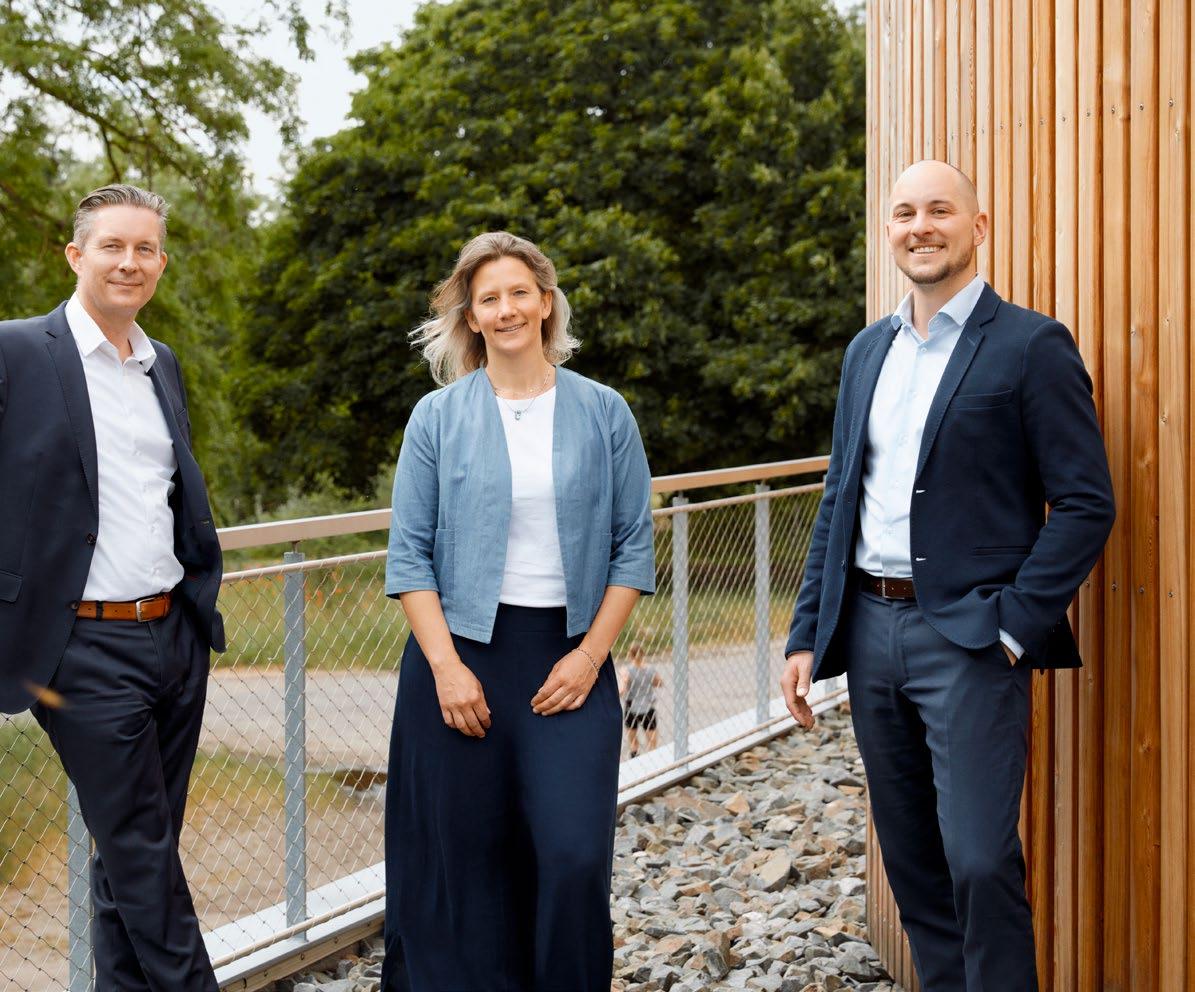
The third focus, which is also one of the most important, is to explore valid KPIs and establish functioning reporting processes in line with the Corporate Sustainability Reporting Directive (CSRD). This regulatory framework is complex. It asks the right questions and GETEC now has to find the right answers. In a fast-growing international company, this is a challenge – but also an enormous opportunity to build and modify processes and structures so that they serve our goal of achieving success through sustainability. The will to operate more sustainably is our common ground and motivation.
We address the concrete questions on a daily basis and this report shows how far we have already come in finding
the answers. In the years ahead, you will be able to follow our further progress. One of the things that characterizes our company is our willingness to take on challenges. Our mission is to support our customers on their path to net zero and good sustainability management – for us and our customers – will be crucial. We aim to be at the forefront of this cutting-edge field as well.



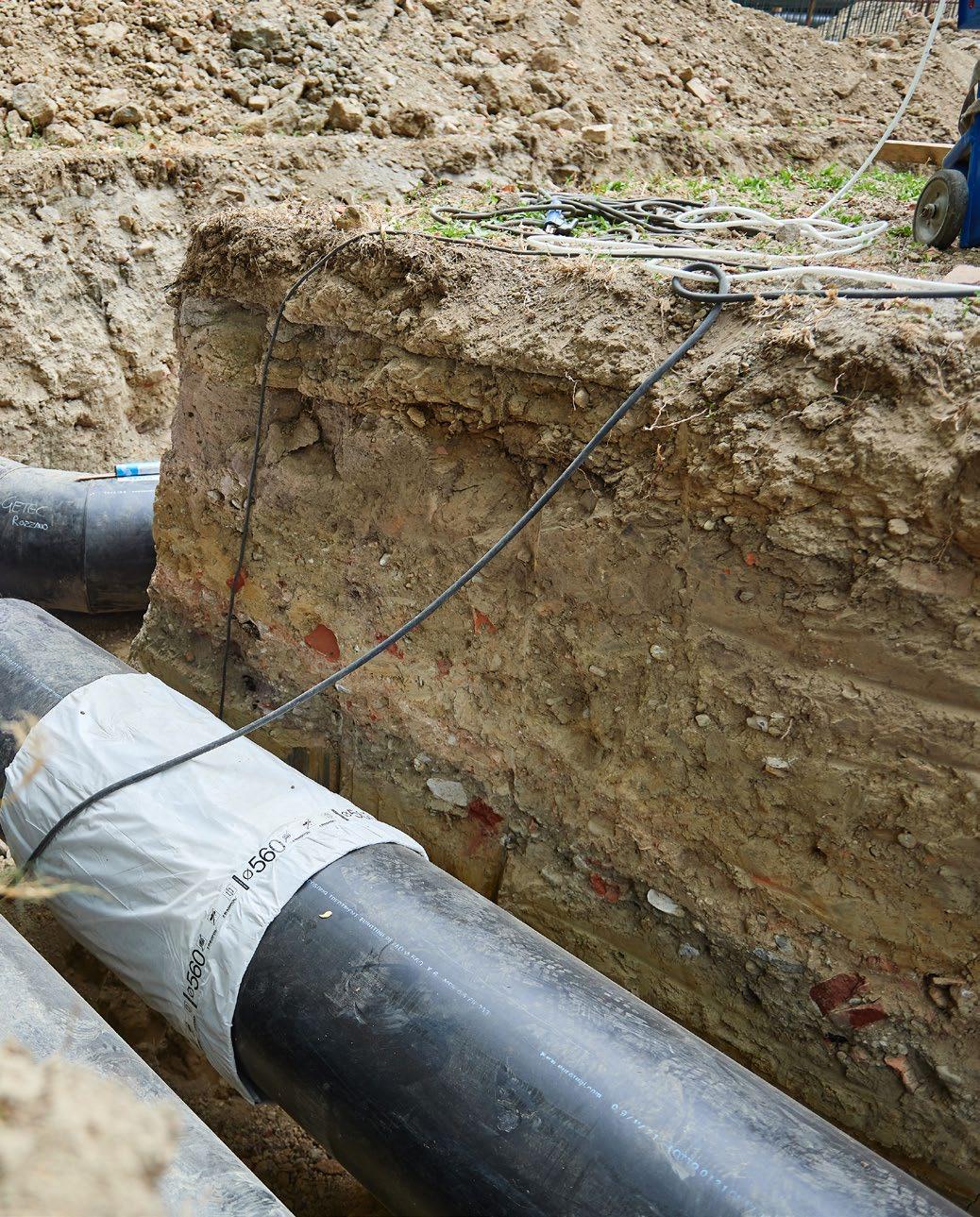

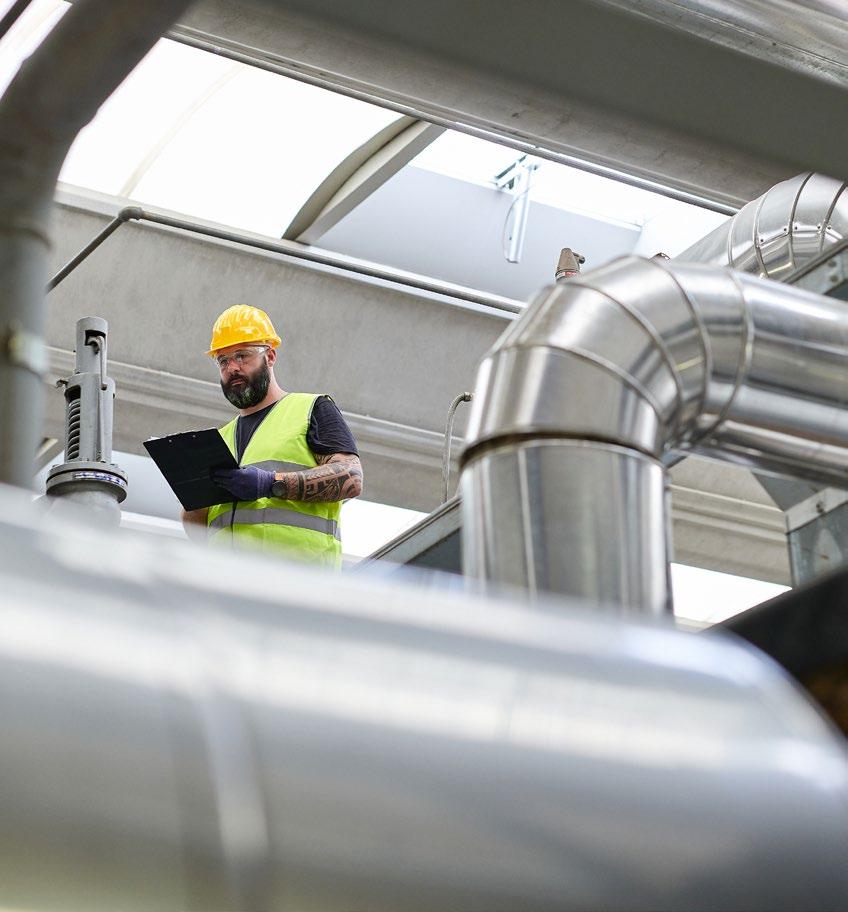
In 2022, conflict in Europe caused great uncertainty on the energy market, resulting in the threat of gas shortages and massively impacting the prices of all commodities. Despite the difficult year, GETEC was able to pursue its course of reducing GHG emissions for its customers. Efficiency solutions, fuel switching and increased electrification made it possible to achieve a further improvement in respect of the KPI for CO2 intensity, from 203.6 g CO2 per kWh of energy output to 191.2 g. The target is just 89 grams in 2030.
We are systematically reducing our CO2 emissions, even if this sometimes does not appear to be the case at first glance. We are constantly acquiring plants which we optimize to make them more efficient. We are also building new multifuel-ready plants that comply with the highest technical standards. In this way, we and our customers will be able to achieve net zero by 2045. How much CO2 would have been emitted if we did not operate the plants? Answer: a great deal more.
COMPARED
Use of renewables
H2- and multifuelready concepts
Networked power-toheat systems
Integrated energy efficiency
Waste-to-energy Circular Economy

RATIO OF TOTAL EMISSIONS (SCOPE 1 & 2 IN gCO2) TO ENERGY GENERATED (HEAT AND ELECTRICITY IN kWh)
OF NON-COAL ENERGY PRODUCTION (CAPACITY) – % MWth
THERE IS NO ONE SINGLE SOLUTION FOR REDUCING CARBON EMISSIONS. THE ENERGY INDUSTRY NEEDS TO FOLLOW MANY ROUTES IN ORDER TO ACHIEVE ITS SUSTAINABILITY GOALS. WE GIVE EXAMPLES OF WHAT GETEC IS DOING TO ADDRESS THIS CHALLENGE.

As a rule, some of the heat generated in combined heat and power (CHP) plants is lost to the atmosphere as waste heat. This not only represents a loss of energy but also impacts the environment unnecessarily.
In order to solve this problem, we are using waste heat recovered from CHP plants alongside other heat sources in modernizing the district heating system in Rozzano, Italy. The timing is ideal. This socially disadvantaged district close to Milan is currently being refurbished and equipped with innovative technologies. Aspects of the project are the optimized use of the CHP plant, use of the surplus electricity output and use (recovery) of the process heat from other production plants in the area.
The pipelines of the district heating system have been extended to these plants to transport their waste heat to the system via local heat exchangers and water pumping stations rather than releasing it to the atmosphere.
This makes it possible to utilize the output of the CHP plants – 1,200 kWe of electricity, 613 kWt of steam and 630 kWt of hot water. The CO2 reduction achieved in the first step will be increased to approx. 905 tCO2 per year in the future when the Rozzano district is connected and supplied with surplus heat. As a result of these reductions, heating can be supplied at lower cost to the socially disadvantaged residents of Rozzano.


From year to year, the residents of the Ringstrasse district in Raunheim, Germany, had become increasingly dissatisfied. The reason for this was that the district, built in the 1960s, was outdated in terms of both technology and appearance. That is why, in 2001, the district was included in the State of Hesse’s Social City (Soziale Stadt) program. A district manager was appointed to improve the quality of life for residents. One of the measures implemented by the new district management team was an improved energy supply to deliver an efficient, sustainable and affordable energy mix. GETEC developed a modern concept for the some 1,500 residential units with a heat requirement of up to 24,000 MWh – and was awarded the contract. The micro combined heat and power plants and power-to-heat module began operation in February 2022. With the start-up of the heat pump in 2023, the entire iCHP plant came on stream fully. The idea underlying the innovative combined heat and power concept was to equip the existing district heating network – two gas boilers (5.8 MW) and one pellet boiler (4 KW) – with a more sustainable heat generation technology (see graphic at right). In this way, more renewable energy can be used in generating heat and, at the same time, electricity. This was achieved by installing two electric micro combined heat and power plants (2.3 MW each), which convert gas into heat AND electricity. The waste heat is used to heat the district, while the electricity is routed to the grid and sold. The second module is an air-to-water heat pump (1.9 MW), which requires electricity but uses this very efficiently thanks to the clever way it works. In the best-
case scenario, it produces three to four kilowatts of heat for every kilowatt of electricity used. On warm summer days, the heat can be stored for use in the evening when residents need warm water. The heat pump has a positive impact on the carbon footprint because it is so environmentally friendly. The third component of the system is the power-to-heat module (1.6 MW), which functions in much the same way as an electric-powered instantaneous water heater. In the best case, any surplus electricity in the grid can be used by the module to generate a large amount of heat on an ad hoc basis. However, it is not particularly efficient, generating one kilowatt of heat for each kilowatt of electricity used. Nevertheless, regulations require the installation of this module because it can be used at any time in almost any conditions. Two buffer storage units (80 m3 and 250 m3) complete the concept. The old pellet boiler is now no longer needed and has been removed. The various modules have their advantages and disadvantages. Which one is chosen depends on the current market price of the energy needed/purchased and climate conditions. That is why the plants are not operated simultaneously but alternately as required. They are controlled via a schedule that queries the prices on the respective energy exchanges at short intervals. The least expensive energy source at the time of the query is then selected. This process is largely automated and has been tried-and-tested in many cases. As a result, the plant is sustainable both ecologically and economically. In respect of the 1,500 residents of the Ringstrasse district, it is important to GETEC – and the customer – to always achieve the right balance between clean and affordable energy. This is the way to achieve the energy transformation in the medium term. As far as the residents are concerned, two things are important: affordable prices and clean energy.
One of the biggest challenges was the fact that we weren’t building the heat and power plant on a greenfield site but modifying an existing system. Added to this was the need to integrate different forms of heat generation with their particular requirements.
WHAT ASPECT OF THIS PROJECT ARE YOU ESPECIALLY PROUD OF?
With this innovative plant, we have set new standards for the efficient use of heat and electricity.
We have had very positive feedback from the residents in the immediate vicinity of the heating plant. They very patiently put up with the inconvenience during construction. The other residents barely noticed the work because there was no interruption to the supply of heat.
“WE HAD VERY POSITIVE FEEDBACK FROM RESIDENTS”Tim Aschmann, Head of Special Projects, was responsible for planning the project and providing support until handover.
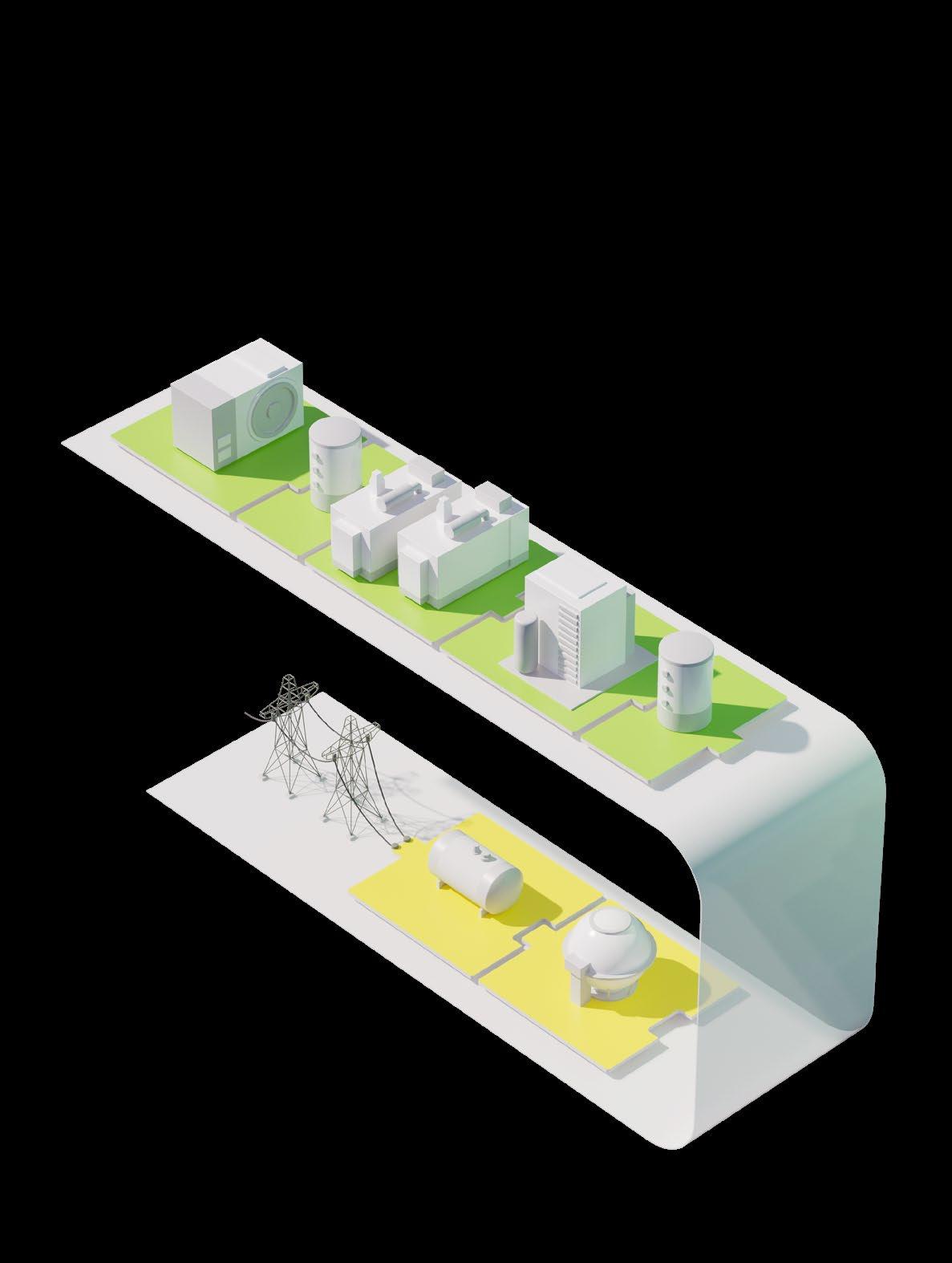
ICHP (INNOVATIVE COMBINED HEAT AND POWER PLANT)
Air-to-water heat pump
Extracts and then compresses the heat from the ambient air
Separate buffer storage
Stores the heat from the heat pump if necessary
Micro combined heat and power plants 1 + 2 Generate heat and electricity using gas
General control
A Smart Control Center controls the power plant via individual hardware and software components. As a rule, this is done automatically, optimizing the costs and sustainability of the energy mix continuously and in real time. Energy prices are queried every 15 minutes in order to choose the least expensive form of generation or product.
Grid connection Electricity is fed into the grid
OLD SYSTEM
Gas boiler 1
Conventional gasfired heat generation
Gas boiler 2
Conventional gasfired heat generation
Power-to-heat module Converts electricity into heat
Buffer storage
Stores heat from the micro CHP and power-to-heat modules

Everyone knows that sawing wood produces wood chips, but not everyone knows that these can be used to generate electricity and heat. In the Netherlands, BeGreen Refinery B.V. and GETEC’s Platform Netherlands are among those that do. The two companies have started an innovative collaboration aimed at providing customers with market-ready biodust applications to generate heat. The joint project is not only interesting from a technological perspective but, in light of rising prices and declining reliability in the supply of fossil fuels such as gas, the innovative biocoal technology represents a sustainable component of the future fuel mix.
Burning dust is not a new technology but most of the dust used at present derives from fossil fuels. However, further development of the technology means that GETEC’s boilers are now also able to burn biocoal dust produced from forestry waste and other biomass fuels.
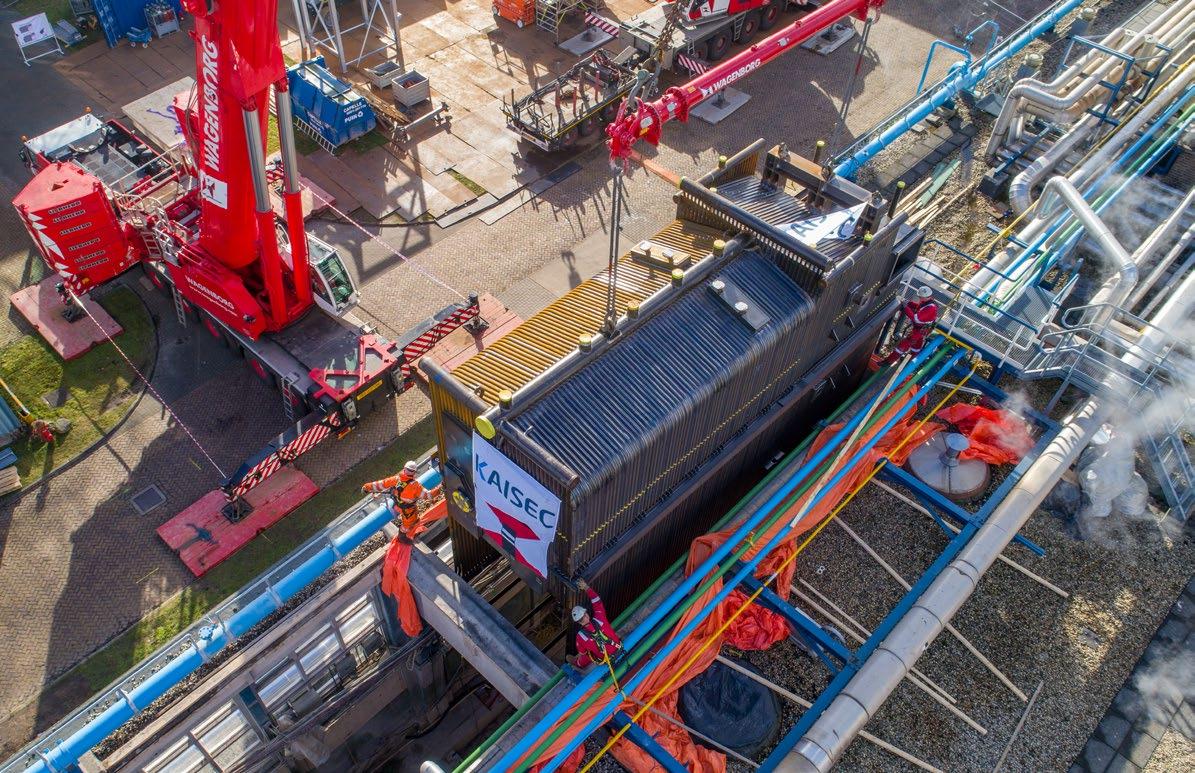
The principle is simple. Local forestry companies supply their waste. The wood chips are treated in a steam explosion process to break down the fiber structure of the wood and remove some of the volatile components, thus increasing the carbon content. The resulting wood-based biomass is then pressed into black pellets. Compared with untreated biomass, these pellets have similar characteristics to coal – a higher energy density, grindability and
better transport and storage properties. The production process also yields biochemicals such as furfural, methanol and acetic acid, which raises the biomass value chain to an even higher level.
The pellets are then ground and burned in the biomass boiler that came on stream in 2023, thus generating electricity. The dust burning technology deployed at GETEC PARK.EMMEN can produce up to 18 t/h with a steam output of 30 bar.
Given the many advantages of using biocoal, other sites are now being analyzed. There is a particular focus on converting existing plants which are less suitable for other green concepts because of storage restrictions or a lack of biomass availability. However, biocoal could also be an efficient and sustainable fuel for new-build plants.
One of the biggest challenges created by climate change is the high level of CO2 in our atmosphere. That is why reducing carbon emissions is a main focus of climate protection efforts. To achieve this, there are a number of innovative processes known by the acronym CCUS –carbon capture, utilization and storage. In these processes, CO2 is removed either directly from the air (direct air capturing – DAC) or from highly concentrated CO2 streams (point-source capture – PSC) and then reused or stored permanently. GETEC’s Platform Switzerland has introduced a number of initiatives in this key field based on different approaches. One of the most interesting projects resulted from a collaboration with the University of Applied Sciences and Arts Northwestern Switzerland (FHNW) in which GETEC is working with young experts to develop a proprietary solution for its industrial park customers. Launched in February 2023, the initiative involving master’s students is already well advanced. The first task was a plausibility study for using the CO2 separator on a smaller incinerator
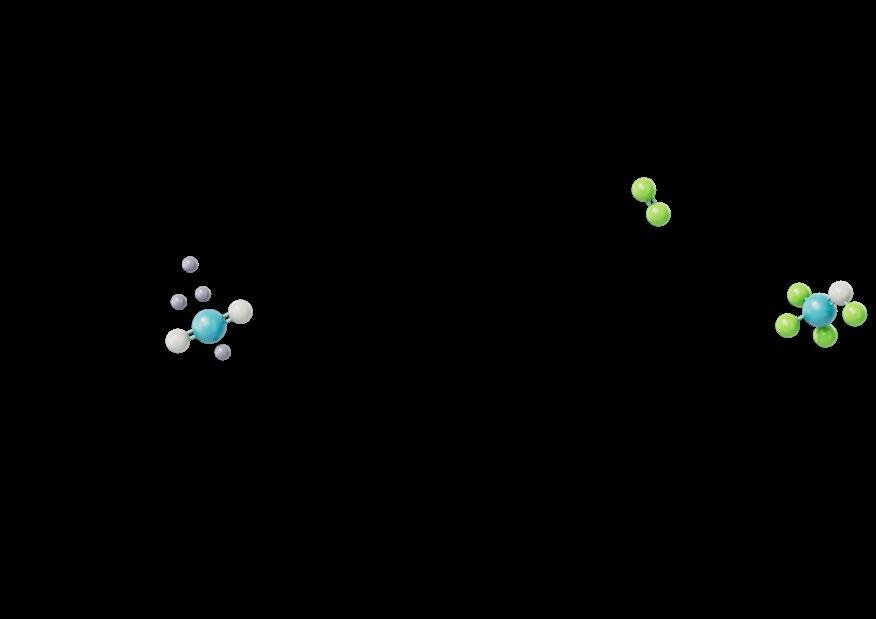
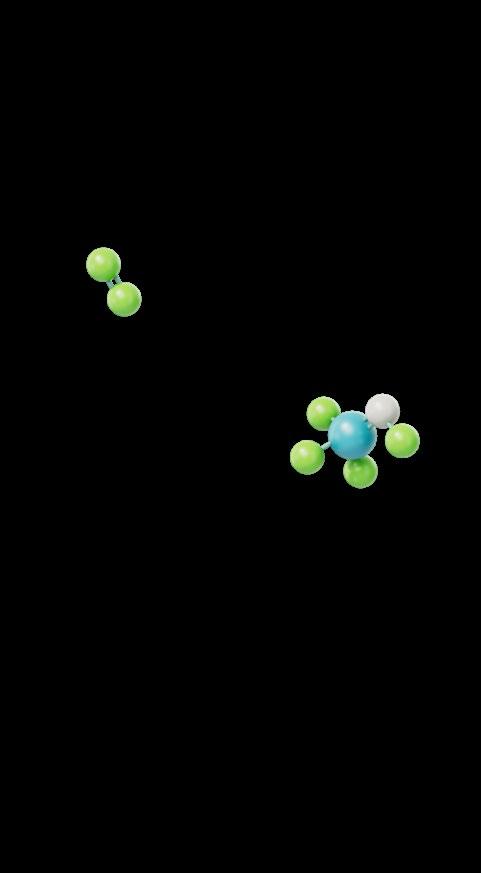
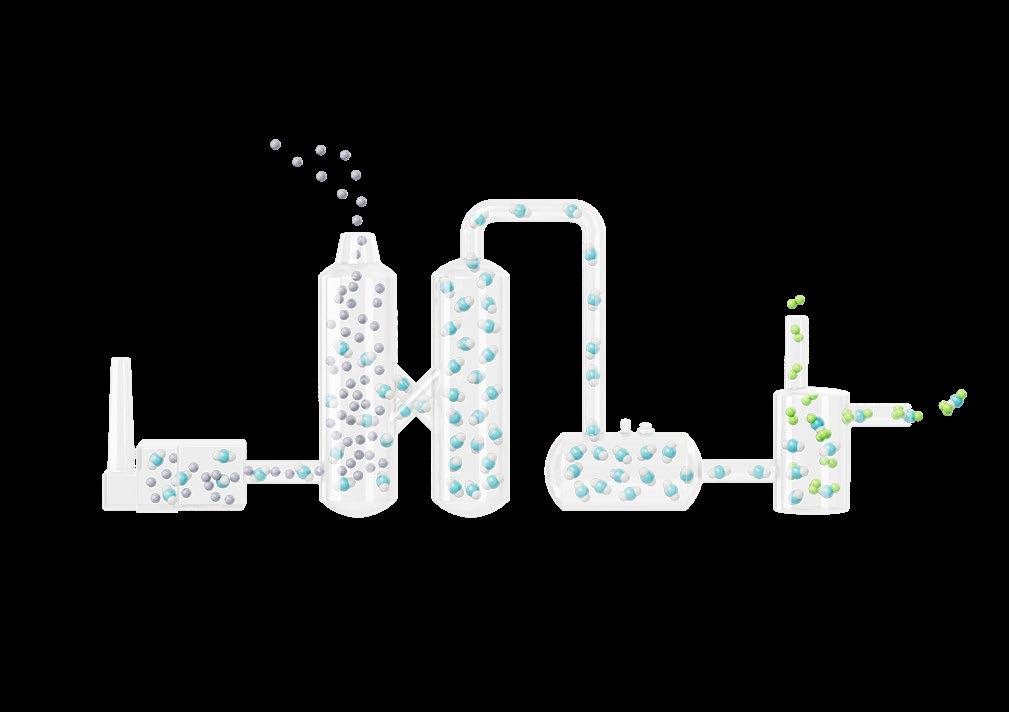
The ALV 1 plant emits 24,000 metric tons of CO2 each year. Working with the University of Applied Sciences and Arts Northwestern Switzerland, we have launched the Carbon Capture and Utilization demonstration project that aims to change this. The values shown in the diagram are estimates.
(point-source capture). This was the basis for developing a specific solution what is now being put through implementation testing. In a single process, the CO2 is not only separated and stored but also transformed into a marketable substance. The process results in methanol, which can be used in the chemical and transport industries. Project management opted for the methanol value stream because it is difficult to sell CO2 from an industrial park to the food industry and the amounts of CO2 captured from the smaller incinerator exceed the CO2 requirements of the other industries. All the stakeholders are pleased with the outcome: clean air (society), a new value stream (GETEC) and a lower CO2 value (customer). “Our customers in Switzerland are extremely interested in carbon capture because everyone knows that the regulations for CO2 emissions will become stricter over the next ten years. That is why we aim to be at the forefront of this development. In order to drive things forward, we need a demonstration plant now. We are working on achieving this as quickly as possible,” says project sponsor Arthur Gebhardt.
In the absorber, a liquid amine binds the CO2 from the flue gas, thus physically separating it from the remaining gas.
In the desorber, the amine/CO2 compound is heated to split it. The CO2 is collected for further processing.
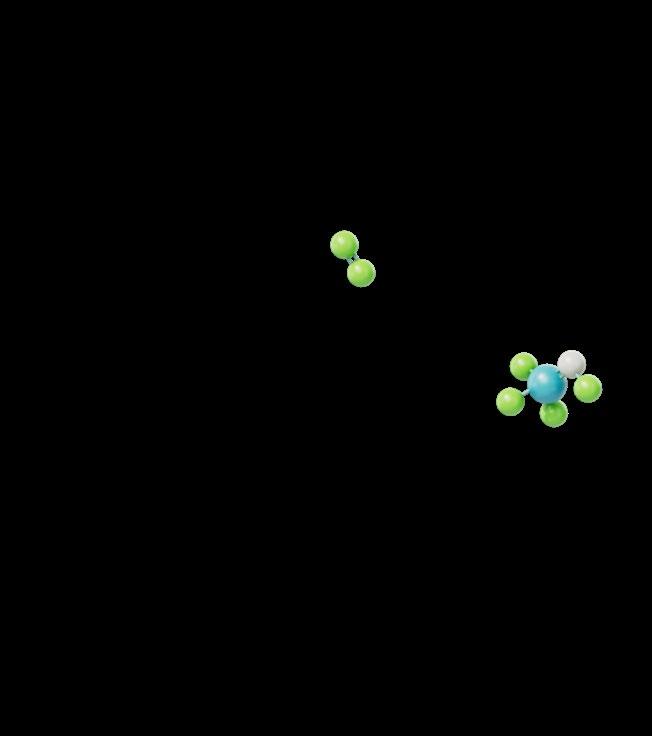
The CO2 purified by the individual process steps is stored in the CO2 tank for further processing and can be removed as needed.
Hydrogen from electrolysis or other sources is added to the reaction (375 kg/h).
At elevated pressure and temperature in the tube reactor, the CO2/H2 mixture forms methanol and water. This process also produces valuable heat in the form of steam.
The result of the process is valuable methanol for use by industry.
We have identified water and effluents as a material topic and are reporting it for the first time here. In the course of 2023, we will be conducting an analysis of all impacts as part of a materiality analysis in accordance with the GRI Standards Update 2021 and will report on this in our next sustainability report.
All four GETEC platforms and the associated sites use water, which is usually obtained from the public infrastructure. In light of the increasing frequency of drought periods, we are seeking to make responsible use of this resource. Therefore, in the future, we will be establishing more management and control systems to ensure that we reduce the consumption of water in production and processes. The goal of our water management is to ensure that we do not unnecessarily contaminate the sources from which we obtain water or into which we discharge our effluent.
For GETEC, water is an operating medium and, therefore, an important resource. High-pressure steam plays a key role in delivering heat to industrial processes. It is an excellent medium for transporting energy efficiently. Steam is produced in a boiler system for subsequent use in thermal processes. It can also be used in mechanical operations and, for example, can be fed into a turbine to generate electricity.
GETEC supplies high-pressure steam to industrial companies. The Industrial Segment, for example, plans, obtains approval for and constructs plants, also offering operation and support services. For industrial companies,
There is a manual for the Platform Germany environmental management system that governs the monitoring of water consumption. The platform in Switzerland is covered by that country’s water registry which mandates water consumption reporting.
Our platform in Italy extracts water only from the public infrastructure and is therefore not required to report any data to the authorities – which
The Permits and Environmental Protection department for Platform Germany is responsible for industrial plants that are subject to Germany’s Federal Immission Control Act (Bundes-Immissionsschutzgesetz, BImSchG). As a first step in recording GETEC’s water consumption data, the outflow volumes were calculated. In the next step of the continuous improvement process (CIP), these data will be refined and more details recorded. Here, too, we will successively optimize the database, switching from the calculation of individual measurements to continuous measured values. Regarding water recirculation with prior waste water treatment, some industrial sites have implemented condensate recycling. Since these values have not yet been determined in detail, water recirculation is not described separately at this juncture.
It was possible to determine the water consumption (total outflow) for industrial plants that are the responsibility of the platforms in Switzerland and the Netherlands and therefore not subject to the BImSchG. Platform Netherlands treats all its process water in its own waste water treatment
steam is an inexpensive and efficient way to obtain electricity and heat.
Steam is frequently used in a closed circuit. However, there are always small losses from conventional plants which have to be replaced. Moreover, some industrial plants, such as paper mills, work with open steam systems which behave differently. The water is simultaneously a raw material that is used in paper production and consumed by the company.
Our solutions for the chemical and pharmaceutical industry, food and paper production, the materials and automotive industries are also aimed at supplying process and cooling water to industrial plants. That is the case at both single-client sites with just one company and at multiclient sites with a large number of industrial operations such as the GETEC parks in Switzerland (Muttenz) and the Netherlands (Emmen).
We usually supply cooling water for production processes in closed circuits as well. Depending on the applicable legal requirements and energy balance, we use fresh water in continuous-flow cooling systems – but only in those regions with high fresh water availability.
GETEC also needs water to supply heat in the real estate and building sectors. These are usually closed water circuits so it is primarily a question of replacement volumes for heating systems.
would be the case if it used groundwater, surface water or seawater. A similar situation applies to water discharges. Everything that is not domestic or gray water must be reported to the authorities. However, our platform in Italy falls under the domestic water category and is therefore not affected by this provision either.
plant. The resulting clean water is discharged to surface waters. Platform Switzerland obtains its water from public networks but, due to regulatory requirements, also from the groundwater in order to maintain defined minimum levels (safety precaution). This water is used solely as cooling water in a separate circuit and is discharged uncontaminated to surface waters (river).
Regarding waste water treatment and recirculation by GETEC PARK.SWISS, we hereby refer to the chapter entitled “GRI 306 Effluents and Waste”
In the case of heating water for real estate, water recirculation is a negligible issue because the water is not contaminated to any relevant extent.
Any existing water-saving measures must still be documented by the Group so that it is able to report them in the future. GETEC does not operate any sites in water stress regions.
At present, we record and monitor the volumes at the water outflows of plants subject to the BImSchG. We also monitor the volumes at the industrial parks operated by the platforms in the Netherlands and Switzerland in accordance with legal requirements. In this way, we ensure full legal
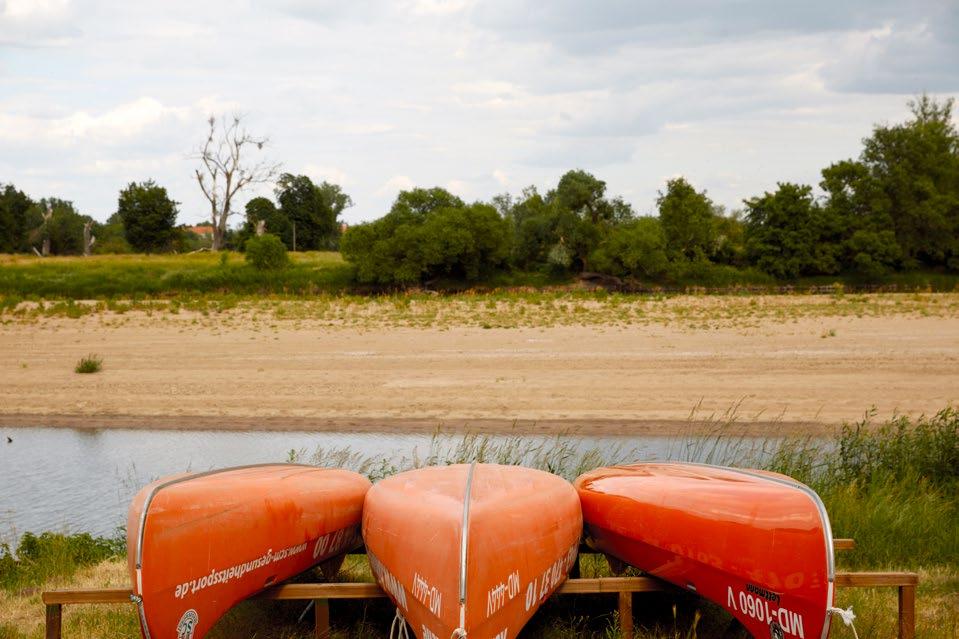
In the case of new projects, there is an obligation to contact stakeholders such as local communities.
compliance. The data are recorded and stored in the central system. The GRI 303-3, GRI 303-4 and GRI 303-5 indicators cannot be determined in detail for all platforms for 2022.
Our core competence encompasses energy since we supply heating, refrigeration, steam, electricity, compressed air and other media to industrial and real estate customers. We take a holistic approach and our solutions often form a systemic network of different technologies and media. Our company is clearly focused on reducing carbon emissions. However, most
GETEC has a large number of regulations and policies including environmental regulations, a fundamental principle of rigor (sparing use of resources) and our commitment to climate protection by means of decar-
Our business model focuses on the European Union’s Green Deal and the target of net zero, which we aim to have achieved already by 2045. Our company is supporting the industrial and real estate segments as they move toward climate-neutral production and supply. Our packages of measures are combined in the following product lines:
• Green Strategy (for industrial and real estate customers)
• Green Steam (for industrial single-client sites)
• Green Heating/Fossil-to-Green (for real estate customers)
• Districts of the future and district heating (for real estate customers)
• Multiclient sites industry (for industrial companies in competence clusters)
• Waste-to-Energy and Waste-to-Value
solutions are still producing emissions. The boundary of this material topic is described in the ESG Report 2022, page 38, in accordance with the previously applicable requirements of GRI 103-1. In the course of 2023, we will be conducting an analysis of the impacts as part of a materiality analysis in accordance with GRI Standards Update 2021.
bonization – not only in respect of our own plants but also our customers’ plants. Our conduct and action are based on the GETEC Group’s HSE Policy, which applies to all platforms.
We described these solutions in detail in the ESG Report 2022, pages 38 to 43.
In the 2022 reporting year, due to the war of aggression against Ukraine and the resulting upheaval on the energy markets in Europe, we began adapting our technology roadmap to the new market requirements. In the real estate sector, we need to act faster and with more determination when it comes to the electrification of systems. In the industrial sector, hydrogen must become available sooner and be more affordable, for example. Here, GETEC is active in various projects and viable partnerships.
Our four regional platforms have already implemented their own measures to reduce emissions. We described these in the ESG Report 2022, pages 43/44. The following changes occurred in the reporting year:
TOPICS AND TARGETS
Green Steam (climate-neutral energy supply)
MEASURES AND MILESTONES
Reference project in Teisnach, Germany: Installation of a climate-neutral energy supply for the Pfleiderer paper mill; heat supply (process steam) from a modern biomass heating plant with an annual reduction of 27,000 metric tons of CO2 emissions. The plant has been successfully converted and the full refurbishment is scheduled for completion before the end of 2023.
TIMELINE AND STATUS
2023
Utilization of specialty gases (CO2 reduction)
Green eHeating (CO2 reduction)
Reference plant in Gengenbach, Germany: Here, a CO2 reduction of 19,000 tCO2 per year will be achieved by converting the plants from pulverized coal to dedicated biomass. It is planned to connect the plant to the grid in mid-2023; work on the plant is on schedule.
The goal of CO2 reduction is being pursued in other projects, for example, with Projekta Grundinvest in Darmstadt, Germany. Here, 122 residential units are supplied with 85% renewable energy from PV and heat pumps.
Summer 2023
Established
Green strategy (decarbonization schedule)
Strategic collaboration with Wankendorfer, a housing cooperative: Development of a package of measures to achieve climate neutrality by 2045; an investment plan for a property portfolio of 8,300 apartments based on a decarbonization roadmap has been developed and will be implemented in the time period.
Implementation ongoing From 2023
Energy management (certification)
Energy management (development of the ISO 50001 management system)
District heating (energy reduction)
Certificate regained at the end of 2022
Consolidation of the newly established management system processes in 2023
Expansion of the certificate scope to further companies in 2024
Acquisition of the district heating supply for the city of Rozzano, Italy; modernization and refurbishment of three power plants to enhance the efficiency and safety of the city’s energy supply
Established
2023 and 2024
Renewable energy (CO2 reduction/energy efficiency)
Thermal waste recovery (CO2 reduction/energy efficiency)
Energy management
Increase in the total installed output from renewable sources; improvement and expansion of commercial renewable energy offerings (e.g. photovoltaics)
Improvement and implementation of proposals for thermal waste recovery to replace the use of fossil fuels
Certification to Italian standard UNI CEI 11352:2014 (requirements for energy service companies)
Climate-neutral supply Details in last year’s report
New feature: Construction of a biomass steam boiler at GETEC PARK.EMMEN
Management system (annually updated targets to improve the site’s environmental performance)
Management system implemented and certified to ISO14001
Targets: E.g.: steam loss reduction program for the entire site; systematic analysis and review of the entire GETEC steam delivery network to reduce energy losses from steam condensers due to poor insulation and other optimization measures. The measure implemented in the condensate network in 2022 cut steam losses by a total of 1,100 metric tons, reducing gas consumption by 933 MWh. In addition, various older pumps were replaced with efficient new pumps, cutting electricity consumption by 136 MWh/a. A further 11 MWh/a of electricity was saved by replacing lamps.
First plant refurbished and ready for operation (2022); second plant to start operating soon (2023); third plant under construction
Planning and implementation in 2023
Planning and implementation in 2023
Achieved
Started in 2022, start-up in 2023
Established
Recycling (reduce our customers’ carbon footprint and increase their value creation)
Energy saving (development of efficiency measures for an industrial site in order to improve the commercial and energy-related situation of the businesses located there)
Energy management (CO2 reduction)
Waste-to-value: Used and depleted raw materials (used solvents) are recycled by GETEC and can be reused by our customer. These solvents have a much lower carbon footprint then new solvents.
The customer’s production process is investigated for its energy-saving potential. GETEC applies its experience in heat recovery and, especially, heat transformation to this analysis. In this way, economic and environmentally friendly energy concepts can be tailored for the companies based at the site.
Installation of rooftop PV units at the GETEC PARK.SWISS multiclient site: First PV unit finalized at the end of 2022; a further 1,050 units with a nominal output of 588 kWp will be installed in 2023.
Established
Established
Under construction
We have implemented a Group-wide energy data initiative to continuously record information about the output of our power plants, with the goal of increasing their energy efficiency. Around 75% of the plants were digitalized in the reporting year, which facilitates large-scale remote monitoring. In addition, GETEC has developed a CO2 emission model which makes it possible to forecast the company’s future emissions profile on the basis of the decarbonization technology roadmap. Due to the developments on European energy markets, this emissions model is being modified alongside the adjustments that are necessary to the Group’s technology roadmap. There are also systems for calculating annual Scope 1, Scope 2 and Scope 3 greenhouse gas emissions. We are still aiming to define science-based GHG reduction targets and planning for this is ongoing. Regarding the determination of Scope 3 emissions, we are seeking to use more hard data each year so we can increasingly do without model calculations. We were able to calculate the actual Scope 3 emissions of our customers, i.e. those emissions from assets owned by our customers or from the resale of energy to our customers. Other emissions that are relevant to Scope 3, such as the emissions relating to materials, transport and our suppliers, are determined using our tool-based model calculations.
In the future, we will require our suppliers to reduce their greenhouse gas emissions. To achieve this, we will be integrating a digital database in the form of a supplier portal into our supplier management system. We introduced a prototype of this new system during the reporting year so that we can conduct a pilot project that enables us to handle new issues more effectively. In the years ahead, we aim to use this system – supplemented by an app – to improve processes so we can address the core aspects of Germany’s Act on Corporate Due Diligence Obligations in Supply Chains (Lieferkettensorgfaltspflichtsgesetz, LkSG) and the European Supply Chain Act as well as achieve transparency regarding the emissions of our major suppliers.
The crucial yardstick that GETEC uses to measure decarbonization is the key indicator “GHG emissions intensity.” This KPI describes the ratio of GHG emissions in gCO2 for every kWh of energy output. It is a significant value because it is part of GETEC’s business model to operate a growing number of its own plants and customer’s plants. Due to the company’s growth, absolute figures do not deliver adequate information. During the reporting year, a further improvement was achieved for this KPI. The figure declined to 191.2 gCO2/kWh.
The following KPIs and the prior-year values are shown in the table on page 98:
GRI 305-1 Direct (Scope 1) GHG emissions
GRI 305-2 Energy indirect (Scope 2) GHG emissions
GRI 305-4 GHG emissions intensity: Ratio of total emissions (Scope 1 & 2 in gCO2) to energy generated (gCO2/kWh)
Decarbonization concerns almost all our relevant stakeholder groups. For this reason, we maintain a constant dialog with our customers, organizing webinars on new regulatory developments and providing information about decarbonization options. For our employees, too, discussion of the company’s purpose is increasingly relevant. That is why “Making a differ-
ence for generations to come” is our mission, which refers to aspects such as decarbonization and is intended to motivate our employees. In the case of new projects, there is an additional obligation to contact stakeholders such as local communities.
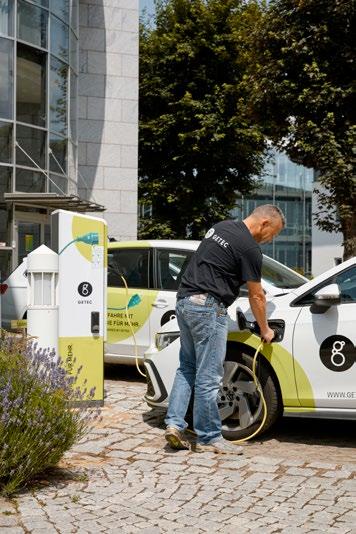

With its platform in Switzerland, the GETEC Group proves that treating problematic industrial waste works – whether this is waste air, waste water, solid waste, liquid waste or even hazardous waste. Waste and waste water treatment are part of the business model there and thus a material
At the GETEC PARK.SWISS site, waste water disposal is regulated by a detailed process instruction setting out clearly defined responsibilities. The Head of Waste Water Disposal has prepared separate operating instructions for the various types of waste water; the AVORA experts have drawn up a sampling instruction. We must also produce annual environmental,
We described the management approach and the business model for waste and waste water treatment in the ESG Report 2022, pages 64 to 66, providing details of the waste-to-value and waste-to-energy principles.
GETEC PARK.SWISS is currently developing a pilot plant for improved waste water treatment that is scheduled for completion at the beginning of 2024. Following a test phase and official approval, construction of the plant –named CALLISTA – will commence. It is due to start operation in 2027 and will treat waste water using fewer resources than the existing plant. CALLISTA will analyze the waste water immediately and route it to the right process. Thus, waste water that is only lightly contaminated goes through fewer process steps than heavily contaminated waste water. As a
topic that we explained, together with its boundary, in the ESG Report 2022, page 64 (in accordance with GRI 103-1). We will discuss the pending analysis of all impacts in accordance with GRI Standards Update 2021 in the next report.
waste and waste water reports to provide the authorities with extensive information about operations across the site. EU REACH (Registration, Evaluation, Authorisation and Restriction of Chemicals) applies as a general principle. We perform REACH analyses to testing industrial waste water.
result, fewer chemicals and less energy are needed and transport routes are shorter. The aim is to motivate the companies located at the park to make their own processes more sustainable. In addition, the new plant contributes to the circular economy. The biogas produced by the treatment process is used directly in the incinerator on site to generate steam. The waste heat from the waste water is combined with solar energy for use in heat pumps. The modules of the CALLISTA waste water treatment plant are described on the following pages.
Most of the waste disposed of is not produced by GETEC but almost exclusively by the chemical and life sciences companies that are connected to the Park’s infrastructure. This makes it difficult to calculate all the KPIs required by the GRI (GRI 306-3 Waste generated; GRI 306-4 Waste diverted
Bau
More than 99% of the fuel used in the resource-friendly Bau 851 incinerator at GETEC PARK.SWISS was waste, 53% of which was waste solvents. Standard fuels such as heating oil and natural gas accounted for just 0.2% of the fuel used.
from disposal; GRI 306-5 Waste directed to disposal) that would document an improvement in waste management. Evaluation of the management approach in accordance with GRI 103-3 can be found in the ESG Report 2022, pages 66/67
GETEC PARK.SWISS maintains a constant dialog with its on-site customers by way of personal conversations and regular surveys concerning selected sustainability topics. Also essential is the continued dialog with the Canton of Basel-Landschaft in order to take account of official interests and
regulatory requirements. For example, we are consulting and coordinating closely with the cantonal authorities in connection with the new CALLISTA waste water project.
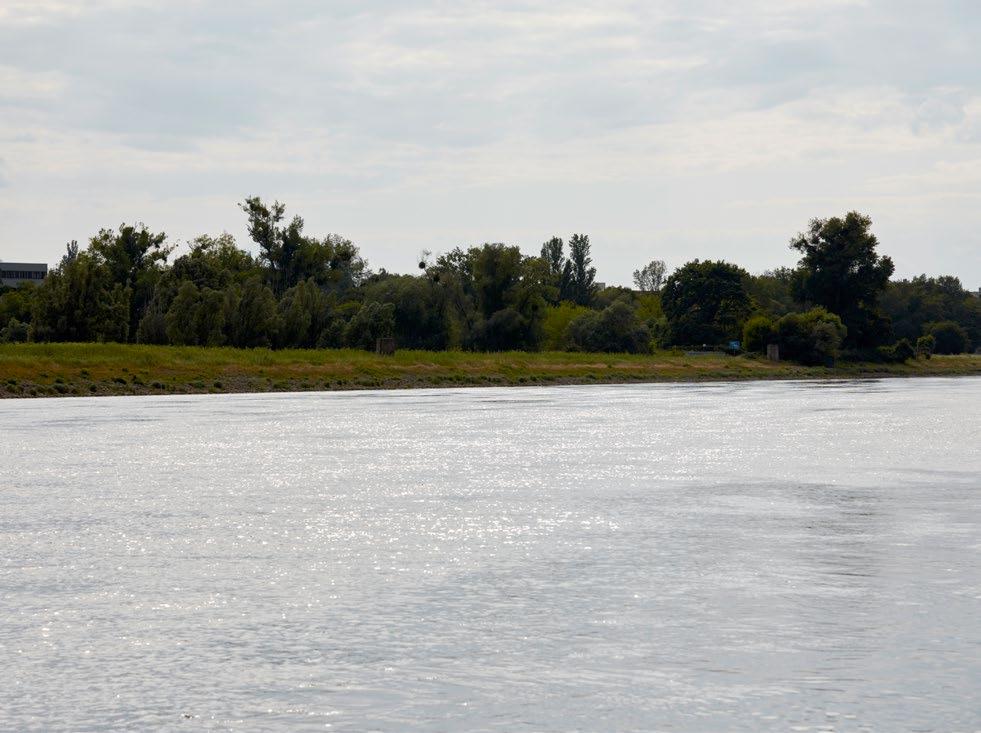
Many chemical and pharmaceutical processes concern what are known as active ingredients. One example: Some customers at GETEC PARK.SWISS produce fungicides. These products contain substances that protect plants from fungal infestation by inhibiting the growth of the fungi. When cleaning production equipment, residues of these active ingredients get into the waste water system. They can cause damage if they are discharged to the environment uncontrolled. In order to prevent this, we must treat the water before discharging it into the Rhine so that it is entirely harmless to the environment. In this connection, the authorities apply stringent threshold values. Our goal is to use the best process possible so that we can always comply with these threshold values and ensure maximum levels of environmental protection.
The treatment of industrial waste water is considerably more complex than the treatment of communal waste water. For example, industrial waste water may contain molecules that have been designed specifically to be immune to bacteria. However, because bacteria play an important role in waste water treatment, we first have to split these substances so that they can be recognized and broken down by the bacteria. We use various industrial pretreatment processes to achieve this. It would be a relatively simple matter if we were dealing with just one type of waste water. However, we have 19 different types of waste water at GETEC PARK.SWISS. Until now, we have managed using a chemical pretreatment process and a high level of material inputs. The new CALLISTA plant means that, in the future, we will be able to treat waste water in a more targeted manner, using fewer raw materials and less energy as a result.
Yes. The process is more environmentally friendly and more economical because we can reduce the consumption of energy and chemicals substantially. By analyzing the waste water in the production plant where it occurs, we can route it directly to the optimal process module (see graphic). Specifically this means fewer chemicals, lower energy consumption and shorter transport routes. Ozone treatment is a good example. For the current process, we have to purchase, transport and store hydrogen peroxide and iron sulfate. By contrast, CALLISTA will use oxygen and electricity, both of which we produce on-site as needed. That is a sustainable improvement. A further advantage is its flexibility. It is easier to scale up to meet customers’ needs. The waste water goes through one or more process steps depending on how contaminated it is. In this way, we and our customers can work together to optimize processes sustainably.
CALLISTA will contribute to the avoidance and reuse of waste at GETEC PARK.SWISS. This is illustrated very well by the new anaerobic process step, which produces methane. We use this biogas as a fuel to generate carbon-neutral green steam, which our customers then utilize as a source of heat for their chemical processes. In addition, we use the heat from the waste water together with solar energy in heat pumps to produce thermal energy for the industrial park.
A pilot plant is scheduled for completion by the start of 2024 and will then be tested. The construction of the full-scale plant can start following an approval phase conducted in close collaboration with the building and environmental protection authorities. This is to be concluded by 2027. Once the necessary testing has been completed successfully and the official permits issued, we will be able to start waste water treatment.
TREATMENT PLANT. ARTHUR GEBHARDT IS ONE OF THE DRIVING FORCES BEHIND THE ‘CALLISTA’ PROJECT. HE EXPLAINS HOW THE PARK’S WASTE WATER WILL BE TREATED IN THE FUTURE USING FEWER RESOURCES.
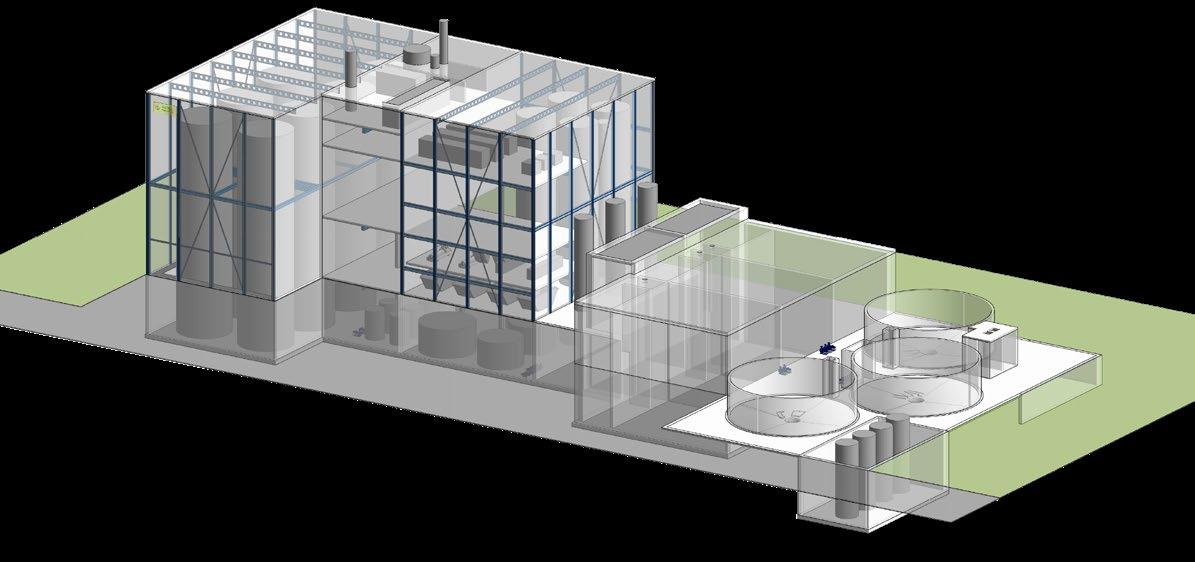
Hydraulic separation: The waste water flows into buffer tanks for immediate analysis.
Removal of metals: Heavy metals are removed from the waste water.
Sludge tank: The sludge is separated from the waste water for further processing.
Anaerobic reactors: Bacteria digest harmful substances in an oxygen-free environment, producing biogas for subsequent use.
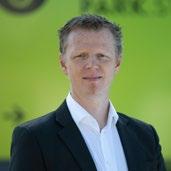
Ozone reactors: Ozone is used to convert organic substances and for purification.
Aerobic bacterial degradation: The remaining impurities in the waste water are broken down biologically by microorganisms.
Nitrification: Bacteria convert ammonia into nitrate, which is then used as a nitrogenous mineral nutrient in fertilizers for plants.
Mechanical treatment plant: Filters and rakes remove larger impurities from the waste water.
Sand pellets: Sand filters are the final purification stage for the treated water.
Discharge: The purified water complies with stringent environmental requirements and can be discharged into the Rhine.






WE ARE PROUD OF THE PROGRESS WE MADE IN SAFETY DURING THE REPORTING YEAR. THIS IS EVIDENCE THAT OUR MEASURES ARE WORKING. HOWEVER, WE STILL HAVE SOME GROUND TO MAKE UP WHEN IT COMES TO DIVERSITY.
At GETEC, we are convinced that diversity makes our company better. Despite targeted recruitment activities, we were unable to attract more women to work at GETEC. We aim to make up ground here and, in the following article, asked some of the women at GETEC how we can improve. We no longer want to apply a quota for women but intend to express our approach with a new indicator. Gender parity shows the differences that still exist between the genders and describes the ratio of women to men. 100% gender parity would be achieved if 50% of our employees were women and 50% men. By contrast, our measures to improve safety awareness are having an effect. Following a year of frequent accidents, we substantially improved the lost time injury rate (LTIR) to 4.1 in 2022. 95% 2022
360° Safety Culture
Regular training
Continuous process optimization
Safety Moments and Stand-up Meetings
Root cause analysis of accidents
Evaluation of near misses
Establishment of cross-platform Work Safety Meetings to foster dialog
Roll-out of platforms’ best practices such as the Hearts & Minds program from Platform Netherlands
Work-life balance, e.g. thanks to GETEC company childcare facilities, mobile office regulations and flexible working hours

Cooperation with universities (dual degree program)
Trainees and scholarships
Girls’ and Boys’ Days

How many of our employees participated in the survey? (average for GETEC Group)
Average evaluation of the statements on a scale of 1 (negative) to 5 (positive)
Percentage of committed employees who are highly dedicated to their work and their workplace and are motivated
THE SURVEY IS LIKE A THERMOMETER – IT ONLY MEASURES THE SITUATION AT A GIVEN MOMENT. WHAT IS IMPORTANT IS WHAT WE DO WITH THE INFORMATION. WE FOCUS ON DIALOG WITH OUR EMPLOYEES AND SEEK TO WORK WITH THEM TO DEVELOP THE RIGHT MEASURES.
Julia Felischak HR Business Partner
1. Our employees’ engagement is growing. The proportion of engaged employees has increased from 28 percent to 38 percent (plus 10 percent), with a corresponding decrease in the proportion of employees who are actively unengaged from 19 percent to 14 percent (minus 5 percent). The survey response rate also rose substantially.
2. There is still room for improvement. The results remain in the mid-field, especially compared with international Gallup peer groups.
3. Our efforts in challenging areas are paying off. There were very high levels of satisfaction in respect of diversity and inclusion with a total score of 4.27.
4. There is a lot still to do. The distribution of the responses shows that four points are often selected, which translates as “yes, but.” In the course of the subsequent Engagement Dialog, our task is to identify the buts so that we can score five points (very satisfied) in the future.
The results are shared and explained by management in a presentation. All employees are familiar with the Engagement Survey 2023 and know what the results refer to.
At individual team meetings without the participation of their supervisor, each team identifies the three most important fields of action and agrees a follow-up meeting.

At the follow-up meeting, the team and its supervisor jointly define specific measures and an action plan. This plan is shared with management and HR.
STEP 4
Management is now aware of the measures planned and can provided valuable feedback to the team’s supervisor.
STEP 5
To ensure transparency, the action plans are shared with the relevant management. In the fourth quarter, all the individual action plans are merged into a global action plan and implemented.


The number of women working for GETEC remains at the average for the industry. We aim to change this so we asked some of GETEC’s female employees how we can improve in this area and attract more women to work for GETEC. We spoke with four colleagues from very different areas of the company. It was an open conversation that delivered a large number of concrete ideas.
YOU ALL WORK IN VERY DIFFERENT AREAS OF GETEC. HOW WOULD YOU DESCRIBE WORKING AT GETEC FROM YOUR OWN PERSONAL PERSPECTIVE? AND WHAT HELPED YOU TO FEEL AT HOME AT GETEC WHEN YOU STARTED OUT?
[Jana Messmer] At the start, I was assigned a mentor who spent an awful lot of time with me in the first few months. It was really helpful and I immediately felt that I was being well looked after. And I work in a young team, which is great. Right from the start, I could ask anyone for information and support. Everyone at our site knows each other and I can put a face to our management, which I think is good. I previously worked for a large company and there were far fewer personal encounters.
[Gargi Purnapatre] My start with the company was different. I accepted a consultant position at GETEC that previously didn’t exist, right in the middle of the pandemic. The disadvantage was that I had no role models and little guidance for my onboarding. But everyone was still extremely nice and helpful to me as well. At the same time, I saw this special situation as a great opportunity to develop myself and my role.

[Jana Möllenkamp] My onboarding was also super. Despite the coronavirus pandemic, we somehow always managed to meet in person. However, I feel this didn’t stop with my onboarding. Everyone is always very helpful and we all pull together.
[Carina Wermter] We used to have more of these face-to-
face meetings but now, not all colleagues have the good fortune to have met each other in person. A very specific request from me would be that teams and departments –not just an employee’s core team – meet face-to-face as a fixed part of the onboarding process.
[G.P.] I feel the same. Getting to know each other is also about ensuring there’s a common understanding – which team does what? Who is facing what challenges? That helps our collaboration.
[J.Me.] The company’s digital relay race. It’s one way of getting to know many colleagues, a real team-building exercise and great fun.
[G.P.] I think it’s the fundamental respect and trust in each other that is always there. That doesn’t mean that everything is always easy. However, from my experience at other companies, I know how it feels when there is no respect.
[J.Mö.] I think the team events are important, enabling us to meet regularly and do nice things together. And I think we have a very real opportunity to contribute our ideas and develop topics.
[C.W.] Growth is the one word that strikes me as being “typically GETEC.” We are growing fast and continuing to evolve. While not everything is perfect, things are certainly exciting.
“MORE DIGITALIZATION NOT ONLY HELPS US TO WORK EFFICIENTLY BUT ALSO TO ACHIEVE GREATER TRANSPARENCY AND MUTUAL UNDERSTANDING.”
Gargi Purnapatre Energy Consultant
[G.P.] I sometimes wish GETEC could be more active when it comes to digitalization. In fact, this applies to Germany as a whole and not just to GETEC. We could then not only use digitalization to work more efficiently, but also to achieve greater transparency and mutual understanding.
[C.W.] That’s true, digitalization is an important aspect. It is often a battle to tempt colleagues away from their Excel spreadsheets. I think some people really don’t know what can be digitalized and automated.
[G.P.] I have the feeling that many people are simply scared of so much change.
[J.Me.] And change always results in an initial decline in performance.
[C.W.] There are always a number of works in progress, such as the reporting of the core processes. In addition, we combine the real estate and industrial sectors, each of which is dealing with its own issues.
[G.P.] Of course, at the meta level, the energy transition is a very dynamic issue that consistently results in new tar-
gets, for example. On this basis, we need to ask ourselves whether we are actually in a good position to achieve these targets and what else we need in terms of strategy, resources or knowledge, for example.
WHAT WOULD YOU LIKE GETEC TO DELIVER AS AN EMPLOYER?
[C.W.] I think it is really important to achieve greater transparency in respect of salaries.
[G.P.] This transparency would also be important if we are to remain competitive as a supplier.
[J.Mö.] I believe that salaries may differ very widely within the organization. Transparent wage structures could perhaps be a way of enabling employees to work out their position themselves.
[J.Me.] A wage corridor would provide useful guidance.
[G.P.] Uniform rules would also help me in other areas –and probably also facilitate collaboration throughout the organization, for example, with a uniform working from home regulation that applies to everyone. This would also result in transparency.

“WE SHOULD NOT BE THINKING ABOUT HOW WOMEN CAN ASSERT THEMSELVES AGAINST MEN BUT HOW WE CAN ALL WORK WELL TOGETHER AND SUPPORT EACH OTHER.”
Jana Möllenkamp
Project Development Industry, Process Technology
[J.Me.] One detail that sometimes seems strange – large sites like Magdeburg have a staff cafeteria or are visited by an ice-cream truck. It would be nice to have something similar at the smaller sites.
[J.Mö.] A very fundamental issue that concerns me is communication. I would really like a training course that helps us with internal and external communication. It would save us time and avoid or reduce misunderstandings.
[G.P.] With all the changes taking place, I sometimes find it hard to understand the boundaries of a project or a role. I need to know these so that I can work within my own boundaries and be aware when something is outside the scope of my job or area of expertise.
[J.Me.] And another little thing: proper project kick-offs would be helpful here, either in person or, if they are properly moderated, online. Everyone would get to meet each other and could discuss the next steps together.
HOW DO YOU VIEW THE ROLE OF WOMEN AT GETEC?

[J.Me.] In my work area, around 20 to 25 percent of us are women.
[J.Mö.] That’s about the same average as there was when I was studying.
[G.P.] However, this figure isn’t reflected in our leadership.
[C.W.] I think we’re still very conventional, unfortunately. There are far more women in accounting roles and many assistants are women.
[J.Mö.] It would be great if there were more part-time managers or shared leadership models – for both women and men.
[J.Me.] I think it would be good if it were just normal for women to be out and about with their male colleagues. And I would like really diverse teams with different perspectives, not based on where people come from or what they look like but on what they can contribute.
[G.P.] I quite agree. I don’t always want to be seen as the face of diversity. It’s something that should be normal and natural. Perhaps people should be made aware of the fact that there is such a thing as positive discrimination which is not very helpful.
“WE ALSO NEED A LANGUAGE THAT SPEAKS EQUALLY TO EVERYONE AT GETEC.”
Carina Wermter Senior IT Administrator
[J.Mö.] The real issue is to ensure that we are all able to work well together. It should not be about whether women can assert themselves over men but that everyone simply supports each other.
[C.W.] I think we need a language that values everyone at GETEC equally. I’m not really sure how but I do notice that the assistant’s role is often associated with making coffee.
[J.Mö.] One thing I find positive is that my working parttime is accepted as normal. There is not only a formal framework to facilitate this but my colleagues are also supportive. No important meetings are organized in my absence. We all accept each other’s working hours and part-time working is used and accepted by both women and men for various reasons.
[G.P.] When it comes to women and diversity, I think organizations need to start early and, for example, contact young people during their final years at school or their university studies.

[J.Me.] Absolutely. If someone wants to study a STEM subject, they need to think about it really early.
[J.Mö.] For example, GETEC employees could go into schools or attend careers events and report on their working day at GETEC.
[G.P.] That’s a good idea. Young people need role models and very concrete examples. This would encourage more women to pursue a career in this area.
“I WOULD LIKE REALLY DIVERSE TEAMS WITH DIFFERENT PERSPECTIVES, NOT BASED ON WHERE PEOPLE COME FROM OR WHAT THEY LOOK LIKE BUT ON WHAT THEY CAN CONTRIBUTE.”
Jana Messmer Project Development Industry, Electrical Technology
Regina Bertram-Pfister studied law and came to GETEC from Ingersoll Rand, a leading U.S. manufacturer of industrial products, where she was Head of HR for the DACH (Germany, Austria, Switzerland) region and, as the HR business partner for the life sciences segment, responsible for the global HR strategy.

YOU JOINED GETEC IN MAY 2023. WHAT IS YOUR PERSONAL VIEW OF THE CULTURE AT GETEC?
I see a lot of fantastic talent, a great deal of enthusiasm and a positive atmosphere. This is currently reflected by our high engagement index. I also see a collaborative way of working and a very strong willingness to help each other. At the same time, there are unconscious biases, like there are in any organization. To counter these, it is important to develop a strategy that is aligned with the individual issues within the organization. This could be gender or age or other dimensions of diversity. Such honest self-reflection is crucial to addressing prejudices and developing a spirit of trust-based collaboration. There are wonderful training courses for this.
DIVERSITY AND DIFFERENT PERSPECTIVES CAN ALSO CAUSE FRICTION. HOW CAN WE ACHIEVE A CULTURE THAT SEES DIVERSITY AS AN OPPORTUNITY?
We need to communicate long-term goals openly and transparently. HR and Communication, for example, need to work well together to achieve this. The goals must be lived by our organization’s management, in the same way as openness for other opinions and a constructive error culture. Change is often associated with effort so it is important to avoid the classic pitfalls such as recruiting people with similar traits. This can be done by a continuous process of self-reflection or systematically by specially trained HR employees.
WHAT MEASURES ARE NEEDED FOR THE FURTHER DEVELOPMENT OF GETEC’S CULTURE?
In addition to management programs and unconscious bias training for the entire organization as mentioned earlier, there are a number of good initiatives including the GETEC Academies and the People and Culture Circle. It’s now important to network and harmonize these measures. We are in the process of reorganizing the Group and must define common denominators, goals and values for everyone. And perhaps we need to be more creative when it comes to KPIs.
HOW DO YOU FEEL ABOUT QUOTAS FOR WOMEN AND MEN?
Quotas are important in any organization if change is to be achieved. I’ll say it quite clearly: We will only be successful if our teams are diverse. We need to focus very closely on the data – ideally tracking them on a weekly basis. The necessary effort will only be made if we have long-term KPIs and this will yield the corresponding success. And, we should not just focus on a quota for women but apply a truly broad definition of diversity. Of course, it’s not just about the quotas. We actually have to treat everyone equally. Equal pay, for example, has an important role to play here.
The internal fill rate should be 70%. And we need to use relevant KPIs to examine the entire employer life cycle –from employer branding to retirement. The same applies to the retention of younger employees, which is now essential. We need to consider how we can respond to young people’s need for professional development with the goal of ensuring a low fluctuation rate. In Europe, it’s not possible to track all aspects of diversity. However, as a minimum, the organization should monitor the ratio of female to male employees and the age structure and develop targets on this basis.
IS THERE A GENUINE NEED TO FOSTER WOMEN SPECIFICALLY OR NOT AT PRESENT?
I think there is great potential there. I’ve had good experience with women’s networks for training and inspiration from external business leaders, for example. A network like this can be a real incubator for high potentials. Networking among managers and the joint fostering of talents are also extremely important and should be given greater attention. The key question for anyone in a management position is how to involve their employees, make them visible and enable them to shine. This requires the necessary leadership skills which have to be learned.
WHAT CAN ORGANIZATIONS DO IN ORDER TO BUILD THESE LEADERSHIP SKILLS?
Very important here are the corporate purpose and corporate values, which are evident in the way employees collaborate. When it comes to leadership style, especially for senior managers, I favor a situational approach that takes account of the situation and diversity of the teams and individuals. Good leadership is something that needs to evolve constantly.
HOW CAN KPIs GENERATE GREATER MOMENTUM AND SUPPORT FOR HR ISSUES WITHIN THE ORGANIZATION?
In my experience, dashboards can help by demonstrating the positive relationship between business growth and employee engagement. If everyone in the organization is to feel included, simple figures are needed. At GETEC, we can take very specific information from Gallup surveys, create a dashboard and share this in order to visualize the relationships and their interaction within the overall strategy.
There are three strategically relevant aspects that make diversity a material topic for the GETEC Group and its four platforms. First, GETEC is a service provider, often working in close contact with people. Second, diversity offers a great deal of potential for innovation. Third, GETEC aims to attract and develop qualified experts and managers from many different backgrounds. The boundary of the “Diversity and Equal Opportunity” topic
• The GETEC Group is a member of the UN Global Compact
• The company has defined its principles for diversity in a DEI (diversity, equity and inclusion) policy.
• We have developed a manual for managers and a template for the employee dialog process.
• The Diversity Charter applies for Platform Germany; Platform Italy has signed Italy’s diversity charter.
In order to gain access to a larger and more diverse group of potential employees, GETEC’s HR strategy prioritizes three levers: employer attractiveness, internationalization and individual organization. These and the
We aim to develop and implement an inclusion and diversity campaign by 2023. In a first step, we established a diversity circle as part of our People & Culture project in which the company specifically requests and implements suggestions and flexible views from its employees. Within the context of codetermination, we would like to continue improving the company and its impact on the basis of suggestions from our employees. The most recent Engagement Survey included specific questions about diversity, equity and inclusion for the first time. As shown on page 48, the results were excellent.
Moreover, we are planning to establish an internal network with links to an external women’s network in the energy industry as well as inclusion groups.
In 2022, we successfully continued the management program initiated at the end of 2021 with the aim of increasing the maturity of the entire organization. The focus is on building networks and vertical alignment (inclusion of the teams). Other goals are improving employee and management dialog, talent and succession planning, talent development programs, career models and expanding employee benefits.
is explained in the ESG Report 2022, page 72 in accordance with the previously applicable requirements of GRI 103-1. In the course of 2023, we will be conducting an analysis of all impacts as part of a materiality analysis in accordance with GRI Standards Update 2021 and will report on this in our next sustainability report.
• Platform Germany has collective agreements governing working time with greater flexibility in working hours, mobile working and working from home.
• The three other platforms (Italy, Netherlands and Switzerland) have implemented working from home regulations.
management approach are described in the ESG Report 2022, pages 72/73
All GETEC’s managers have participated in this program since 2021. The goal was to encourage managers to reflect on their responsibilities and roles and act consciously in the interests of their employees. A further goal was to strengthen employee-oriented management skills and thus increase employee engagement. The score achieved in the last GALLUP Engagement Survey shows that there are first measurable positive effects. Our managers have also told us that they perceive this program to be meaningful and very helpful.
In the 2022 reporting year, we also revised the talent management process in Germany. This has already enabled us to double the average number of training days. Our goal is to continuously increase the number of training days and grow the Personnel Development department. To this end, we recruited two new employees in 2023 who are dedicated to personnel development and have already agreed a roadmap with the Group and platform management teams. In addition, we have established the GETEC Academies to offer development opportunities to our employees at all levels of the company.
Our four regional platforms have also implemented their own measures aimed at fostering diversity and equal opportunity. We described these in the ESG Report 2022, pages 74 to 79. The following changes and additions occurred in the reporting year:
TOPICS AND TARGETS MEASURES AND MILESTONES TIMELINE AND STATUS
Social security Company pension (details in last year’s report) in accordance with Germany’s Act to Strengthen Company Pensions (Betriebsrentenstärkungsgesetz)
Social security
Framework for supporting employees who are experiencing hardship: In December 2022, a collective agreement was concluded that defines provisions for an occupational accident insurance and assistance to families in the event of an employee’s death or other cases of hardship.
Concluded
Concluded in 2022
Social security (focus: recognition and appreciation)
Equal opportunities
Equal opportunity (diversityappropriate language on job portal and in job advertisements
Diversity (recruitment of talents)
Certification
Regular additional payments for long-service anniversaries, the birth of a child or an employee’s marriage
People & Culture Circle: Completion of the design phase in 2022; start scheduled for summer 2023 due to GETEC reorganization; roll-out of online training still pending (due to reorganization)
(See details in last year’s report)
Recruitment of talents with different backgrounds; increase GETEC’s visibility as a diverse employer; participation in Europe’s largest LGBTIQ+ careers fair, Sticks & Stones in Berlin
Audit by “Beruf und Familie”
Social Revision of onboarding kit (see last year’s report for details); new: collaboration with a facility for disabled people
Personnel development
Personnel development
Six-month climate, energy and sustainability management certification course for employees who are multiplicators (see last year’s report for details)
Foster continuous development: Pilot projects in e-learning format on LinkedIn Learning aimed at fostering development activities and self-directed learning and reinforcing personnel development measures
Work-life balance 2022: Adaptation of working time models (see last year’s report for details); new: collective agreement allowing most GETEC employee groups to work from home
Occupational health management and employee benefits
Increase employees’ professional well-being
• By means of deferred compensation, employees are able to lease up to two service bicycles each
• Collaboration with service provider JobRad GmbH
• Payment of the monthly leasing fee and use of a salary conversion component
Collective agreement concluded in December 2022
2023
Implemented in 2022
Implementation in July 2023
New priorities needed (reason: capacities within HR)
Introduction during 2023
Implemented
Implementation ongoing; pilot project started in June 2023; roll-out in summer 2023
Collective agreement concluded: December 2022
Collective agreement concluded and process roll-out in 2023
Strategic talent development
• Increase in the number of apprenticeship places in order to recruit and retain specialists (see last year’s report for details)
• Trainer development plan (with certificates) to be created in 2023
• Ramp-up plan pending; focus on apprentices in industrial and technical areas (commercial and technical)
Intranet campaign aimed at increasing the number of in-house trainers: concluded
Strategic talent development
• Integration of young people in training and employment (see last year’s report for details)
• Not yet used: cooperation with training institute OKS; application to provider in 2023
• Collaborative training courses already offered via the Chamber of Industry and Commerce or the company
• 2023: six dual students
Included in the ramp-up plan
TOPICS AND TARGETS MEASURES AND MILESTONES
Strategic talent development
Strategic talent development
Strategic talent development
Attract specialists with the aid of Germany’s Skilled Immigration Act
Dual degree program including intensive support (see last year’s report for details)
Trainee program for university graduates (see last year’s report for details)
Specialist trainee program for experts (see last year’s report for details)
Change/addition: job rotation, job enrichment and job enlargement will be offered to employees in another context
TIMELINE AND STATUS
Included in the ramp-up plan; continuation from 2024 (not possible in 2023 due to change of personnel)
From 2023, four dual students will be employed in Berlin; target of 5% apprentices still pending
Planning ongoing
Strategic talent development
Strategic talent development
Strategic talent development
Social security, company pension
Social (diversity and inclusion)
Company’s specialist career path concept (see page 77 of last year’s report for details)
Scholarship program (see details in last year’s report)
Girls’ and Boys’ Days at our office locations in Germany
Established by GETEC ITALIA (Cometa, Previndai); members: 13.9% Energy Wave site (Fondo Fonte, Fondo Pastore); members: 16.2%
Integrated management system in place; certifications: SA 8000:2014 (Social Responsibility) and ISO 30415:2021 (Human resource management – Diversity and inclusion)
Concept design 2023, roll-out 2024
Planned from 2024
Ongoing
Ongoing
Achieved, ISO30415 since September 2022; certification for GETEC Italy; received for Energy Wave site in April 2023
Diversity, inclusion and social responsibility (certification and charter)
Equality
Diversity
Work-life balance
Strengthen diversity, inclusion and social responsibility through certification of the diversity and inclusion policies (ISO 30415:2021) and signing of charter for equal opportunity in the workplace
2022 (signing of Diversity Charter in November 2022)
Readiness audit for gender equality certification (UNI/PdR 125:2022) 2023
Diversity-friendly approach to applicants (job portal, job advertisements)
Compatibility of family, career and leisure activities (see details in last year’s report); compliant roll-out and communication ongoing and use of smart working regulated contractually since the end of 2022
Proportion of part-time employees: GETEC ITALY: 0.14% Energy Wave site: 0.14%
Implementation in 2022
Ongoing
Personnel development
Personnel development (retention of specialists)
Target: Increase the number of training days by at least 88.5% in 2022 (compared with 2021) on the basis of the 2021 training needs analysis
Specific technical and soft skills training plan for specialists
Ongoing advice and coaching program
Ongoing
Ongoing
Planned for 2023
Social security (company pension)
Contributions: 50% employer, 50% employee Amount graduated depending on age
Equal pay Map out who gets paid what, whether this is in line with the market and whether treatment is equal
Onboarding Up-front investment, company-wide announcement, welcome kit and interactive courses
Work-life balance (compatibility of family, career and leisure activities)
Strategic talent development (secure qualified talents for the future)
Diversity (fostering tolerance)
Diversity
Company pension
Social benefits
Adaptation of working time models (see last year’s report for more details)
• Links with NHL Stenden University of Applied Sciences and Drenthe University of Professional Education
• Talent and succession planning envisaged
• Strategic personnel planning for retirement
• Demonstrative support for greater diversity with clear signaling
• Increasing awareness of the content of the UN Diversity Charter; in house and via our LinkedIn accounts
• Proactively foster the use of diversity-appropriate wording in job advertisements
• Foster diversity by implementing diversity-appropriate language to address potential candidates on the company’s job portal and in job advertisements
• Contributions: 50% employer, 50% employee
• Amount graduated depending on age
• Coverage of risks, e.g. death, invalidity
Focus on recognition and appreciation:
• Get well cards in the event of long-term illness or accident
• Additional benefits for the birth of a child
• Additional vacation days for long-service anniversaries
Implemented and active via pension provider Lifesight
Due in 2023
Due in 2023
Ready and communicated
Ongoing
Completed in 2022 and planned again for 2023
Ongoing
Ongoing
Work-life balance
Compatibility of family, career and leisure activities:
• Flexible working hours (flexible starting times and lunch breaks)
• Working from home: one day per week maximum due to social security agreement for cross-border workers
• Possibility: unpaid vacation for longer trips or individual parental leave
• Flexibility for the pre-retirement period
Planned: Mandatory pension plan organized through a foundation
Planned: Additional recognition for 5, 10 and 15 years of service
Established
Strategic personnel development (apprentices/young specialists)
• Apprentices in logistics
• Interns/students in various professions
• Planned: Other interns/masters students planned in order to build contacts/network with potential employees
• Planned for 2024: One additional apprentice for laboratories
Established 2023: Increase of the number of students/masters students from two (2022) to five (2023); one additional apprentice in logistics in 2023 (total five)
Strategic personnel development (retention of specialists and diversity of qualifications)
Strategic personnel development (retention of specialists and talent management)
Strategic personnel development (retention of specialists)
Strategic personnel development (retention of specialists)
• Ensure timely succession planning for scheduled retirements
• Facilitate promotions and internal transfers between functions and departments
Talent management (annual assessment of performance and potential and succession plan) to support the definition of a development path
Individual training and development at all levels, e.g. technical training or personnel development initiatives with diploma
Reduction of the fluctuation rate by means of greater communication of strategy and corporate development and trust-building initiatives
Ongoing
12 promotions in 2022
Seven promotions or new roles in the first half of 2023
Ongoing
Implemented for key functions in 2023
Planned: Training policy and increased number of apprentice contracts
Fluctuation rate decreased by 3.3% in 2022
Strategic personnel development (retention of specialists)
Management training, especially for young managers, and coaching program
Diversity Implementation of the Umantis recruitment tool for a state-of-the-art application process and networked international job advertisements on the websites of the GETEC platforms (goal: international, GETECwide transfers)
Diversity Recruitment of talents from different backgrounds to ensure a diverse workforce in terms of nationality, age and background
Diversity (Diversity Charter and supportive corporate culture)
Diversity (Diversity Charter and supportive corporate culture)
Diversity (Diversity Charter and supportive corporate culture)
Diversity (Diversity Charter and supportive corporate culture)
High flexibility to react to individual needs to reduce working hours, e.g. for age or health reasons or to improve work-life balance
Participation in national girls’ and boys’ days (years 5 to 7) to raise awareness of diverse workplaces and expand students’ career choice horizons
Engagement workshops for all employees (including shifts); plans for large-scale campaigns to improve engagement and employee satisfaction
Leadership and working principles developed
During the course of 2023, we will be able to judge whether the measures of our diversity strategy are working. We will then be able to assess where we need to make adjustments. The first positive results can already be seen. Whereas the proportion of women employees at Group level is still at the average for the industry, a slight increase was seen at the management level. The question of how we can improve further here is a focus topic of this report and the subject of the interviews on pages 50 to 55. At the
Management training for new managers in 2022; in-house management program to be launched for all supervisors (incl. shift supervisors) in the second half of 2023
Implementation planned in 2023
Ongoing
6.5% part-time employees
Target: Part-time ratio increased by 7.6% in 2023
Annually planned activity
22 workshops since September 2022; further workshops planned
Implementation planned from fall 2023
same time, GETEC is looking at other under-represented groups. Clear and measurable targets are a key aspect in monitoring effectiveness. They will be refined and fixed during 2023. Other focus topics include the internal fill rate, equal pay, LGBTIQ certification and the establishment of women’s networks.
In the course of our engagement survey, more than 200 workshops and team meetings were held and some 170 action plans developed. Moving to the evaluation and action definition phases, the teams will prepare proposals for addressing the focus topics from the engagement survey – how, by whom and by when. It is a bottom-up process that we hope will be more effective and sustainable. During the workshops, improved communication between the departments was often mentioned, as was improved communication within teams. In this process, it is important that employees see themselves as the owners of change and can actively shape this.
The evaluation of this year’s survey on page 48 shows that the engagement dialog yielded positive results and improvements. We are aiming to continue increasing employee engagement on the basis of our annual survey with subsequent action plans.
Another element of codetermination was the management initiative to enable employees to ask questions anonymously. Management subsequently provided the answers at four meetings.

GRI
We aim to provide a safe and healthy working environment for all our employees. The boundary of the “Occupational Health and Safety” topic is explained in the ESG Report 2022, page 86 in accordance with the previously applicable requirements of GRI 103-1. In the course of 2023,
All necessary information about occupational safety is made available in our intranet. As well as our 360° Safety Culture, our HSSE Group Policy and our strategy and targets, our platforms’ management systems in accordance with ISO 45001 and ISO 14001 ensure that the risks to our employees and all external stakeholders are very low and that plants and work are operated and performed in accordance with the law thanks to compliance with the standards. The management systems are supported by a wide range of process and operating instructions, detailed plant safety and risk assessment templates, documented training, an accident and inci-
we will be conducting an analysis at Group level of all impacts as part of a materiality analysis in accordance with GRI Standards Update 2021 and will report on this in our next ESG report.
dent reporting system combined with root cause analysis and measures for the continuous improvement of the working environment and individual conduct, hazardous substance management, activity-based hazard assessment, health management and subcontractor management.
Health protection, occupational and process safety, and environmental protection are accorded the highest priority at GETEC and are core elements of our ESG strategy.
We have anchored a proactive and generative safety mindset within the Group.
We live by HSSE in our day-to-day operations
We will align our organization with the goal of achieving zero accidents
We will ensure transparency and clarification – we investigate every incident in order to understand its causes and make lasting corrections.
We establish effective safety standards anchored in target agreements and implement measures consistently
We view HSSE from a 360° perspective that includes our customers, partners, employees, subcontractors and society at large.
We promote and provide training to increase safety awareness and behavior within the Group.
We intervene promptly and proactively to prevent potential accidents.
There is a detailed process description for our system for reporting accidents at work, commuting accidents, near misses and unsafe situations, which applies for all employees. The goal is to ensure a standardized and uniform reporting chain in the event of any accidents. There is an instruction covering the subsequent root cause analysis (RCA) as well.
GETEC also feels it is very important to include its subcontractors and work jointly to achieve a high level of environmental protection and safety.
Our HSSE Policy applies to all consolidated GETEC Group companies on all platforms. Due to regional requirements such as national legislation, each platform has its own independent HSSE management system. This is aligned with the Group’s objectives and is regularly coordinated at Group level. We describe the responsibility architecture in the ESG Report 2022, page 86
The management approach in accordance with GRI 403 is described on the subsequent pages of that report.
GRI disclosure Page in 2022 report
GRI 403-1 Occupational health and safety management system
Page 86 et seq.
GRI 403-2 Hazard identification, risk assessment, and incident investigation Page 87 et seq.
GRI 403-3 Occupational health services: table with information about the individual platforms Page 90 et seq.
GRI 403-4 Worker participation, consultation, and communication on occupational health and safety Page 88 et seq.
GRI 403-5 Worker training on occupational health and safety
Page 89
GRI 403-6 Promotion of worker health: table with information about the individual platforms Page 90 et seq.
GRI 403-7 Prevention and mitigation of occupational health and safety impacts directly linked by business relationships
Page 89
Our four regional platforms have also implemented their own measures, which are described in the ESG Report 2022, pages 90/91. The following amendments and new measures were introduced in the reporting year or are planned:
Occupational safety and environmental protection management system
Occupational medicine (health promotion)
Occupational medicine (sustainable health management)
Accident prevention (reduce the number of accidents, LTIR, TRIR)
Certified to ISO 14001 and ISO 45001: G+E GETEC Holding GmbH, Magdeburg
Ergonomic office furniture: Roll-out planned and implemented at the Eschborn, Leipzig and Düsseldorf sites; height-adjustable desks and standardized workplaces in accordance with HSSE standards
Health management (communication, management training, change management); a structured analysis to determine health management requirements has been postponed to 2024
Implementation of higher standards by:
• Special training to improve safety culture for all employees with HS responsibility
• Targeted HSE inspections at the workplace for the preventive assessment of risk situations
• Reporting, recording and analysis of near misses
• Increased monitoring of suppliers’ qualifications
Occupational health services In 2022, country-wide expansion of occupational medicine services by enlarging the platform’s medical team
Health promotion Company medical examinations (voluntary) for employees from the age of 45 to prevent illnesses
Status 2022; other GETEC companies to follow
Implemented in 2023
Reassessment and structuring planned for 2024
Introduction in 2022
Established and strengthened
Planned for 2023
TOPICS AND TARGETS MEASURES AND MILESTONES
Health promotion
Communication (HSE information and dialog)
Digitalization of HSE aspects
Communication of safety, environmental and housekeeping issues
Encouraging a healthy diet by providing fresh fruit at the workplace
Development of a company-wide HSE notice board to include topics of interest to employees
Implementation of management software to monitor HSE aspects such as health monitoring, training, etc.
SEWAT system (Safety and Environmental Walks And Talks) with periodical rotation system: Contract and department managers meet employees at the workplace to discuss safety, environmental and housekeeping issues (to be conducted twice yearly by a C-level manager)
TIMELINE AND STATUS
Planned for 2023
Defined; further development in 2023
Defined; further development in 2023
Established
Workplace inspections
Workplace inspections by HSE specialists (reviewing compliance with all valid HSE regulations) and follow-up reports; meeting with contract coordinators, contract managers and departmental managers to discuss improvement measures; proposals for improvement from the HSE inspections are included in the MBO (management by objectives) and discussed regularly with the departmental managers
Established
Health promotion campaign
HSSE management system (further certifications)
Occupational health services
Occupational health services (additional offerings)
HSSE management system (certification)
Development of a health promotion campaign focused on improving employee well-being; main topics for 2023: prevention, sport and a healthy diet
Certified to ISO 50001 Energy Management System; certified to ISO 55001 Asset Management System
On-site emergency service (company fire brigade) to provide first aid; if necessary, employees are transferred for treatment by their doctor and/or the company doctor or, in acute cases, sent to hospital
Voluntary medical check-ups (focus: psychosocial effects of work); consequence of medical check-ups in 2021:
• Two pieces of fruit provided to each employee per week
• Voluntary participation in on-site chair massage
An integrated management system in accordance with ISO 14001, ISO 45001 and ISO 9001 has been implemented at Platform Switzerland to ensure high health and safety standards. External certification is planned for a later date but external auditors have stated that health and safety is a strong feature of our IMS.
2023
HSEQ IMS
The HSEQ department has strengthened its involvement in the realization of projects – from the start of each project until its handover to the operational department – to ensure compliance with high HSE standards for the plants, also during the construction and commissioning phases.
Established
Implementation in 2022
ISO 45001 certification is planned, probably as part of the next external recertification audit.
Full implementation started
Increased safety requirements in the chemical industry (reduce risks related to occupational, plant and fire safety to cut the number and severity of accidents and incidents)
Weekly safety meetings of the heads of the operational departments with management and the HSEQ department (safety issues, implementation of measures)
Documented safety checks of all employees (central analysis, definition of countermeasures)
Introduced
Established
Established
Our employees participate on a continuous basis in developing, implementing and assessing our occupational health and safety management system. In 2022, we initiated an employee survey on occupational safety for the platforms so that our employees can provide their specific feedback on issues that are relevant to them. We have also established meetings with employees who are returning to work after their recovery following an ac-
We refer to the ESG Report 2022, page 92. In accordance with the existing GRI 103-3 (evaluation of the management approach), we explained our tracking of effectiveness, including the list of the various initiatives at our four platforms in response to accidents. As a general rule, the tracking of effectiveness in accordance with GRI 3-3-e. was ensured by each platform
cident at work. These extensive meetings are led by the employee’s supervisor. The goal is to define suitable measures for preventing any similar accidents in the future. The involvement of the employee affected is invaluable in this respect. In the context of ISO 14001 certification, measures exist to involve external stakeholders in the occupational safety issues addressed during the reporting year.
in the course of the ISO 14001/ISO 45001 management review and monitored by external certification audits.
All employees at the four regional platforms are covered by an occupational health and safety management system.
In the reporting year, there were no fatalities as the result of work-related injuries at any platform. There were likewise no work-related injuries with serious consequences.
Number and rate of documented accidents (total recordable incidents)
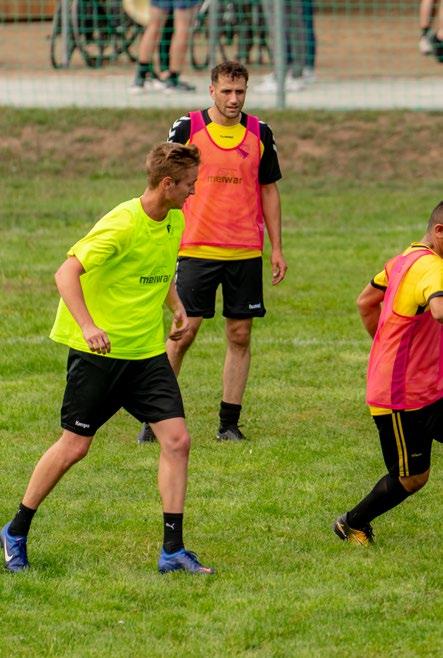
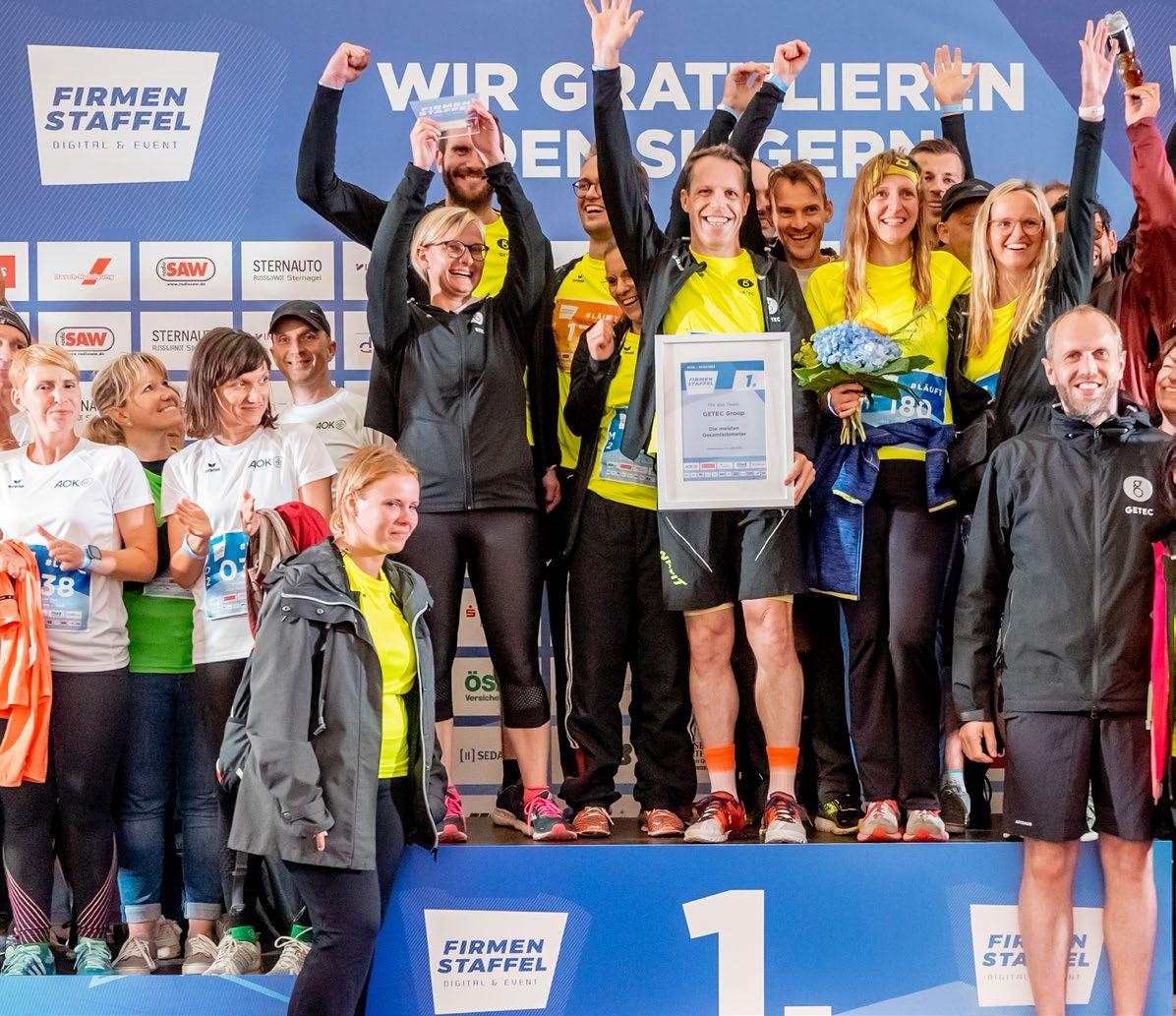
 The boss himself swims here: Hendrik van der Ploeg, Managing Director of GETEC PARK.EMMEN, opens the season at the Erica pool in Emmer-Compascuum.
The boss himself swims here: Hendrik van der Ploeg, Managing Director of GETEC PARK.EMMEN, opens the season at the Erica pool in Emmer-Compascuum.
GETEC team members not only deliver a top performance for the company. Each of the platforms has initiatives to encourage employees to do more sport. For example, the employees of Platform Germany – with the support of the other platforms – took first place in two categories of Magdeburg’s Digital Company Relay Race. 262 runners completed more than 39,000 kilometers to achieve this.
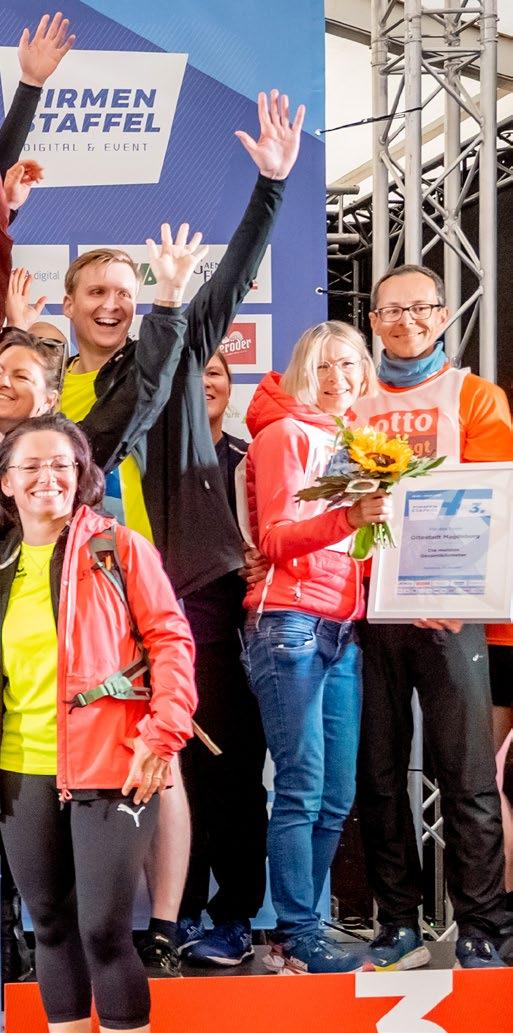
However, GETEC not only supports top athletes. At the GETEC Group sport and summer festival in Magdeburg in 2022, all employees were able to participate in disciplines such as running, volleyball and soccer, at the same time forging new friendships. By contrast, Platform Italy relies on individual motivation and provides employees with a fixed amount that can be used to pay for a gym membership or for other physical activities.
In Switzerland, GETEC has equipped two rooms for various sporting activities. One of the highlights is the spinning course led by employee Jörg Nülken and “Box Fit” training with Arnold Gjerjaj, who is the reigning WBF intercontinental heavyweight champion. Henrik van der Ploeg, Managing Director of GETEC PARK.EMMEN and a passionate swimmer, supports sport in a very creative way. Two swimming pools close to the park are supplied with tank loads of hot but clean process water. This has enabled the private pool operators to keep entrance charges low, despite rising energy costs. And GETEC employees are able to go swimming in the neighborhood.



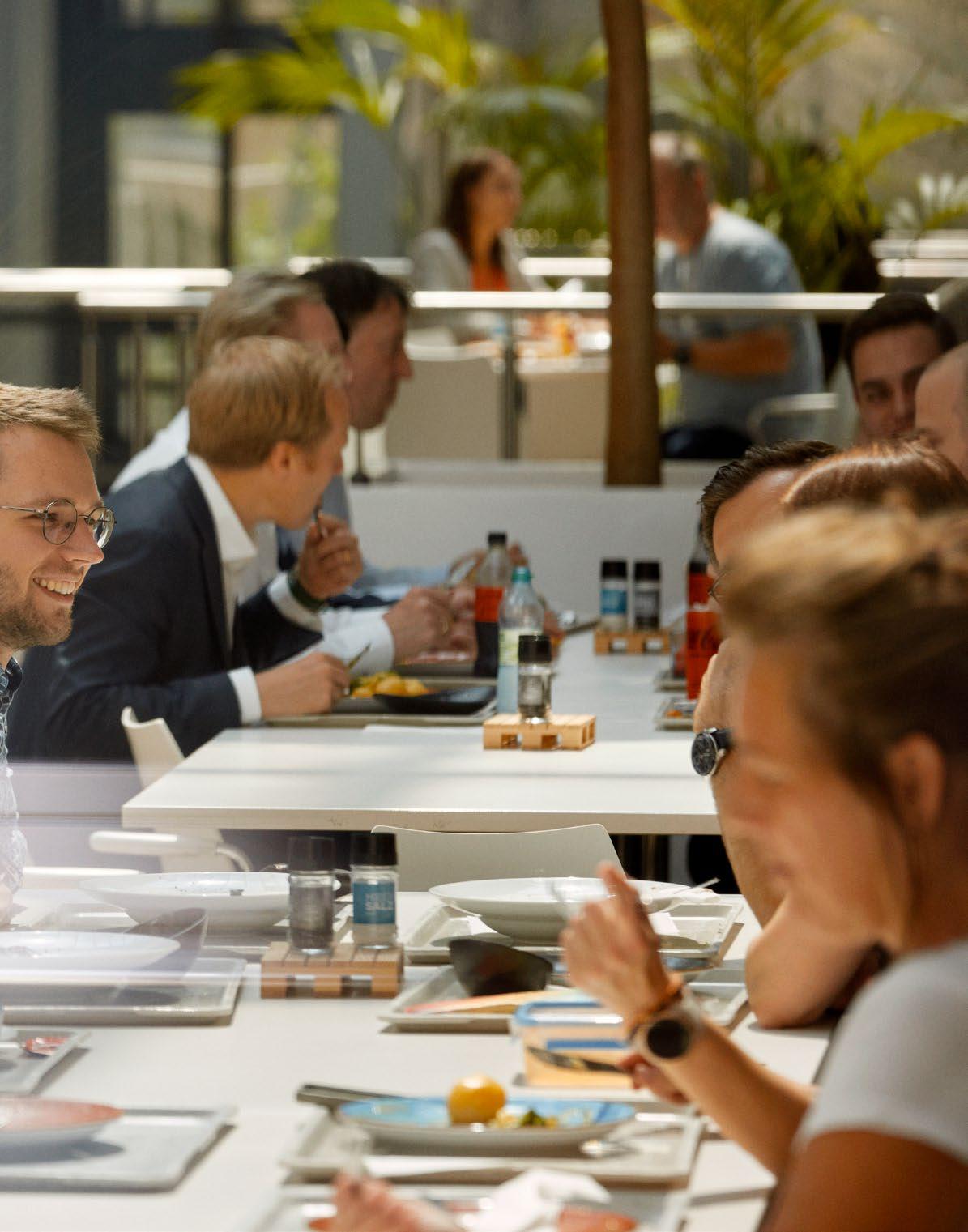
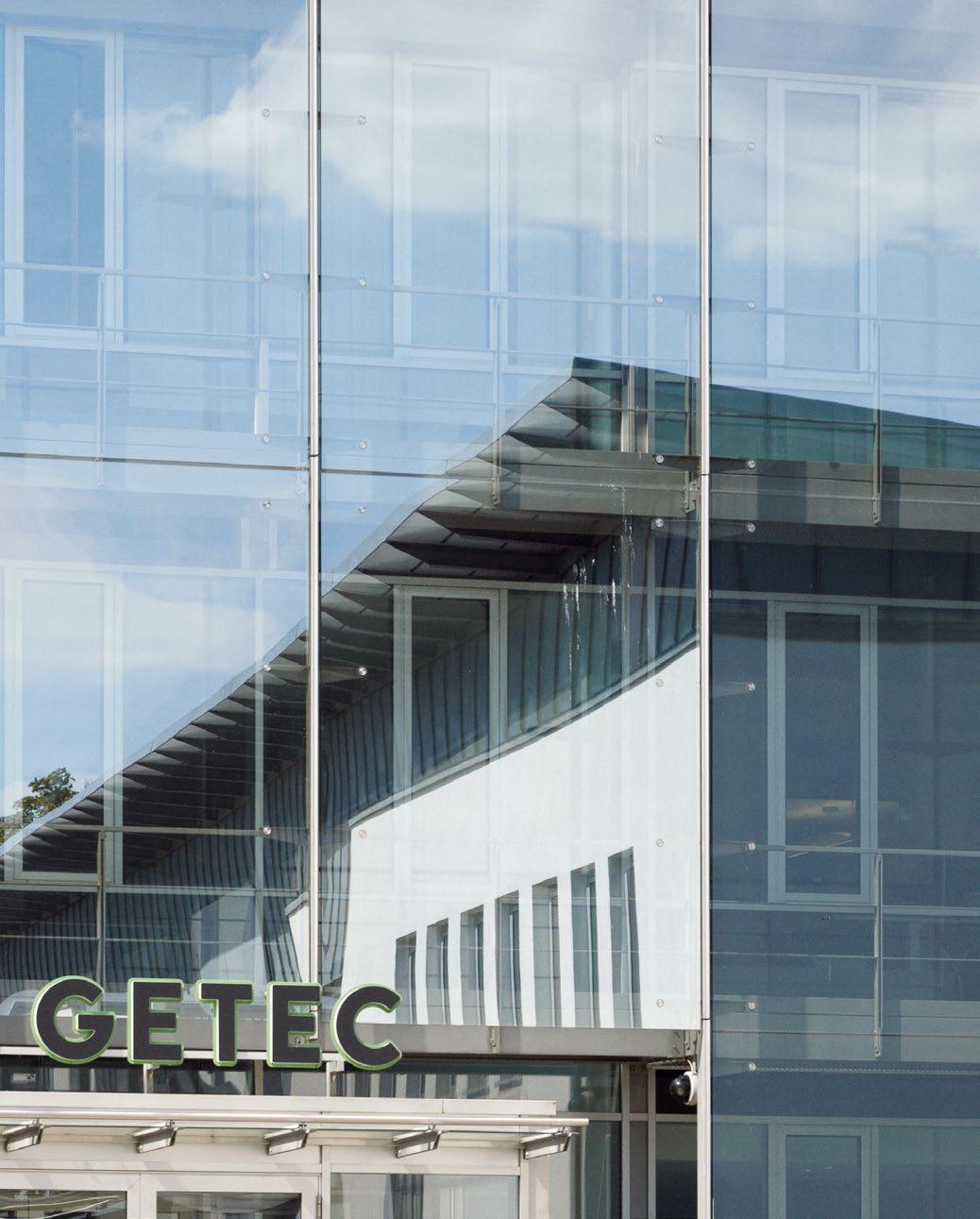
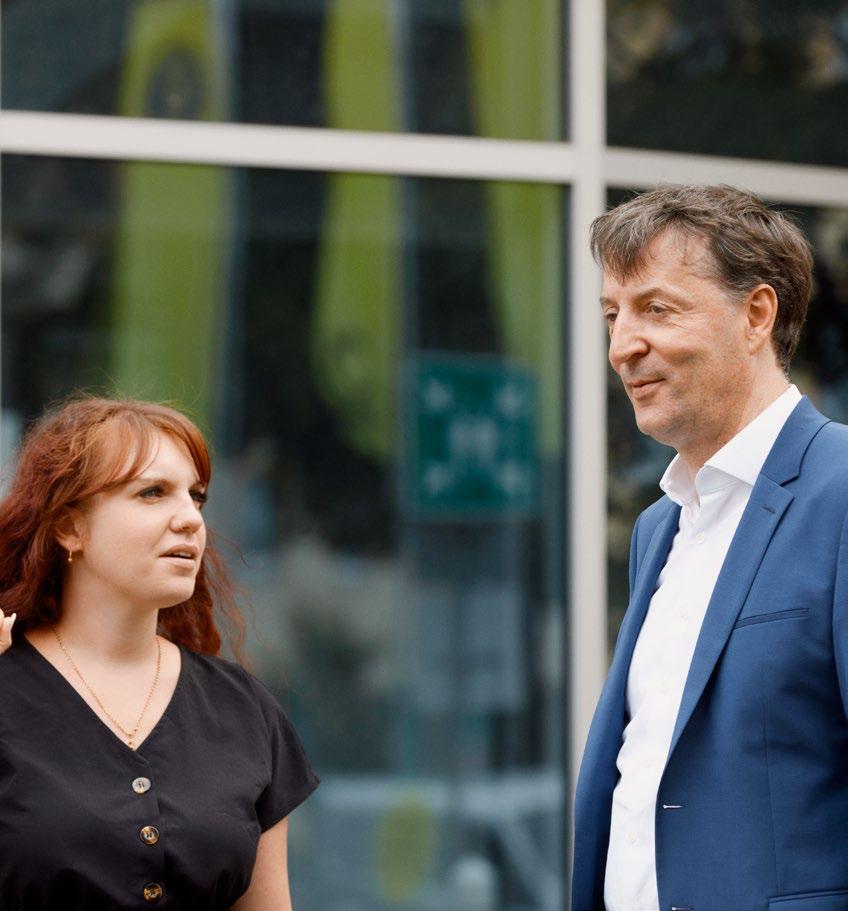
Sustainability is growing in importance, especially as a result of the EU’s Corporate Social Responsibility Directive (CSRD) which has the goal of raising corporate sustainability reporting to the same level as financial reporting. We at GETEC think this is a good thing. At the same time, however, it represents new challenges in terms of corporate governance. In the “Governance” section, we report on how we are addressing these challenges. There were no significant compliance violations and we were able to raise employee awareness compared with the prior year thanks to a higher training rate.
2022 TECHNICAL
0
TARGET FOR 2030
2022
SIGNIFICANT FINES
0
2022
DATA PROTECTION RISKS
0
TARGET FOR 2030
0
TARGET FOR 2030
0 0
Focus on a strong compliance culture

Training and audit plan
Annual confirmation of compliance with the Code of Conduct
Established compliance organization with SpeakUp system and living processes
Risk assessment of countries and industries
Guideline for sustainable procurement
Minimum requirements for procurement processes

OUR GROUP HEAD OF ESG, LIZA STEUDLE, PROVIDES A BRIEF OVERVIEW OF THE CSRD AND WHAT GETEC IS DOING TO IMPLEMENT THIS NEW SUSTAINABILITY REGULATION.
Scientific facts demonstrate why we must prioritize the development of a sustainable economic and finance system. Across the world, we are living beyond our means and will soon be consuming the resources of three Earths each year. As a result, the natural cycle is unable to regenerate quickly enough to survive in the long term. Another frustrating fact is that the existing voluntary commitment to sustainable living and management has shown too little effect, despite all individual efforts. That is why the European regulator is seeking to accelerate the development of a sustainable economic and finance system by introducing a range of new directives and guidelines.
We formally established ESG as a topic within our organization in 2017. However, GETEC had implemented a sustainable strategy long before there were regulations requiring companies to operate sustainably. To put it very simply, we are attempting to replace “dirty” technologies in our plants with “clean” technologies. In the case of new construction projects, we aim to use the most sustainable solution from the start. And because we never lose sight of costeffectiveness, we were and still are particularly attractive to those investors looking to invest in sustainable companies. We believe this balance is the key to our success.
One of the most important EU regulations is the new Corporate Sustainability Reporting Directive (CSRD), which aims to place sustainability information on a par with financial reporting. The goal of the CSRD is to achieve a high degree of transparency about the way companies operate, their commitment and the assumption of responsibility for the transformation of the economy. Through the CSRD, the European Parliament requires companies to disclose their sustainability targets and transitional plans in accordance with the Paris Climate Agreement in a manner that ensures comparability.
In the future, sustainability information is to be disclosed in a company’s management report on the basis of a uniform EU reporting standard. On behalf of the EU Commission, the European Financial Reporting Advisory Group (EFRAG) has adopted cross-sector European Sustainability Reporting Standards (ESRS) by means of a delegated act.
In parallel, EFRAG is preparing sector-specific EU reporting standards as well as standards for publicly listed SMEs affected by the CSRD and third-country companies for implementation by the end of June 2024.
Under the CSRD, around 15,000 companies in Germany – including GETEC – will be subject to reporting requirements. Sustainability information is to be integrated into companies’ annual reports (management report) and will become an important element of this reporting. Therefore, it will also be subject to mandatory external auditing. As a result, GETEC is now undergoing an extensive transformation. Whereas GETEC’s use of environmentally friendly technologies has been a matter of course for many years, it must now meticulously record consumption data
Europe-wide. We have already made great progress here compared with earlier years. Other departments are also working on implementing the CSRD. This year, Procurement is introducing controls relating to Germany’s Act on Corporate Due Diligence Obligations in Supply Chains and digitalizing processes. Human Resources is also aiming to extend its day-to-day use of sustainable KPIs. And lastly, the Sustainability department has grown from one to three employees in order to manage the greater complexity.
As a result of the CSRD, the principle of double materiality is gaining importance in relation to sustainability management. A double materiality analysis gives companies and their stakeholders a complete picture of the impact of a company and its operations from several perspectives. It is a robust and widely used tool for determining the significance and relevance of sustainability issues to a company.

In the first instance, a company should focus on the topics it considers to be material. But what does material mean exactly? There are a number of different interpretations which also affect the reporting standards. With the upcoming restructuring of sustainability reporting in accordance with the CSRD, two perspectives must be considered with regard to double materiality:
Ecological and social materiality
(inside-out perspective)
The inside-out perspective examines a company’s impact on sustainability topics, e.g. its contribution to climate change, which is why it is referred to as impact materiality.
Examples
• Environment: Greenhouse gas emissions, water consumption, air pollution, biodiversity
• Social: Occupational health and safety, working conditions, employee rights
• Governance: Corruption, bribery, human rights
Impact on
Companies, finance
Financial materiality
(outside-in perspective)
The outside-in perspective examines the impact of external topics on a company and its financial results, e.g. in the form of stakeholders’ expectations or arising from technological change. For this reason, it is also referred to as financial materiality.
Examples
People, environment, climate
• Environment: Adaptation costs for climate change, insurance costs, raw material availability and prices
• Social: Population structure, change in values, migration
• Governance: Political regulation, conflicts in supplier countries, equality
The materiality analysis is nothing new for GETEC. However, the principle of double materiality requires the switch from a monodimensional to a multidimensional analysis. This process is already ongoing and will be completed by the end of 2023. We will present our double materiality in the 2024 report.
The relevance of the materiality analysis has increased massively. It has now become the starting line that every company must cross before it can start its reporting. The materiality analysis is highly complex and the assessment of impacts on and by the company are closely linked with risk management.
The materiality analysis process not only creates an understanding of what needs to be done with which priority but also represents a simplification because it clarifies what justifiably does not need to be done.
The CSRD sounds complex and it is. But the effort is worthwhile. The intensive analysis of sustainability aspects and their impacts on and by the company will strengthen our future viability, highlight the dependence of our own business model on certain topics and deliver sound strategic impulses. The analysis provides the company with clarity as to which sustainability topics actually impact its own business model, where negative impacts of its business activities must be reduced and where it can deliver
a positive impact for the environment and society. As a result, the company can set clear priorities and implement effective measures. Therefore, GETEC does not see the CSRD as just a reporting tool but as an indicator of fields of action that need to be addressed and of strengths that can be built on.

As a result of GRI Standards Update 2021, which we are applying for the first time in this present report, the formal presentation of compliance has changed. The former topical standards GRI 307 (Environmental Compliance) and GRI 419 (Socioeconomic Compliance) are no longer applied. Nevertheless, we have retained the separate presentation of these two
In its Code of Conduct (CoC), GETEC undertakes to observe applicable compliance regulations and thus conduct itself in a legally compliant manner, to ensure that the company and its employees comply with the law and internal regulations, and to act with integrity, honesty and in line with business ethics. Hereinafter, compliance refers to all measures introduced and implemented by GETEC to ensure the legally compliant and honest conduct of our business activities and the corresponding conduct by our employees. We believe that our company’s success depends on a strong and sustainable compliance culture that is based on the company’s corporate and risk culture and the tone from the top, supported by an effective system of incentives and sanctions. Ultimately, compliance serves to protect our company – in the case of a violation of the applicable regulations –against often far-reaching consequences and also to protect the company’s employees with responsibility from imprisonment or fines; in the event of a violation, it also avoids disciplinary action up to and including dismissal.
Corruption, fraud and other financial crimes in particular may undermine the confidence of investors and other stakeholders in our company, result in criminal proceedings and fines and jeopardize the company’s growth and innovation. German law (section 299 of the German Penal Code – StGB) not only prohibits bribery of government representatives but also in private business transactions. Therefore, sanctions may be imposed on anyone who grants or receives benefits in return for unfair advantage or a breach of duty vis-à-vis the company, i.e. a breach of the duty of loyalty to the employer, the customer or the company.
Especially in respect of socioeconomic compliance, ethical conduct is essential for our company because our business success largely depends on our market reputation. The compliance measures we have implemented serve to identify or prevent any violations of laws and regulations and thus, in particular, criminal and civil law risks (fines or claims for damages), as well as competitive disadvantages resulting from reputational harm or exclusion from tenders. A condition for participating in private or public tenders is the submission of statements concerning compliance with eth-
Our Code of Conduct (CoC) governs how we behave vis-à-vis our environment and how we seek to act in a legally compliant, moral and ethical manner. The CoC is described in detail in the ESG Report 2022, page 108
All our employees are obliged to familiarize themselves with the CoC. The Code of Conduct applies to the platforms in Germany, the Netherlands and Switzerland. The Italian platform has its own CoC, which is to be aligned with the Group CoC. In addition, each platform has its own internal guide-
compliance topics because they are material to GETEC and require detailed description. We will either add the additional disclosures required by the new GRI 2 standard or, if this information was already reported in previous years, mark it accordingly.
ical business standards. As compliance violations elsewhere in the supply chain may also reflect on us, we require our business partners to ensure the observance of compliance regulations for the duration of our business relationship.
In summary, upholding statutory, contractual and internal requirements and preventing corruption, money laundering and the financing of terrorism are of great importance in the business development of a company like GETEC and in protecting our employees.
Safety, environmental protection and respect for our environment are an essential part of our corporate philosophy. Each day, we reduce the burden on our environment thanks to the way we operate. Our goal is:
• to cause no accidents,
• to avoid health hazards and
• to cause no environmental damage.
For a company in our industry, environmental compliance is therefore another essential requirement in ensuring a functioning business model. Environmentally relevant laws must be observed. In day-to-day business decision-making, we seek to avoid negative impacts on nature and the environment so that no significant environmental pollution or consequences for human health or diversity occur. Failure to achieve this may lead to fines, sanctions or environmental damage. The latter may also endanger people and thus violate human rights.
GETEC’s corporate ambition is for its operations to have a positive impact on the environment and society and to contribute significantly to making a difference for the generations to come. GETEC recorded no significant compliance incidents during the reporting year. The company’s operations resulted in a further reduction of GHG emissions. In all respects, the company acted in accordance with its Code of Conduct. We protected and respected human rights as described in our Human Rights Policy and Code of Conduct.
lines to supplement the Code of Conduct. These cover signing powers, data protection, purchasing, donations and sponsorship, travel, gifts and invitations, in particular. They can be found on the intranet and should be studied regularly, alongside the CoC.
However, we do not believe that our corporate responsibility is restricted just to our company. We expect compliant conduct from our suppliers as well. Our Supplier Code of Conduct (SCoC) directly addresses them and
communicates our understanding of fair treatment and compliant conduct in the supply chain. The SCoC is described in the ESG Report 2022, page 110
Our SCoC applies to the platforms in Germany, the Netherlands and Switzerland. The CoC for the Italian platform also applies to its suppliers. It is still to be harmonized with the Group’s CoC. GETEC has been working with a supplier management system since the start of the year. With the help of this software, GETEC performs a continuous risk analysis of its largest and most important suppliers in respect of the requirements of Germany’s Act on Corporate Due Diligence Obligations in Supply Chains (LkSG). This includes the acceptance of our SCoC.
The anticorruption code applied by our platform in Italy is considered to be best practice. It is integrated into an organic and coherent system in order to prevent the risk of unlawful practices by management and all other functions. The anticorruption code is described in the ESG Report 2022, page 112
When it comes to environmental compliance, GETEC is subject to various technical and environmental regulations. The company’s activities must be designed and managed in such a way as to minimize or prevent pollution and health impacts. Our approach to HSSE is defined in various guidelines and policies for HSSE, environmental protection, occupational safety (including our 360° Safety Culture) and energy. It applies to all consolidated GETEC Group companies on all regional platforms. Due to regional requirements, each platform is subject to different laws.
Detailed documentation has been produced for our plants, covering their safety installations and protective measures. In compliance with legal requirements, there are also extensive operating and process instructions for handling hazardous substances (safety data sheets). These describe protective measures and rules of conduct. We also expect our partner companies to have a functioning environmental compliance program and require their compliance with all applicable environmental, occupational health and safety regulations.
The EU’s Renewable Energy Directive (RED II) was also relevant in 2022. This Directive anchors the sustainability criteria for biomass in EU law and defines, for example, legal harvests, the preservation of soil quality, improvements in production capacity, biodiversity and the respect of protected areas. It concerns combined heat and power plants fueled by biomass and biogas plants, depending on the output, suppliers and biomass dealers. If a company does not have a RED II certificate for its plant, it risks the proportional loss of its EEG feed-in remuneration. The EU is already discussing RED III, which will include restrictions on the use of biomass. We will add the relevant aspects to our supplier audits at the appropriate time.
When employees join the company, they must participate in compliance training. Annual refresher courses are also held. Team meetings additionally include Compliance Moments, which aim to raise employee awareness of the subject.
Our compliance management system is described in the ESG Report 2022, pages 106/107. The process presented there also satisfies the requirements of GRI 2-25-b and c.
Each and every employee can seek advice on the implementation of our guidelines and practices for responsible business conduct. Various options are available: All compliance units – whether at platform or Group level – can be contacted on compliance issues. The platforms in Germany and Italy each have their own compliance officer whereas the platforms in the Netherlands and Switzerland use lawyers who are responsible for compliance issues in the respective country. Moreover, all employees are obliged to familiarize themselves with the Code of Conduct, consulting their supervisor for guidance if necessary. Questions may also be asked during regular compliance training sessions. During the Compliance Moments at team meetings, any incidents are discussed and employees are reminded of the significance of compliance and the Code of Conduct. The platforms’ compliance officers regularly query the possible occurrence of incidents.
When recognizing our SCoC, our suppliers may ask the compliance officers any questions they have or ask for advice. The recognition process is managed by Group Procurement.
Any employee can report compliance concerns via our whistleblowing system. More information and explanations about the whistleblowing system can be found in the corresponding policy. In the course of 2023, the GETEC Group will be switching to a software-based ombudsman system that allows both external and internal whistleblowers to submit anonymous reports of human rights violations in their own business areas or by indirect and direct suppliers.
Submitter checks SpeakUp
• by phone
• via the internet
The submitter
• leaves a new phone or web message in their own language
• attaches a document
People Intouch processes the message
• transcription and/or translation into English
People Intouch processes the message
• transcription and/or recording in submitter’s language
The Group’s independent compliance organization reports directly to the Group CFO. In certain special cases, the Group Compliance Officer also has the option to forward critical issues to the Chair of the Risk and Audit Committee, one of the three committees of the Advisory Board, the company’s highest governance body.
In the 2022 reporting year, a total of 30 critical cases were reported relating to various aspects of the CoC. One of these cases was discussed by the Advisory Board.
A conflict of interest is a situation in which one or more natural or legal persons have conflicting interests and the pursuit of one interest might harm another interest. This may involve a violation of legal or supervisory obligations or duties of loyalty, unethical conduct or an impairment of a natural person’s professional judgment or objectivity. If a conflict of interest is not identified and managed in a suitable manner, this may result in disproportionate or disadvantageous consequences for GETEC, its employees and other stakeholders such as reputational damage, damage to customer relationships, regulatory sanctions and the risk of litigation.
Organization
• receives message
• confirms receipt
• requests further information
In the 2022 reporting year, further compliance training for the Group’s managers was tested. Moreover, new training tools for all employees are being introduced in 2023.
The most important obligations of GETEC’s Advisory Board members in respect of conflicts of interest are described below:
The members of the Advisory Board must always act in the interests of GETEC and ensure that processes are available to identify and prevent conflicts of interest. They are responsible for ensuring that business decisions are not affected by conflicts of interest and must therefore:
- act on their own initiative to identify conflicts of interest in connection with their position as an Advisory Board member and disclose such conflicts of interest; and
- refrain from any action that might disadvantage GETEC. Material conflicts of interest must be documented appropriately and reported to the Advisory Board for discussion and resolution at its meetings.
Compliance
(early warning system for whistleblowers and case managers (Whistleblower Protection Act))
SpeakUp whistleblowing system: see graphic
• GETEC has introduced whistleblowing systems such as SpeakUp but does not have personnel at all geographical locations to handle the cases. For this reason, the Group Executive Committee has decided to use an external service (ombudsman) to handle reported cases in accordance with local whistleblowing legislation and the new requirements.
• Supplements proven reporting channels
• Reports can be submitted by phone or electronically
• Option for especially sensitive cases
• Detailed instructions
• Anonymity guaranteed because third-party service
Supply chain (sustainable procurement)
Sustainable procurement of materials and services
• Procure materials and services in accordance with all applicable laws and regulations as well as our own policies
• Guideline for sustainable procurement for Platform Germany:
- Applies to the Technical Procurement department (excluding the procurement of energy and fuel)
- Mandatory for all employees
- Provides guidance for integrating sustainability aspects in procurement decisions
• In addition: the instruction “Minimum requirements for procurement processes” (covers requirements for tenders, negotiations with contractors, awarding contracts, approving suppliers, contractual requirements and document obligations)
Supply chain (Act on Corporate Due Diligence Obligations in Supply Chains)
Germany’s Act on Corporate Due Diligence Obligations in Supply Chains comes into force in 2023, with the goal of improving the protection of human rights in global supply chains. GETEC will be implementing the requirements of this legislation from 2024. At the start of 2023, we introduced a new software which enables GETEC to comply with ESG requirements, manage ESG-related risks and improve sustainability in the supply chain.
Socioeconomic compliance (anticorruption) Certification to ISO 37001:2016 – Anticorruption
Customer compliance (customer satisfaction)
Supply chain (sustainable procurement)
Review and implementation of the customer satisfaction assessment and monitoring process
Sustainable procurement of materials and services:
• Procurement of materials and services in accordance with all applicable laws and regulations as well as our own policies
• Mandatory acceptance of the SCoC by suppliers with an annual volume of more than €100,000
• Regular HSE audits of subcontractors
system (supplier assessment)
of the supplier system to improve supplier assessment through the implementation of SAP S/4 hana
Compliance (recording of compliance violations)
Compliance (Code of Conduct)
Compliance (compliance training)
Use of the whistleblower system that is available in the respective national languages
Presentation and approval of the GETEC Supplier Code of Conduct
Ethics and anticorruption training
We describe our management of non-compliance with the provisions of the SCoC and our country and industry risk assessment, including the measures taken, in the ESG Report 2022, pages 110/111.
Established
All key suppliers (> CHF100,000) signed the ScoC in 2022
All employees completed the training in 2022
Environmental compliance is largely the responsibility of the regional platforms. They are required to work toward the continuous improvement of their HSSE performance and measure this on the basis of targets. The management approach and all action plans are discussed in the ESG Report 2022, pages 102 to 104
• Environmental management system certified to ISO 14001
In addition, Platform Germany holds regular environmental meetings. These review and monitor compliance with threshold values and discuss specific countermeasures in the event of violations. Moreover, the responsible authorities conduct regular plant inspections as well.
For Platform Germany, the following environmental issues, laws and regulations are relevant.
• Emission control: Monitoring of existing plants that require a permit under Germany’s emission control legislation, plants as defined in the 42nd and 44th Ordinances on the Implementation of the Federal Immission Control Act
• Preparation of permit procedures, monitoring plans and emission reports in accordance with Germany’s emission control legislation
• Reporting, for example, renewable energy levy, self-supply with energy, energy statistics
• Preparation and submission of emission statement in accordance with the 11th Ordinance on the Implementation of the Federal Immission Control Act
• Preparation of applications and support for necessary modifications to existing plants that require a permit under Germany’s emission control legislation
• Performance of permit procedures and preparation of application documents (permits for new plants in accordance with the 4th Ordinance on the Implementation of the Federal Immission Control Act and permits for modification in accordance with section 16 of the Federal Immission Control Act)
• Environmental management system certified to ISO 14001
• Transport of chemicals, oil or fuels by qualified subcontractors
• Chemicals are stored in retention tanks
• Safety data sheet for each chemical
• Operating instruction for the use of chemicals (including environmental section)
• Updating of the “Reporting and analysis of incidents” template
• An integrated management system in accordance with ISO 14001, ISO 45001 and ISO 9001 has been implemented at Platform Switzerland to ensure a legally compliant organization.
• The weekly HSE 360 Degree Meeting is organized by the CEO of Platform Switzerland and supported by HSEQ. The heads of all operational departments track and monitor all HSE-relevant measures and analyze all incidents and accidents which occur at the platform.
• In 2022, the additional Daria exhaust system connection was commissioned to reduce emissions of environmentally hazardous substances due to safety switches in the site exhaust system.
• The site inspections and the refurbishment program of the retention basins for hazardous substances were continued in 2022. The target of 12 refurbishments was successfully attained.
• Environmental management system certified to ISO 14001
• Various safety precautions for employees, visitors and contractors are documented in the handbook of applicable rules and regulations.
• Regular ADR inspections are performed (at supply and logistics companies) and annual ADR reports are produced (no reportable incidents).
• Various regulations and processes to ensure environmental safety, for example, spill control (laboratory and logistics), handling hazardous waste, handling logistics-related damage and incidents, storage of hazardous substances in accordance with Dutch regulation PGS 15
• Complaints process exists
• Environmental reports are recorded in the incident registration system.
Information about tracking the effectiveness of the compliance measures taken can be found in the ESG Report 2022, page 105 for environmental compliance and page 114 for socioeconomic compliance, in accordance with the existing GRI 103-3 (evaluation of the management approach). Supplier audits round off our tracking of effectiveness. We are currently reviewing whether to integrate the new supplier management system into the audit process since it has an extensive database covering the listed suppliers.
2022:
30 cases reported, of which 27 were concluded
No reports via the whistleblowing system
External compliance-related costs: approx. €24,000 (2021: approx. €5,000)
Dismissal by employer due to compliance violations: 0 (2021: 1)
We are targeting zero compliance cases in 2023.
The training rate increased again compared with a year earlier. Whereas only 80 percent of Group employees completed training in 2021, we again raised the rate to more than 86 percent in 2022 thanks to a special compliance training course. Nevertheless, our goal remains a rate of 100 percent. The training gap was primarily attributable to changes in the workforce and the introduction of a new online training system in Italy that was not available to all Platform Italy employees by the end of the year. In 2023, new and improved training modules will be introduced in Italy and for the other platforms.
In the event of non-compliance with SCoC regulations, business partners must take immediate remedial action. We reserve the right to terminate agreements with business partners who are unable to verify their compliance with this SCoC in the course of a review (audit, assessment). Since 2020, suppliers have been gradually accepting the SCoC. The start was made in 2020 with Platform Germany and its top suppliers. In 2022, 87 percent of the Group’s main suppliers had already accepted the SCoC. It remains our goal to ensure acceptance by all suppliers by 2030.
There were no significant violations of laws and regulations during the reporting period and no fines were imposed.
In the case of compliance topics, the stakeholders are involved in line with our stakeholder management system, which is described in the ESG Report 2022, pages 28 and 29. Any compliance issues concerning external stakeholders such as customers, suppliers or local authorities are addressed and handled in indirect or direct meetings. Compliance issues concerning internal stakeholders such as our employees are dealt with at regular meetings, by monthly queries or additionally via the whistleblower system.


Our restructured Procurement department is responsible for purchasing goods and services for the Group – with the exception of primary fuels and the associated emission certificates. In 2022, we continued the strategic development of the Procurement department for Platform Germany and established a process and project management system for the entire organization.
Our central product groups are:
• Systems and components for our plants at customers’ sites; examples include components for heating and cooling, electricity generation in boiler and condensation systems, fuel supply, measurement and control equipment
• Construction services and various assembly/dismantling services for the construction of plants
• Services, repair and replacement parts during operation
• IT systems and technology (hardware and software)
• Commercial services and external consultancy services
• Facility management and fleet services
In order to optimize our procurement structures, we pursued the following projects in 2022 or prepared them for 2023:
• We developed an app to create Group-wide transparency of procurement data and the quality of purchase-to-pay (P2P) processes. This software solution is based on a process mining software that digitally maps business processes, thus facilitating the analysis, optimization and monitoring of individual processes. The app also supports expenditure analysis, helping to identify cost levers and savings potential.
• The app was established within Procurement in 2022 and various use cases have been developed. In 2023, we are continuing to work on expanding the app and the following use cases are planned:
- Link to other platforms (first in Switzerland and the Netherlands) in the areas of P2P and Accounts Payable in order to create Group-wide transparency
- Creation of a sustainable spend app (showing the results of the supplier survey and LkSG risk assessments based on the new supplier management system; see below for more information)
- CO2 transparency
• The first product groups have been created and are now being implemented.
• In the reporting year, we successfully created and introduced the risk monitor in Procurement. This, together with a further supplier app, ensures the continuous monitoring of our main suppliers. We are thus able to respond at an early stage to any potential risks, especially the risk of supplier failure. Moreover, the creditworthiness of new suppliers can be checked in advance, as well as their possible inclusion on sanctions lists.
• We are planning to introduce an automated and process-controlled supplier assessment in our order system in 2023.
• The current ESG management system in Procurement is being expanded in the third quarter of 2023 to include, for example, CO2 transparency in procurement activities, which will be displayed by the process mining
software (see above). In addition, all members of our Procurement team will receive external training in CO2-optimized procurement activities. In March 2023, we launched the new supplier management software for LkSG risk assessments and supplier surveys. The first 500 suppliers have been invited to complete the survey. In the future, the results of the assessments and surveys will be visible in all of the aforementioned software systems.
A major part of our supply chain concerns the project business. In the reporting year, the three main projects in the Industrial Segment were:
• PRÜM-Türenwerke GmbH, Weinsheim, Germany: combined heat and power plant fueled by industrial wood residues, incl. waste gas scrubber, redundant boiler, peripherals
• DÖHLER Dahlenburg GmbH, Dahlenburg, Germany: steam generation plant, steam turbine, compression cooling
• Cerdia Produktions GmbH, Freiburg im Breisgau, Germany: combined heat and power plant fueled by biomass
In 2022, the five main projects in the Real Estate Segment were:
• The Metropolitan Park, Berlin, Germany: district development; creation of residential buildings through the conversion and refurbishment of ten existing hospital buildings
• Kandinskyallee 2, Hamburg, Germany: MMB, replacement of micro CHP
• Phrix district, Kirchgrabenstraße, Hattersheim, Germany
• GEE, Westfalenstraße, Düsseldorf, Germany: micro CHP solution, heating network, ten transfer hubs
• Ahornhöfe, Beelitz, Germany: district solution
2022 order volume for new construction:
• Industrial: approx. 900 orders; total volume: approx. €100 million
• Real Estate: approx. 2,900 orders; total volume: approx. €40 million
2022 order volume for operation and service:
• Industrial: approx. 5,500 orders; total volume: approx. €16 million
• Real Estate: approx. 18,400 orders; total volume: approx. €11 million
Total expenditure by our four regional platforms in 2022 was in the tripledigit million euro range (see table for further details).
5,500 suppliers (excluding fuel)
58% new projects
22% operation and service
20% indirect costs
Procurement of primary fuels: GETEC Energy Management GmbH is responsible for procuring primary fuels for the GETEC Group’s regional platform in Germany. The company is also the Energy Management and Energy Markets Competence Center for all of Platform Germany’s marketing units. Most of our energy management suppliers and service providers come from Germany. In the reporting year, around 35 of them worked directly for GETEC Energy Management GmbH and around 250 (mainly biomass suppliers) for other GETEC Group companies. In 2022, we made payments in the triple-digit million euro range to energy management suppliers and service providers. These include, firstly, primary fuel suppliers (natural gas, biomethane, electricity and heating oil), secondly, producers of biomass (wood chips, landscaping products) such as forestry companies and producers of district heating or pulverized lignite, and thirdly, the providers of energy market information, invoicing services or IT services.
2,000 suppliers
40% gas and chemical products
37% contract services
11% materials
Remainder: consulting, general services, IT and telecommunications
540 suppliers
Product groups: contract services, other operations supplies, mechanical products, IT hardware and software, electricals, personnel services, transport, laboratory products, KAM
Suppliers’ headquarters: Netherlands, Romania, Germany, France, Belgium, Switzerland, Ireland
1,000 suppliers
Product groups: raw materials, electricity, gas, plant engineering, coal/heating oil, waste/disposal, cables/grids, building cleaning services, general construction and civil engineering, legal advice, engineering technology, laboratory technology, other services
Suppliers’ headquarters: Switzerland, Germany, Netherlands, Turkey, Italy, Austria, Belgium
In addition, Procurement is in dialog with potential suppliers of renewable energy and hydrogen. We regularly attend major trade fairs in respect of these topics and participate in technical training. Our goal is always to be one step ahead.
GRI 3-3-A. + GRI 3-3-B.
Information is the basis for all business processes and processing information safely is of strategic importance for the GETEC Group.
To us, information security means:
• Operational technologies (OT) such as systems for energy supply plants
• Information technology (IT); data systems to store and transfer information (for example, intranet or customer databases)
• Use of information outside technological systems
• Cybersecurity
• Data protection
In order to ensure the safety of our information and operational technologies, we have developed a large number of guidelines and obligations, for example, for authentication, for back-up and recovery and for protection against malware.
In connection with the introduction of the information security management system (ISMS), specifications were prepared and are described in the ESG Report 2022, page 135
The GETEC Group operates an information security management system (ISMS) because almost all the company’s business processes depend on information and its processing. Information security has the overarching objective of ensuring that the business processes are executed in the way expected by GETEC and its stakeholder groups.
The scope of information security for the entire Group is illustrated by looking at the individual stakeholder groups which interact with the information. We described this in detail in the ESG Report 2022, page 130 In accordance with the previously applicable requirements of GRI 103-1, we focused on the material topic of information security. In some cases, we also discussed the changes required in accordance with GRI Standards Update 2021. An in-depth analysis of the negative and positive impacts on the economy, environment and people – including human rights – will be performed when a new materiality analysis is carried out, also in connection with the CSRD.
In 2022, we introduced the GETEC Cybersecurity Maturity guidelines; see below for further details.
GETEC’S four regional platforms (Germany, Italy, the Netherlands, Switzerland) with their various locations, business models and areas of activity, are managed independently with their own management structure. A platform’s guidelines and policies specify the Group-level requirements for the platform and additional detailed implementation processes.
In the last report, we provided details about the protection targets of confidentiality, integrity and availability, about the options for action of acceptance, reduction, transfer and avoidance and about the responsibility architecture, also for the individual platforms. This information can be found in the ESG Report 2022, pages 131/132
Disclosures about communication channels, the information security management system (ISMS), asset management, risk management and response management can be found on pages 132 to 134 in the ESG Report 2022
The information security management system (ISMS) for Platform Germany was developed in accordance with ISO 27001 and certified in 2022. To date, this certification does not cover our regional platforms in Italy, Switzerland and the Netherlands. However, it is intended to roll the certification out to these platforms as well. We are consistently pursuing and extending the course we have embarked upon so that we can raise the other regional platforms to the same level.
In 2022, we established a uniform Group-wide framework for assessing the maturity of the information security system. The GETEC Cybersecurity Maturity (GCM) framework comprises 153 controls covering organizational and technical measures.
In organizational terms, the scope of application of the ISMS covers the GETEC Group (G+E GETEC Holding GmbH and its direct and indirect wholly owned subsidiaries). It is also applied as far as possible to those subsidiaries
in which G+E GETEC Holding GmbH does not directly or indirectly hold all shares. The managing directors of these subsidiaries appointed by GETEC are required to ensure that the legal entities they manage also comply with these policies.
Whether the measures taken actually serve to achieve the information security targets is assessed by the Information Security Officer (ISO) and the persons with operational responsibility at regular intervals or immediately after the implementation of specific measures. The ISO reports the outcome of these assessments to GETEC’s management.
In order to measure effectiveness, we use the various indicators we defined in the ESG Report 2022, page 136 in accordance with the previously applicable GRI 103-3 (evaluation of the management approach).
6,822 events
1,436 events
22 incidents
5 emergencies 0 crises
All employees are expected to participate actively in the further development and improvement of the ISMS by contributing reports, information and suggestions. They can submit such information informally via the established ticket systems for the individual IT units. These tickets are forwarded to the Information Security department for further processing. This
1 emergency
8 incidents (PROCESS FAILURES)
0 crises
also applies to any third parties involved, such as service providers working on behalf of GETEC. In 2022, it enabled us to eliminate discrepancies in the specifications for cryptographic measures and deviations from the authentication specifications.
KPIs for Platform Germany (including Platform Switzerland)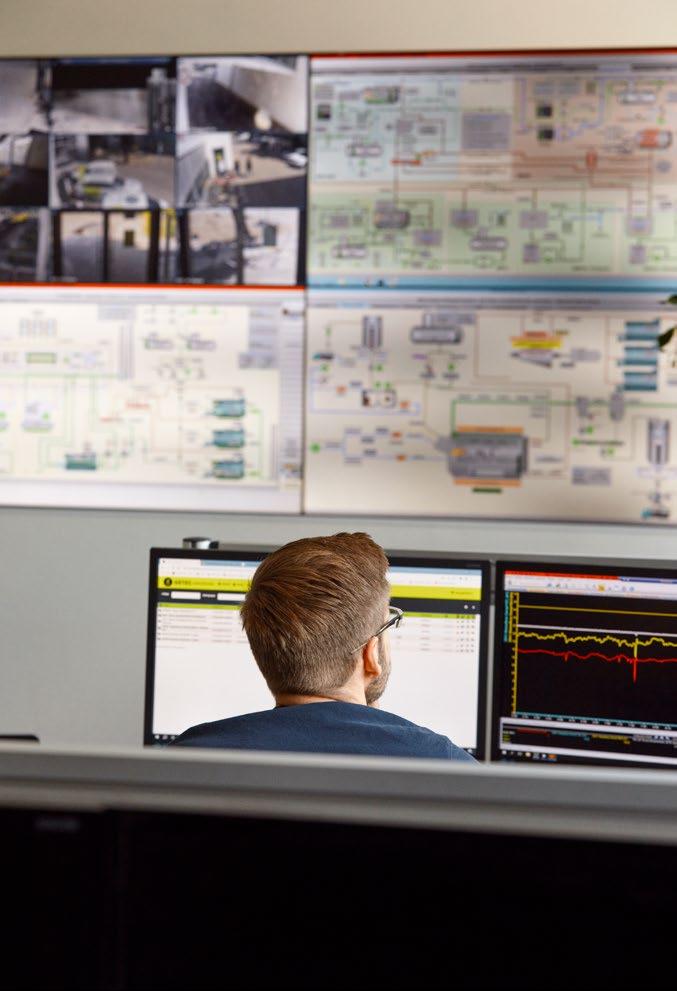
FROM 2024, GERMANY’S ACT ON CORPORATE DUE DILIGENCE OBLIGATIONS IN SUPPLY CHAINS WILL ALSO APPLY TO GETEC. WE ALREADY SATISFY THE COMPLEX REQUIREMENTS OF THIS LEGISLATION. HEAD OF PROCUREMENT ROLAND GERTZ AND PROCUREMENT MANAGER MICHAELA ROSTAM EXPLAIN HOW THE COMPANY PASSED THIS STRESS TEST.
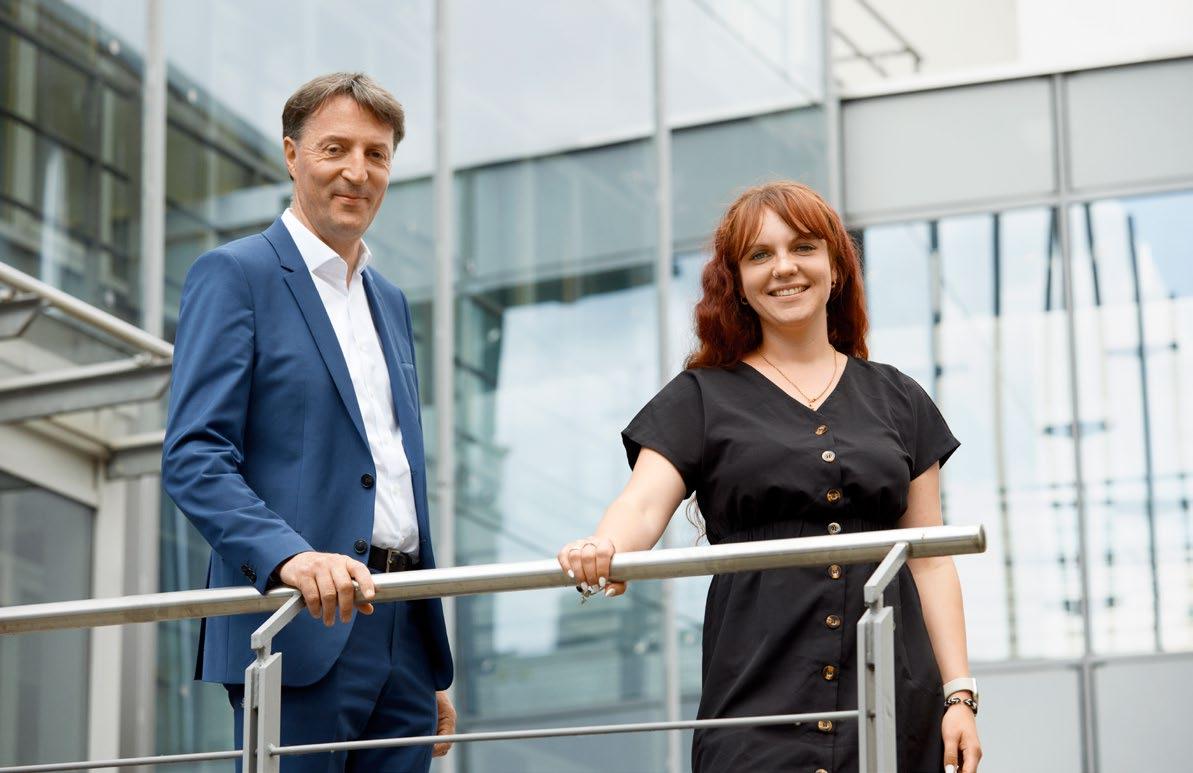
SIMPLY PUT: WHAT IS GERMANY’S ACT ON CORPORATE DUE DILIGENCE OBLIGATIONS IN SUPPLY CHAINS?
Companies in Germany are responsible for ensuring that their suppliers respect human rights and environmental protection law. Germany’s Act on Corporate Due Diligence Obligations in Supply Chains (LkSG) governs exactly how
this should be done. However, these obligations do not yet apply to all companies. Since January 1, 2023, companies with at least 3,000 employees in Germany must implement the provisions of the LkSG; from January 1, 2024, this requirement will also apply to companies with more than 1,000 employees. GETEC will already satisfy the requirements of the LkSG this year, although it is not legally obliged to do so until 2024.
For all companies, including us, the LkSG is associated with substantial effort such as the obligation to report the measures taken to comply with the due diligence requirements. This requires a rapid change of perspective by employees and the expansion of our risk management system. Added to this is the need to define responsibilities within and outside the company and for further training and intensive internal communication. Valid data must be recorded for the mandatory risk assessment. This is also complex, especially for companies with international operations. All of these time-consuming and not always self-explanatory activities are resulting in significant stress for us and probably also for most other German companies.
We began the design phase at the start of the year and developed a detailed concept. The resulting responsibilities are now anchored within the organization. The LkSG compliance process is covered by a new procurement policy
that has been published and communicated. However, process digitalization is the key to effectiveness. We have found good solutions for this as well.
With the aid of our new supplier portal, we perform a continuous risk assessment of our largest and most important suppliers. The same tool is used to document the measures (remedial and preventive measures) and for reporting. We have already concluded the risk assessments for the first 500 suppliers.
In addition, we will be replacing our current “SpeakUp” whistleblowing system with a new software solution that meets the Group’s current requirements. The new software allows both external and internal whistleblowers to submit anonymous reports of human rights violations in their own business areas or by indirect and direct suppliers.
The third tool is the process mining software that is used to visualize the results of all supplier risk assessments by all members of our Procurement team. In this way, the results can be incorporated into every procurement process and observed.
Thanks to its innovations and sustainable business models, GETEC is a leader in the energy transition. This leadership position brings with it a responsibility to be active in the political and social environment, to provide information and to defend the company’s positions. In order to exercise this responsibility, GETEC is a member of various associations which, depending on the industry they serve, may give us close proximity to our customers. The company also maintains contact with political institutions. At the same time, GETEC satisfies all compliance-relevant requirements, for example, the transparency regulations concerning the newly introduced German Parliament (Bundestag) Lobby Register that have applied to Platform Germany since early 2022.
GETEC association memberships
BBA-Akademie der Immobilienwirtschaft e. V.
Bundesverband der Immobilienverwalter e. V. BVI
Bundesverband freier Immobilien- und Wohnungsunternehmen e. V.
Bundesverband für Materialwirtschaft, Einkauf und Logistik
Bundesverband mittelständische Wirtschaft e. V. (BVMW)
Business Club Frankfurt 2017 e. V. Germany
Chemport Europe
Creditreform MD Harland KG
DEBV Deutscher Brownfield Verband e. V. Germany
Deutsche Unternehmensinitiative Energieeffizienz e. V. DENEFF
Die Wohnungswirtschaft Deutschland, GdW
ECSPP
EHI Retail Institute e. V.
eid Evangelischer Immobilienverband Deutschland
Forum Contracting e. V.
Frauen in der Immobilienwirtschaft
Grüner Wirtschaftsdialog e. V.
Industrieclub Magdeburg e. V.
ivh-Industrieverband Hamburg
LOG-IT Club e. V.
NPAL
NVDE
Ondernemend Emmen
Netherlands
Netherlands Netherlands
Österreichischer Biomasseverband Austria Germany
Powerloop Switzerland Switzerland
Project 6-25
Netherlands Netherlands
SBD Netherlands Netherlands
Stadtmarketing “Pro Magdeburg” e. V.
Germany Germany
Stichting FC Emmen Naoberschap Netherlands Netherlands
SWISSESCO Switzerland Switzerland
VDIV Deutschland Germany Germany
VdWg Verband der Wohnungsgenossenschaften Sachsen-Anhalt e. V.
Germany Germany
VEMW Netherlands Netherlands
Verband der Immobilienverwalter Baden-Württemberg e. V.
Verband der Immobilienverwalter Bayern e. V.
Verband der Immobilienverwalter Hessen e. V.
Verband der Thüringer Wohnungs- und Immobilienwirtschaft
Verband der Wohnungswirtschaft Sachsen-Anhalt
Verband Sächsischer Wohnungsgenossenschaften e. V.
Verein IG-Holzkraft
VIK – Verband der Industriellen Energie- und Kraftwirtschaft
VNW Verband norddeutscher Wohnungsunternehmen e. V.
Wenb
Westwinkel
Germany Germany
Germany Germany
Germany Germany
Germany Germany
Germany Germany
Germany Germany
Austria Germany
Germany Germany
Germany Germany
Austria Germany
Austria Germany
GETEC association memberships
Wirtschaftskreis Mitte e.V.
Wirtschaftsrat der CDU
ZellCheming, Verein der Zellstoff- und Papier-Chemiker und -ingenieure
Zentralverband Deutscher Milchwirtschaftler e. V.
ZIA Zentraler Immobilien Ausschuss e. V.
ZNU – Zentrum für Nachhaltige Unternehmensentwicklung
Country Platform
Germany Germany
Germany Germany
Germany Germany
Germany Germany
Germany Germany
Germany Germany
Name of initiative Brief description Support since Group/Platform
UN Global Compact
For years, GETEC has been committed to the principles of the UNGC and the 17 SDGs. It became a UNGC participant in 2022.
2022 Group
2021 Group ZIA campaign:
Diversity Charter As a signatory to the Diversity Charter, GETEC supports recognition, appreciation and diversity in the workplace.
“Wir geben Leben Raum” (We give life space)
GETEC is a member of the structural transformation task force of the Zentraler Immobilien Ausschuss (ZIA, German Property Federation) and a co-developer of the campaign. This is aimed at the main areas of community and diversity, housing, climate protection and work so it has a strong sociocultural message.
DENEFF The Deutsche Unternehmensinitiative Energieeffizienz e. V. (the German Industry Initiative for Energy Efficiency) is a cross-industry network of pioneering companies and organizations dedicated to an ambitious and effective energy efficiency policy. The aim is to create the right political framework to improve energy efficiency, stop climate change and create a future worth living in and a growing market for the products and services offered by the energy efficiency sector.
New Energy Coalition – Hydrogen Valley
GETEC is a member of the New Energy Coalition, which is establishing a functioning network of green hydrogen projects in the north of the Netherlands (Hydrogen Valley). The region’s application for funding from the European Commission’s Fuel Cells and Hydrogen Joint Undertaking (FCH 2 JU) has been approved. The six-year HEAVENN project started in January 2020.
ZNU Support for partners in the “ZNU goes Zero” initiative for reducing energy-related CO2 emissions
ProQuartier Hamburg
ProQuartier was established in July 2021 as a subsidiary of SAGA Siedlungs-Aktiengesellschaft, Hamburg. It develops concepts and projects for city districts and existing neighborhoods with the goal of improving the residents’ living conditions and satisfaction. In addition, the company organizes cultural events and public sports activities and is supporting the reactivation of facilities for tenants, for example, by redesigning children’s play areas.
2021 Germany
2020 Germany
2020 Netherlands
2021 Germany
2016 Germany
Alexander Otto Sportstiftung
UmweltPartnerschaft Hamburg
The Alexander Otto Sportstiftung supports socially disadvantaged athletes, sports clubs, and youth and disabled sports in Hamburg. It owns the skating rink and ball sports arena in the Altona Volkspark, which is supported by GETEC. GETEC is also a member of the board of trustees.
UmweltPartnerschaft Hamburg has the goal of promoting sustainability and the efficient use of resources by Hamburg-based companies. GWN is an active member of the partnership because, through the construction of sustainable plants for customers, it is investing in voluntary environmental protection and sustainability
IQ Innovationspreis For many years, GETEC has been supporting the IQ Innovationspreis (innovation prize) for young scientists and innovative start-ups.
Kunstverein ZINNOBER
For more than 20 years, GETEC has been supporting the Kunstverein ZINNOBER, an arts club which fosters the artistic talent of disabled young people.
ProM ProM is Magdeburg’s city marketing association which, for many years, has organized a range of campaigns to publicize the city and build its image as a nice place to live. GETEC is actively involved in the association’s work.
GZI Next In Drenthe (Netherlands), energy companies, communal agencies and knowledge institutions are working together to identify the energy mix of the future. In the years ahead, work on the complex energy transition will start at the site of the former gas purification plant in Emmen.
2019 Germany
2015 Germany
2019 Germany
2000 Germany
2000 Germany
2020 Netherlands
The Sustainability Accounting Standards Board (SASB) is an independent standard-setting body which supports companies in the disclosure of financially relevant issues in the environmental, social and governance (ESG) areas. Our disclosures for 2021 are based on the SASB Standard “Electric Utilities & Power Generators”. The comparison with and use of additional SASB Standards is planned.
Statement of use
GETEC Group/G+E GETEC HOLDING GMBH has reported the information named in this GRI Index with reference to the GRI Standards for the period from January 1 to December 31, 2022.
APPENDIX
24/7 24 hours on 7 weekdays
adj. Adjusted
ADR Agreement concerning the International Carriage of Dangerous Goods by Road
AEVO Ordinance on Trainer Aptitude (Ausbildereignungsverordnung)
AHK Polska German-Polish Chamber of Industry and Commerce
AI Artificial intelligence
ASA Occupational safety committee (Arbeitssicherheitsausschuss)
AVORA Waste water pre-treatment plant
AWE Waste water treatment (Abwasserentsorgung)
B.V. Besloten vennootschap met beperkte aansprakelijkheid (Dutch limited liability company)
BAD B.A.D. Gesundheitsvorsorge und Sicherheitstechnik GmbH
BaustellV Construction Site Ordinance (Baustellenverordnung)
BCG Boston Consulting Group
BDEW Federal Association of Energy and Water Management (Bundesverband of energy- und Wohnungsunternehmen e.V.)
BetrSichV Industrial Safety Regulation (Betriebssicherheitsverordnung)
Micro CHP Micro combined heat and power plant
BImSchV Federal Immission Control Act (Bundes-Immissionsschutzverordnung)
BMS Building management system
BU Business unit
CHF Swiss francs
CIRP Cybersecurity incident response plans
CO Carbon monoxide
CO2 Carbon dioxide
CO2e CO2 equivalents
CoC Code of Conduct
COVID Coronavirus disease
CPI Corruption Perception Index
CSRD Corporate Sustainability Reporting Directive
DAA Deutsche Angestellten-Akademie GmbH
GCGC German Corporate Governance Code
DENEFF German Corporate Initiative on Energy Efficiency (Deutsche Unternehmensinitiative Energieeffizienz)
DGNB German Sustainable Building Council (Deutsche Gesellschaft für Nachhaltiges Bauen)
DGUV German Social Accident Insurance (Deutsche Gesetzliche Unfallversicherung)
DIN German Institute for Standardization (Deutsches Institut für Normung e. V.)
DLR German Aerospace Center (Deutsches Zentrum für Luft- und Raumfahrt)
e/E- Electric or electronic
EMC Electrical measurement and control technology
E10 10% ethanol content
EBITDA Earnings before interest, taxes, depreciation and amortization
ECSPP Expert Committee on Specifications for Pharmaceutical Preparations
EEG Renewable Energy Sources Act (Erneuerbare-Energien-Gesetz)
ESG Environment, social, governance
FCH JU Fuel Cells and Hydrogen Joint Undertaking
FSM Field service management
FTE Full-time equivalent
g/kWh Specific fuel consumption (grams per kilowatt hour)
GCM GETEC cybersecurity maturity
GEC Group Executive Committee
GEG Buildings Energy Act (Gebäudeenergiegesetz)
GHG Greenhouse gas
GRI Global Reporting Initiative
GWth Gigawatt thermal
H2 Molecular hydrogen
ha Hectare
HR Human Resources
HSSE Health, Safety, Security, Environment
IBC Intermediate bulk container
IEC International Electrotechnical Commission
IHK German Chamber of Industry and Commerce
iCHP Innovative combined heat and power plant
IoT Internet of Things
IPC In-process controls
ISC Information Security Coordinator
ISMS Information Security Management System
ISO International Organization for Standardization
ISO Information Security Officer
IT Information technology
JAV Youth and trainee council (Jugend- und Auszubildendenvertretung)
KfW KfW Development Bank (Kreditanstalt für Wiederaufbau)
KPI Key performance indicator
CHP Combined heat and power plant
LNG Liquefied natural gas
LkSG Act on Corporate Due Diligence Obligations in Supply Chains (Lieferkettensorgfaltspflichtengesetz)
LTI Lost time incident
LTIR Lost time injury rate
M&A Mergers and acquisitions
MBA Master of Business Administration
MCS Multiclient site
MGMT Management
STEM Science, technology, engineering, mathematics
MOG Organization and management model (Modello Organizzativo e Gestionale)
MTC Medical treatment case
MTD Maximum tolerable downtime
MW Megawatt
MWel Megawatt electric (electrical output)
MWh Megawatt hour
MWh/a Megawatt hour per year
MWth Megawatt thermal (thermal output)
NFRD Non-Financial Reporting Directive
NGO Non-governmental organization
NOX Nitrogen oxides
NPAL Noordelijke ProductiviteitsAlliantie
NVDE Nederlandse Vereniging Duurzame Energie
ODV Advisory and oversight committee (Organismo di Vigilanza)
OEM Original equipment manufacturer
OHSAS Occupational Health and Safety Assessment Series
OT Operational technology
P2H Power-to-heat
P2X Power-to-X (storage/use of surplus power)
PGS Publicatie Gevaarlijke Stoffen
pH value Measure of the acidity or alkalinity of an aqueous solution
PPE Personal protective equipment
PV Photovoltaics
RCA Root cause analysis
REACH Registration, Evaluation, Authorisation and Restriction of Chemicals (EU chemicals legislation)
RED II Renewable Energy Directive
RPO Recovery point objective
S.à r.l. French limited liability company (société à responsabilité limitée)
S.p.A. Italian public limited company (Società per azioni)
S.r.l. Italian limited liability company (società a responsabilità limitata)
s.r.o. Czech limited liability company (Spolocˇnost’ s rucˇením obmedzeným)
SAGA Siedlungs-Aktiengesellschaft, Hamburg
SAM Online training system
SASB Sustainability Accounting Standards Board
SBE Samenwerkende Bedrijven Eemsdelta
SBTi Science Based Targets initiative
SCC Smart Control Center
SCoC Supplier Code of Conduct
SDG Sustainable Development Goal
SRM Supplier relationship management
tCO2e tCO2e metric tons of CO2 equivalents
TOC Total organic carbon
TOM Technical and organizational measures
TRIR Total recordable incident rate
TÜV Technical Inspection Authority (Technischer Überwachungsverein)
TWh Terawatt hour
VDIV Association of Real Estate Managers Germany (Verband der Immobilienverwalter Deutschland)
WENB Werkgeversvereniging voor bedrijven in energie, telecom, recycling en milieu
ZIA German Property Federation (Zentraler Immobilien Ausschuss)
ZNU Center for Sustainable Leadership (Zentrum für Nachhaltige Unternehmensentwicklung)
PUBLISHED BY:
G+E GETEC HOLDING GMBH
Albert-Vater-Straße 50
39108 Magdeburg
Germany
REPRESENTED BY: Pierre-Alain Graf (Group CEO)
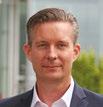
RESPONSIBLE FOR PUBLICATION: Marketing & Communication
WE WOULD WELCOME YOUR FEEDBACK.
Christian FaßeltHead of Marketing, Communication & ESG Group
Phone: +49 (0)391 2568-392
christian.fasselt@GETEC.de
EDITING AND DESIGN: Content Refinery / vorm.berlin
PHOTOS:
Photographer MD: Patrick Desbrosses, photographer IT: Guido de Bortoli (Getty Images), Manuel Stahlhammar (3D infographic), Fischbeker Reethen (IBA Hamburg), The Energy Suppliers: GETEC
CONTACT:
Phone: +49 (0)391 2568-100
Fax: +49 (0)391 2568-120
Email: info@GETEC.de
